






























On Election Day, I asked someone around noontime who they thought would win the presidential election.
“Trump,” they answered emphatically.
“Really?” I asked. “Why do you think he will win?”
She told me that all her friends are Hispanic, and for those who are able to vote, they are all voting for Trump. I was surprised. I thought that these voters wouldn’t want Trump, an anti-illegal immigration candidate, to win the White House.
This woman explained, “They are voting for him because of conservative values.”
On Tuesday night, the map of the nation turning red was an indicator that all is not lost with America. You see, we live in New York, in a deeply blue state, where symbols of the woke culture seem to take over city streets. There are parades and laws that highlight and herald the woke ideology. For me, an Orthodox Jew, when I see these things, I worry for the future of my family. Is this what my children have to see and hear when they walk down city streets? How strong do we have to be to go against this overwhelming tide of immorality and confusion!
But on Tuesday, I was heartened to see that most of America does not agree with woke culture. In fact, it is the woke culture that made many people in the United States hold their noses and vote for Donald Trump, a person whose party represents a more conservative, moral movement. The Republican Party is not afraid to mention G-d, to support
Israel, to be firm in their conviction that marriage and family is the basis of a stable society.
So much of the woke culture is about trying to delude people into questioning their morals and beliefs. If there was a word to describe woke culture, it would be “gaslighting.” They want you to doubt your reality. You thought that there are men and women in society? Wrong, everyone gets to choose. You thought that a person should be hired to do a job because they’re qualified? Wrong, it depends on their race. You thought that people should be rewarded for their hard work? Wrong, people should be rewarded for their victimhood. You thought that terrorists should be hunted down for perpetrating evil? Wrong, “freedom fighters” should be lauded as heroes.
But America is fighting back. In last week’s election, Americans soundly voted against the woke culture. They came out en masse to fight back for their morals, to bring back the values that America was founded on: G-d, family, country. It was heartening and eye-opening to see the strong support for conservative principles and ideals.
I hope that we can continue to fight back against this culture that has tried to overturn society. Now, it seems like there are more people standing strong than we had originally thought.
Wishing you a wonderful week, Shoshana

Yitzy Halpern, PUBLISHER publisher@fivetownsjewishhome.com
Yosef Feinerman, MANAGING EDITOR ads@fivetownsjewishhome.com
Shoshana Soroka, EDITOR editor@fivetownsjewishhome.com
Nate Davis
Editorial Assistant
Nechama Wein
Copy Editor
Rachel Bergida Shana Brecher
Lani White
Design & Production
Gabe Solomon Distribution & Logistics
P.O. BOX 266
Lawrence, NY 11559
Phone | 516-734-0858
Fax | 516-734-0857
Classified Deadline: Monday 5:00PM classifieds@fivetownsjewishhome.com text 443-929-4003
PAYMENT VIA CREDIT CARD MUST BE SUBMITTED ALONG WITH CLASSIFIED ADS
The Jewish Home is an independent weekly magazine. Opinions expressed by writers are not necessarily the opinions of the publisher or editor. The Jewish Home is not responsible for typographical errors, or for the kashrus of any product or business advertised within. The Jewish Home contains words of Torah. Please treat accordingly.











Dear Editor,
I read your letter to the Navidaters about the woman who was expecting to pick up an invitation for a yom tov meal in shul.
I had so many thoughts about this that I don’t even know where to start.
You accused the women of being “clique.” Simchas Torah especially is a yom tov that is very kid-oriented. Dealing with children who are running around, wanting to dance, on sugar highs, etc. is not necessarily the time one can notice others.
You think you should be invited to others’ homes. Well, guess what? I can think of over 100 reasons why someone might not want any company, especially over yom tov. Some reasons may be, but not limited to: elderly parents who cannot handle more people, a husband/ sons/ other company who do not want new women at the table, shalom bayis issues, an OTD child, a special needs child, etc. etc. etc. YOU may not care, but maybe I care and I am not interested in sharing my Family Laundry? Also, I assume you consider yourself to be discreet, but I don’t know that about you. So maybe I have good reason not to invite you.
Many single women are put off by random invitations; they’re not lonely waifs. They have lives just like me! So maybe, since I don’t know you, I will make sure to treat you respectfully.
And finally, if you’ve reached this point in your life, you’re an adult. Part of “adulting” is taking responsibility for your own arrangements and not making yourself into a victim. No one else is responsible for your meals.
Please don’t take this as a personal
response. I’m sure you’re a lovely person, and I’d love to get to know you! Coffee one day sounds great, Laya
Dear Editor,
Bravo to Jonathan Tobin on his comments regarding Senator Charles Schumer, and as to the hypocrite, phony and liar that he is!
Finally, someone with the courage to denounce Schumer for his failure to support Israel and Jewish Americans as well those in Israel who fell victim to the horrors of October 7.
It pains me to refer to a United States Senator, let alone one of our faith, who lacks the basic dignity to speak out against the murderers of innocents who sadly can no longer speak at all and those still held captive.
He hasn’t the capacity to speak out against the antisemites in our Congress, because he’s a feckless weakling, unworthy to serve all Americans.
By not doing so, the AOC, Omar, Thalib, Pressley squad leaders are encouraged to call for the Democrat Party to continue its animus against Israel.
Schumer’s only aim is to stay in our Senate for a long as possible, feeding off the largess of those New Yorkers who foolishly continue to vote for him. My hope is that a majority of us will soon wise up and find someone worthy of Jewish and all voters’ support. Someone we can all be proud to call our senator!
Respectfully,
Mort Grossman Plainview, NY
Continued on page 12


Continued from page 10
Dear Editor,
On election night, I attended an election party in someone’s home, where Trump hats were worn, hoping for his re-election.
The next day, when we found out the results, they raised enough money for a Shabbos kiddush in their shul.
The reason?
Trump won.
A kiddush is a time to honor and remember someone or occasions, personally, not a public figure. Furthermore, I was annoyed that these people were trusting Trump, rather than just trusting in Hashem.
A Reader
Dear Editor,
This week, Prime Minister Netanyahu announced that he was replacing Yoav Gallant, Defense Minister, with Israel Katz stating that “unfortunately, over the past months, the trust between me and the Minister of Defense has been broken. There were significant gaps regarding the management of the campaign and these gaps were accompanied by statements and actions that contradicted the decisions of the government.”
Specifically, these differences include the war aim of the eradication of Hamas leadership in Gaza and the role of Israel in Gaza once the war ended. Gallant had made it clear that Jerusalem should commit to Palestinian control over the Gaza Strip post-war which was part of the Biden-Harris agenda. Others, such as Defense Forces Chief of Staff Lt. General Herzi Halevi and additional senior security officials, are also on the “removal list” of those who Caroline Glick, Jerusalem Post’s Senior Contributing Columnist, have stated must answer for how unprepared Israel was for the October 7, 2023 attack.
For those Jews who do not see the connection between U.S. and Israel politics, the announcement of Gallant’s termination was made on Tuesday, the day the 45th President was elected to be the 47th President-elect Trump has a worldview of no wars, but rather economic agreements that help all countries involved. He wants this Middle East war wrapped up before his inauguration, and some say has green-lighted the Israeli bombing of Iranian oil fields as a means of spurring regime change by knocking out Iran’s monetary source. Furthermore, President Trump also wants to have Saudi Arabia and Israel sign the Abraham Accords which currently the Saudis can’t do because of the Palestinian issue which is not yet fully resolved. If Israel is able to
degrade Iran’s oil production resulting in depletion of Iran’s money supply by which they supported their major Middle East proxies, (Hezbollah, Hamas, and Houthis), then Saudia Arabia will be able to sign the Accords.
Jan Henock Woodmere, NY
Dear Editor,
Our Father was a 21-year Career Chaplain and Colonel in the United States Army. Throughout his Army service, and during his difficult and challenging year in Vietnam, he was a lifeline to thousands of soldiers. The soldiers’ well-being was helped spiritually, emotionally and physically. He was a Beacon of Light, in their darkest times. He had emunah and bitachon and always felt that Hashem was constantly with him, protecting and guiding him. Our father’s goal was always for the “greater good.”
Although he had possessed tireless devotion and dedication to his soldiers and Army families, we, as his family, always felt his warmth and deep love for us. We are so grateful to Hashem to have had the zechus of calling him Dad. We thank him for all his life’s Lessons. In our hearts and thoughts, our Hero, on Veterans Day and always.
Esther Mochan
Long Island, NY
Dear Editor,
I noticed something interesting recently, a nuance upon which I’d like to shine a bright light. Men apply to Aim Hire and request our assistance with job placement, daily. They apply after they’ve reached out and exhausted their network to see if anyone among their shul, yeshiva and previous coworkers has a lead. They ask their network for loans which they fully intend to pay back as soon as they’re working, and they hustle through their network to see if anyone knows someone who can help them and their families.
Conversely, the women come to us first. Many have a long gap in their work history where they took off time to raise their children, and none of them have a network to lean on in any significant way. Recently, a woman applied to Aim Hire and said, “I don’t have any work references.”
In a world where most families require two incomes to make ends meet, creating professional networks for the working women in our community is more important than ever!
Esther Miller
Executive Director Aim Hire, Employment with Dignity





After a soccer match between Israel’s Maccabi Tel Aviv club and Europa League’s Ajax in Amsterdam, a Muslim-orchestrated pogrom broke out against Israeli tourists.
Ten Israelis were injured in the madness, which was carried out on Thursday and Friday by swarming hordes of masked pro-Palestinian rioters, who went on an antisemitic rampage, harassing and assaulting Jews visiting the Netherlands for the game, all the while screaming proHamas chants such as, “From the River to the Sea” and “Free Palestine.”
Attackers waited on street corners in the vicinity, ambushing Israelis who were passing by. They hit them and beat them. Some people were run over by cars. Five Israelis went to the hospital, according to local police officials. All patients were discharged by the afternoon.
Early Friday morning, in the wake of the attack, Israel’s Foreign Ministry warned all Israeli tourists in Amsterdam to stay in their hotels, forcing hundreds to barricade themselves in their rooms in fear of the assailants lurking outside. The ministry, at 9 a.m., notified tourists that it was safe to go to the airports, warning the Israelis, however, against showing Israeli or Jewish symbols while traveling.
Notably, law enforcement was nowhere to be seen as the pogrom went on through Thursday night into Friday, although many incidents were reported. As the morning arrived, police began apprehending suspected assailants and detained 62 people, putting an end to the violence. Many of those who were arrested were promptly released.
“In several places in the city, [Maccabi] supporters were attacked. The police had to intervene several times, protect Israeli supporters, and escort them to hotels. Despite the massive police pres-
ence in the city, Israeli supporters have been injured,” Amsterdam police said. “This outburst of violence toward Israeli supporters is unacceptable and cannot be defended in any way. There is no excuse for the antisemitic behavior exhibited last night by rioters who actively sought out Israeli supporters to attack and assault them.”
In the wake of the attacks, Gideon Sa’ar, Israel’s newly appointed Israeli foreign minister, went to Amsterdam.
Two Israelis who traveled to London after the attack said masked Arab gangs hunted them down and attacked them.
Another Israeli, who also went to London, reported that his attackers, a group of 8-10 people, forced him to the ground, punched him in the head, and broke two of his teeth after interrogating him about whether he was Israeli. He “woke up in an ambulance covered in blood” and said he was found lying in a pool of his own blood. Some Israeli passports were stolen.
Dick Schoof, the prime minister of the Netherlands, condemned the antisemitic attacks as “unacceptable” and “terrible,” and vowed to the public and to Israeli Prime Minister Benjamin Netanyahu to track down and prosecute the perpetrators.
“I am deeply ashamed that it could happen in the Netherlands in 2024,” Schoof said.
The Jewish state blamed Dutch authorities for failing to protect the tourists and urged Israelis to leave the Netherlands at the first available opportunity. At first, Israel planned to bring its citizens home via military cargo planes but discarded the idea. Netanyahu called on Schoof and local authorities “to act decisively and swiftly against the rioters, and to ensure the wellbeing of our citizens” and thanked the Danish premier for his swift condemnation of the pogrom.
One Israeli victim called the attacks “Kristallnacht 2.” Another noted that the attacks seemed to have been planned.
Others denounced the attacks, including U.S. Ambassador Deborah Lipstadt, right-wing Dutch politician Geert Wilders, and Israel’s U.N. Ambassador Danny Danon.
“We woke up this morning to shocking images and videos that since October 7, we had hoped never to see again: an antisemitic pogrom,” posted Israeli President Isaac Herzog, adding that he hopes authorities “will act immediately and take all necessary measures to protect, locate, and rescue all Israelis and Jews under attack, and to eradicate the violence against Jewish and Israeli citizens by all required means.”

Less than 1% of Amsterdam’s population is Jewish, while around 15% is Muslim, mostly second and first generation immigrants from North Africa and the Middle East.
Seventy-five percent of Dutch Jews were killed in the Holocaust.

For decades, Salman Rushdie’s “The Satanic Verses” was banned in India. Now, the ban may be overturned – not because of a change of heart but because essential paperwork that put the ban in place may be missing.
Last week, a court in New Delhi closed proceedings on a petition filed five years ago that challenged the then-government’s decision to ban the import of the novel just days after its 1988 publication.
The book has enraged Muslims worldwide because of its alleged blasphemy.
In a ruling issued Tuesday, a bench headed by Justice Rekha Palli said authorities had failed to produce the notification of the ban.
“We have no other option except to presume that no such notification exists,” the judges concluded.
The petitioner, Sandipan Khan, had argued that he couldn’t buy the book because of a notification issued by the Central Board of Indirect Taxes and Customs on Oct. 5, 1988, which forbade its import into India. Khan said that he had been unable to locate the notification on any official website or through officials.
Khan’s lawyer, Uddyam Mukherjee, said that the court’s ruling meant that as of now, nothing prohibits anybody from importing the novel into India.
“But whether this means it will be sold in bookstores — I don’t know, that depends on the publishers or sellers,” he added.
“What the ruling does is open up a potential path for the book to become available here,” Mukherjee said, but added that any aggrieved individual, group or the government can also appeal against it.
Rushdie is from India but is now a citizen of the United Kingdom and the

United States.
Rushdie’s publisher in India, Penguin Random House India, issued a statement Friday called the ruling a “significant new development” and adding that it was “thinking through next steps.”
Rushdie was born in India but left as a child. He published his breakout novel in 1981; the book infuriated India’s prime minister at the time, Indira Gandhi, who was satirized in the book. After she sued over a reference to her having caused her husband’s death, Rushdie agreed to remove it and the case was settled.
When India banned “The Satanic Verses,” Rushdie condemned the action and doubted whether his censors had even read the novel. In an open letter to then-Prime Minister Rajiv Gandhi, published in The New York Times in 1988, he alleged the book was “being used as a political football” and called the ban not only “anti-democratic, but opportunistic.”
“The Satanic Verses” elicited a fatwa calling for Rushdie’s death from Iran’s Ayotollah Ruhollah Khomeini, forcing the author into hiding in 1989. He gradually resumed a normal life, especially after Iranian officials announced in 1998 that the government had no plans to enforce it. But his relative calm abruptly ended in 2022, when he was stabbed repeatedly onstage by a young assailant during a literary festival in western New York. Rushdie survived the attack, which left him blind in one eye, and wrote about it in the memoir “Knife.”

A Spirit Airlines plane flying from Fort Lauderdale, Florida, to Haiti was struck by gunfire while attempting to land in Port-au-Prince, Haiti, this week.
The Spirit Airlines plane “diverted and landed safely in Santiago, Dominican Republic,” Spirit Airlines said in a statement on Monday.
No passengers were injured, although one flight attendant onboard the plane reported unspecified “minor injuries.”
The plane came within 550 feet of the
runway before aborting its landing and diverting to the Dominican Republic.”
Another plane was used to bring the passengers back to Fort Lauderdale.
Two other flights headed for Toussaint Louverture Airport were also diverted “as a precaution,” the FAA said in its statement, adding that the airport was now closed. All airlines have temporarily suspended flights to the airport.
On Monday, a JetBlue flight from Haiti to New York City was also hit by a bullet. After the plane landed at JFK Airport, inspections revealed that the plane had been hit by a bullet. As such, JetBlue said it is suspending all flights to and from Haiti through December 2 due to the civil unrest in the country.
The U.S. Embassy in Haiti issued a security alert saying that it was “aware of gang-led efforts to block travel to and from Port-au-Prince which may include armed violence, and disruptions to roads, ports, and airports.”
“The security situation in Haiti is unpredictable and dangerous,” the embassy alert continued, further noting that “the U.S. government cannot guarantee your safety traveling to airports, borders, or during any onward travel. You should consider your personal security situation before traveling anywhere in Haiti.”

Despite leading his party to big losses in a snap general election last month, Shigeru Ishiba, the prime minister of Japan, won a vote in parliament on Monday to carry on as the country’s leader.
Ishiba, whose Liberal Democratic Party lost its parliamentary majority for the first time in 15 years, will effectively lead a minority government.
The result puts Ishiba in a precarious position as his government continues to deal with the aftermath of a political finance scandal, along with inflation, labor shortages and the increasing burdens of an aging population. Analysts said Ishiba could struggle to survive in the long term, putting Japan at risk of returning to a revolving door of prime ministers just as it



prepares to grapple with unpredictability in the United States, its most important international ally, following the reelection of Donald Trump as president.
In a runoff election with the leader of the Constitutional Democratic Party, Japan’s largest opposition group, Ishiba defeated Yoshihiko Noda, a former prime minister, 221-160. Ishiba was elected prime minister in September.
With nearly 1 in 5 members of the lower house declining to cast a vote for either candidate in the runoff, Ishiba has a fragile hold on power.
At a news briefing late Monday evening, Ishiba said the minority government “may be desirable for democracy,” as the various parties would have to consult more closely.
The prime minister also vowed to revise political finance laws in Japan to increase transparency and supervision.
A scandal ruffled the election Monday after a tabloid magazine reported on a rumor about Yuichiro Tamaki, leader of the Democratic Party for the People, which analysts speculated might join the Liberal Democrats in a coalition government.
The revelations seemed to have little effect on his performance in the leadership election, in which all members of his party voted for him as prime minister in
the lower house during a first round of voting. (© The New York Times)

On Saturday, at least 25 people were killed at a train station in southwestern Pakistan in a suicide bombing perpetrated by a separatist militant group in the region.
Another 53 people were injured in the attack in the city of Quetta, Commissioner Hamza Shafqaat said in a statement.
The blast took place on a platform at the city’s main railway station at about 9 a.m., Senior Police Superintendent Muhammad Baloch said.
The Baloch Liberation Army (BLA), a militant group active in the region, claimed responsibility for the attack.
“The explosion happened when a large number of passengers were present on the platform,” Baloch said.
In a statement, Prime Minister Shehbaz Sharif strongly condemned the attack.
An insurgency in Balochistan has been running for decades but has gained traction in recent years since the province’s deep-water Gwadar port was leased to China, the jewel in the crown of Beijing’s “Belt and Road” infrastructure push in Pakistan.
The BLA has been responsible for the deadliest attacks in Pakistan this year, most recently in October when it targeted a convoy of Chinese engineers and investors in the city of Karachi, leaving two Chinese citizens dead.
Mauritius Prime Minister Pravind Jugnauth conceded the premiership following his L’Alliance Lepep coalition’s “huge defeat” in the parliamentary elections on Sunday.
Jugnauth, 62, hoped to secure a second term, which would keep him in pow-
er for the next five years. However, Navin Ramgoolam, a 77-year-old doctor and twice-elected former prime minister, is now poised to succeed Jugnauth following the parliamentary victory of Ramgoolan’s coalition, Alliance of Change.

Though results are still preliminary, both sides have acknowledged the expected outcome of the election.
“The population has decided to choose another team,” Jugnauth said. “We must respect this choice...and we wish the country and the population good luck.”
Although it ranks as one of the most stable democracies in Africa, Mauritius grappled with a phone-tapping scandal before the election, where private recordings of public officials were leaked on social media. The issue prompted the government to ban social media until after the election. However, the ban was quickly revoked following a public outcry.


The ruling party is believed to have lost due to widespread dissatisfaction with the government, including in its handling of the economy. Many voters were upset about the rising cost of living and controversies about government corruption.
While campaigning, Ramgoolam, the son of one of the African island’s prominent heroes, vowed to increase pensions, make the internet and transportation free, and lower the cost of fuel.
The election commission said that voter turnout was around 80%.
Just last month, the United Kingdom said it would give Mauritius control of the Chagos Islands.
Mauritius is an island country in the Indian Ocean off of Africa. It is the only country in Africa where Hinduism is the most practiced religion. Most people who live there speak English or French.
“If you agree today to be appointed defense minister, the second most important position in this country, just to pass the draft-dodging law — that’s not the way you want to be remembered,” said Opposition Leader Yair Lapid. “They’ll say it was a stunt by Netanyahu, not because anyone believed in him, but to pass the draft-dodging law… If the day after this appointment you stand up and say, ‘I will not pass draft-dodging laws, my job is not to pass laws that allocate money to people who dodged military service during wartime,’ you will be remembered in history as someone who stood their ground.”
Lapid, in a speech addressed to Katz, added: “Netanyahu has no way of firing you; he can’t fire two defense ministers during a war… And they’ll say about you, ‘Here’s someone with a backbone.’ Just do the right thing and tell yourself, ‘I am the defense minister of the State of Israel, not of Netanyahu.’”
The Democrats Party’s MK Gilad Kariv also condemned Netanyahu, sarcastically suggesting that the title of defense minister should be changed to “minister for coalition defense” or “minister for defense for draft-dodgers.”

A day before the United States presidential election, Prime Minister Benjamin Netanyahu fired then-Defense Minister Yoav Gallant. Gallant’s successor, Israel Katz, was approved by the Knesset on Thursday night in a 58-0 vote, with opposition members walking out in protest of the appointment.
A member of Likud, Katz, who was Israel’s foreign minister until his appointment to defense minister, was replaced by Gideon Sa’ar, a member of New Hope, as the foreign minister.
Before the vote, several opposition members slammed Netanyahu in passionate speeches, claiming that the premier’s firing of Gallant was politically motivated, as the then-defense minister opposed legislation that would help charedi males to avoid the draft and advocated for a hostage-ceasefire deal in Israel’s war against Hamas.
the Jewish state and the Gazan terrorist organization both repeatedly reneging on past agreements, the diplomat claimed. The diplomat added that Qatar would be willing to return to its role if Israel and Hamas showed a serious desire to reach a deal.
The diplomat and the U.S. government have also confirmed that Qatar will be kicking Hamas out of the country and closing the terror group’s Doha office. The Middle Eastern country reportedly told Hamas officials to start packing late last month and notified the United States and Egypt on October 28 that it would be stepping away from mediating the conflict.

Kariv also questioned Sa’ar, asking whether the Netanyahu-critic-turned-supporter planned on supporting a hostage release deal or if he would align “with the prime minister’s policy of continuing to abandon” the hostages.
“The defense minister who is leaving today undermined the prime minister and the cabinet every step of the way. He knew what awaited us in Hezbollah’s tunnels and wanted us to sign a surrender agreement before entering Lebanon,” said Communications Minister Shlomo Karhi, defending the prime minister’s decision.
In response to Gallant’s dismissal, protesters numbered in the thousands took to the streets. On Thursday, the High Court of Justice defended Netanyahu’s legal right to fire Gallant, dismissing petitions to overturn the premier’s decision.
According to a foreign diplomat, Qatar will stop serving as a mediator for a potential ceasefire and hostage talks between Israel and Hamas.
The decision was made by the Arab country because it believes that, for both parties, the talks “became more about politics and elections” and less about a “serious attempt to secure peace,” with
Egypt is expected to continue working to broker a ceasefire deal between Israel and Hamas.

After October 7, when Hamas terrorists invaded southern Israel murdering more than 1,200 Israelis, kidnapping 251 people – 101 of whom are still in captivity – and maiming thousands more, around 300,000 reservists reported for duty to fight in the war in Gaza.
When Hamas will officially leave Qatar is unclear, though it will likely take a while, according to the diplomat. The decision to kick Hamas out of Qatar was praised by an Israeli official who works in the office of Prime Minister Benjamin. The official claimed that Qatar made the decision in response to the U.S. presidential election, which Donald Trump won, adding that the former and now-future president would not be okay with Qatar hosting the terror group.
The announcement was made right after President Donald Trump won the presidency in the United States.
Qatar, however, has called “media reports” on Hamas’ exit “inaccurate” without clarifying further.
According to a U.S. official, two weeks ago, the United States requested that the Arab country throw Hamas out, to which Qatar agreed. Until now, the U.S. has resisted asking Doha to kick the terror group out, since Qatar played an important role in mediating the ongoing conflict.
However, after Hamas executed five hostages, including U.S.-Israeli citizen Hersh Goldberg-Polin, the Biden administration told Qatar that it was “no longer viable or acceptable” for Doha to host Hamas. Along with that policy shift, the United States also indicted several Hamas members, some of whom live in the Qatari capital. The Biden administration hopes to reach a hostage agreement before President Joe Biden leaves office and thinks that, given enough pressure from sanctions and the terror group’s removal from Qatar, Hamas may be more willing to make necessary concessions.
In the war’s early days, when Israel launched the biggest reservist call-up in the Jewish state’s history, 100% of reservists showed up, according to the IDF, with some units seeing a reservist response rate of up to 150%.
However, the military has, in recent weeks, observed a steep decrease in the reservist response rate. Now, only 75% to 85% of people called up to fight in Gaza or Lebanon actually show up. The IDF’s senior officials believe the decline can be blamed on reservist burnout, as the conscripts bear the brunt of a war that has been going on for over a year. Reservists have lost jobs and academic opportunities and have been away from their loved ones for a long time.
Now, the IDF hopes to get 10,000 new soldiers and extend the required military service time in order to relieve reservists from drawn-out duty. Many of the reservists have fought for most of the war and, next year, will likely need to return for another 100 days of service.



The slain troops were named as Staff Sgt. Orr Katz, 20, from Ma’ale Adumim; Staff Sgt. Nave Yair Asulin, 21, from Carmit; Staff Sgt. Gary Lalhruaikima Zolat, 21, from Afula; and Staff Sgt. Ofir Eliyahu, 20, from Holon.
The soldiers all served with the Kfir Brigade’s Shimshon Battalion. They had been hit by an anti-tank missile fired into a building they were in, in the far north of the Strip.
The Kfir Brigade has been operating in the Beit Lahiya area, close to Jabalia, amid an ongoing operation against Hamas in northern Gaza.
On Monday, another soldier, Maj. (res.) Itamar Levin Fridman, 34, was killed in a separate incident of anti-tank fire in Jabalia.
Their deaths brought Israel’s toll in the ground offensive against Hamas in Gaza and during military operations along the border with the Strip to 375. The number includes a police officer killed in a hostage rescue mission and a Defense Ministry contractor.
The IDF’s offensive in Jabalia began in early October, the fourth push into the northern Gaza refugee camp since the start of the war a year ago. The military has said that this operation will finally break Hamas’s forces in Jabalia, which it has called the “most significant center of gravity” for the terror group in northern Gaza.
Hundreds of Palestinians are still in Jabalia, as Hamas is forcing them to stay to use them as human shields. Still, the population has largely moved to Gaza City, with only a few dozen crossing the IDF’s Netzarim Corridor and heading to the Israeli-designated humanitarian zone in the Strip’s south.
Several thousand Palestinians also remain in Beit Lahiya, Beit Hanoun, and other northern Gaza towns, where the military is also operating against Hamas as part of the ongoing offensive.
The army said it has eliminated over 1,000 Hamas operatives in the renewed Jabalia offensive, with more than 1,000 operatives taken into custody.
Jablon Simatov was the last known Jew living in Afghanistan. Last week, he finally reached Israel, traveling from Turkey and surprising his family.
“My younger brother called me on Thursday around 9-10 p.m. and said,
‘Congratulations, your brother is in Israel,’” recounted Benjamin, Simantov’s brother, to Walla. “I couldn’t believe what I was hearing. By Saturday night, we were already on our way to see him at the place where he’s staying in southern Israel.”
Jablon was rescued from Afghanistan three years with the help of the Jewish Agency and Moti Kahana, a person known for rescuing people from conflict zones.
“We haven’t seen each other for almost 25 years. Now, he’s living here in Israel. He wants to move to central Israel, and no matter what, we will be by his side,” Simantov’s brother said. “We will be with him on Shabbat as well. He promised us he would come to Israel, and it has finally happened.”

Jablon, 65, speaks very little Hebrew. He is fluent in Persian.
“It wasn’t easy to get him out of Afghanistan. Rabbis approached me, asking to help rescue the last Jew from there,” Kahana told Walla. “They had seen my past work, evacuating Jews from Yemen and Syria, and asked me to do a favor and help get Jablon out. There were also various bureaucratic obstacles along the way.”
One of the challenges Kahana had was arranging a divorce for Simantov’s wife, who had left the country in the 1990s.
“I sent my team to pick him up, but he didn’t want to leave Afghanistan,” Kahana recalled.
“When we went to pick him up, he had gathered about 100 people who also wanted to leave. He insisted that either everyone goes or no one does. In the end, we took 30 people and reached the border of a neighboring country. We had to cross a river, but he refused to go until all the families had crossed first. There was a lot of pressure until we reached Turkey, where everyone wanted to make sure he was safe. He’s been in Turkey for three years, and this week, he spent his first Shabbat in Israel,” Kahana said.
Kahana added, “It took a bit of time, but this week, I plan to take him on a tour of the Western Wall in Jerusalem, just like I do with all my rescues. I’m already working on the next challenge — evacuating one Jew from Yemen and rescuing hostages from Gaza.”


Tom Homan, former acting head of the U.S. Immigration and Customs Enforcement agency, will be in charge of the border when President-elect Donald Trump comes into office on January 20.
“I’ve known Tom for a long time, and there is nobody better at policing and controlling our Borders,” Trump said in a social media post on Sunday. “Likewise, Tom Homan will be in charge of all Deportation of Illegal Aliens back to their Country of Origin.”
Homan was the public face of Trump’s
“zero tolerance” immigration policies during his first term, which broke with the practice of keeping families together during detention and deportation proceedings.
“I don’t care what people think about me. Especially on the left,” Homan said on Fox and Friends on Monday morning. “Border security is national security. We should all be on the same side of that.”
Homan also had a warning for local law enforcement, especially in sanctuary cities: “If you’re not gonna help us, get the [heck] out of the way.”
He added, “We’re gonna do the job, without you or with you.”
Homan brings experience to the position.
“I know exactly what I’m doing, and this is the second time I’ve come out of retirement for this president, because it matters. I was a Border Patrol agent, I wore that uniform, and I’m proud that I wore that uniform. I was an ICE agent. I was the first ICE director that came up through the ranks, so the 20,000 men and women that worked for me, I didn’t ask them to do anything I wouldn’t do myself, because I was one of them,” he said.
On Monday, he also took a swipe at Kamala Harris, who had been in charge of the border during the Biden administra-

tion without success. Illegal border crossings surged under the Biden administration, with nearly 3 million in fiscal year 2024, according to Homeland Security’s website. There have been more than 10.8 million illegal encounters since FY 2021.
“I’m gonna look like a genius. Because if you follow failure, you can’t help but succeed,” Homan said.

This week, President-elect Donald Trump announced several nominations of those he wants on his team when he comes into the White House on January 20.
Former Rep. Lee Zeldin of New York was chosen to run the Environmental Protection Agency.
“I am pleased to announce that the highly respected former congressman from New York, Lee Zeldin, will be appointed to serve as the administrator of the U.S. Environmental Protection Agency,” Trump announced on Monday.
“He will ensure fair and swift deregulatory decisions that will be enacted in a way to unleash the power of American businesses, while at the same time maintaining the highest environmental standards, including the cleanest air and water, on the planet,” Trump added in a statement.
Zeldin, 44, wrote on X, “It is an honor to join President Trump’s Cabinet as EPA administrator.”
He added, “We will restore U.S. energy dominance, revitalize our auto industry to bring back American jobs and make the United States the global leader of artificial intelligence. We will do so while protecting access to clean air and water.”
Zeldin served in active duty in the U.S. Army and deployed to Iraq in 2006. He served in Congress between 2015 and 2023 and did not seek re-election in 2022 to challenge New York Gov. Kathy Hochul (D) in a race he lost by just 6 percentage points in the deeply blue state.
While in Congress, Zeldin served on the House Foreign Affairs and Financial Services committees. He also served on Trump’s legal team during the former president’s first failed impeachment in 2019.
Rep. Elise Stefanik, also from New York, was chosen by Trump to serve as his ambassador to the United Nations.
“Elise is an incredibly strong, tough, and smart America First fighter,” Trump said in a statement this week announcing his pick for the role — his first selection that will require Senate confirmation.
Stefanik, 40, who serves as House Republican Conference Chair, has long been one of Trump’s most loyal allies in the House and was among those discussed as a potential vice presidential choice.
Stefanik will succeed U.S. Ambassador Linda Thomas-Greenfield, a career diplomat and former assistant secretary of state for Africa who has held the job through the entire Biden administration and has been a member of his Cabinet. Stefanik also will be a member of Trump’s Cabinet.
Born and raised in upstate New York, Stefanik graduated from Harvard and worked in former President George W. Bush’s White House on the domestic policy council and in the chief of staff’s office. In 2014, at 30, she became the youngest woman ever elected to Congress, representing upstate New York. She later became the youngest woman to serve in House leadership.
Stefanik’s profile came into the spotlight this year when she questioned three university presidents over antisemitism on their campuses, leading two of them to resign.

Rep. Mike Waltz, a Florida Republican and retired Special Forces officer, was asked to be Trump’s national security advisor.
Waltz, 50, had widely been seen as a contender for a senior national security position in the new Trump administration. He had been a vocal critic of Biden’s foreign policy, critiquing him on his policies with regard to China, Afghanistan, Ukraine and NATO.
The president’s national security advisor is a senior presidential aide who coordinates national security policy across the U.S. government, working


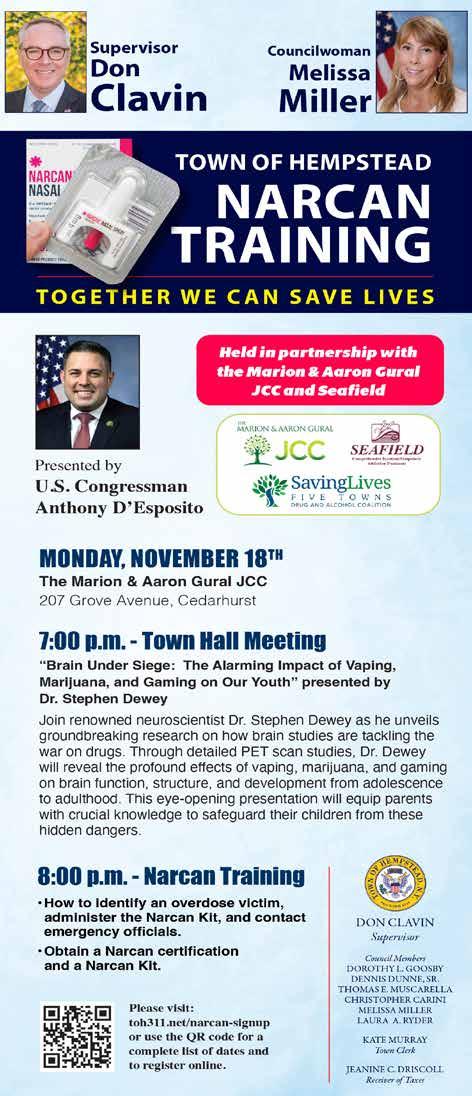
with senior leaders in multiple agencies to do so. While the position is not in the president’s Cabinet and does not require Senate confirmation, it often comes with significant power.
Waltz also has been a strong supporter of Israel. He has questioned why the Biden administration has attempted to rein in Israeli military operations and not hit back more forcefully when Iran and other proxy forces tied to the war in Gaza have attacked U.S. troops in the region.
Waltz is an Afghanistan war veteran. As such, he has much to say about Biden’s dismal withdrawal from Afghanistan. During a House Foreign Affairs Committee hearing in March, he detailed how assumptions and promises the Biden administration made about Afghanistan fell apart.
“We failed — and their loved ones are dead because of it,” Waltz said, pointing to the families of some of the 13 U.S. troops killed in a suicide bombing at Kabul airport during the evacuation.

Following his decisive victory in the 2024 presidential election, President-elect Donald Trump selected Susie Wiles as his White House chief of staff.
Wiles, Trump’s campaign manager, has been widely credited with helping the former and now-future president handily beat Democratic candidate Vice President Kamala Harris in the 2024 election.
“Susie Wiles just helped me achieve one of the greatest political victories in American history and was an integral part of both my 2016 and 2020 successful campaigns,” Trump stated. “Susie is tough, smart, innovative, and is universally admired and respected. Susie will continue to work tirelessly to Make America Great Again. It is a well-deserved honor to have Susie as the first-ever female Chief of Staff in United States history. I have no doubt that she will make our country proud.”
At first, Wiles, 67, was hesitant to accept the position but acquiesced after Trump agreed to a list of conditions, according to reports. One of the conditions
that the president-elect reportedly agreed to: “The clown car can’t come into the White House at will,” which is in reference to the large, uncontrolled herd of friends, relatives, unofficial advisors, and others who Trump’s former chiefs of staff have previously struggled to keep at bay.
As part of her role as campaign manager, Wiles managed Trump’s private plane flight manifest, intentionally distancing him from, for example, extreme individuals who would have hurt his campaign.
Another contender for the position was Brooke Rollins, who played a part in the former president’s first term and is expected to be involved in his second one. Rollins, however, ceded the role on Wednesday in order to avoid a serious power struggle with Wiles, who was clearly Trump’s top pick for the job.
A political expert from Florida, Wiles is one of Trump’s longest-serving advisors and is the daughter of the late Pat Summerall, an NFL broadcaster. She was Trump’s only campaign manager for the 2024 election, bringing a level of discipline to the former president’s campaign that’s rarely been seen in Trump’s past campaigns.
During his victory speech, Trump credited Wiles for the win. He offered her a chance to speak to the audience, but she politely declined.
“Susie Wiles ran Trump’s best campaign of the three, and it wasn’t particularly close,” posted Charlie Kirk, the CEO of Turning Point USA. “She’s disciplined, she’s smart, and she doesn’t seek the limelight. She would make an incredible Chief of Staff. The president, and America, would be well served with Susie in that key role.”

Southern California’s Ventura County was hit by a devastating wildfire that decimated over 192 properties and damaged 82 others, according to local fire officials. Ten people were lightly hurt, mostly from inhaling smoke, according to the county’s sheriff, Jim Fryhoff.
The fire slowed down between Thursday night and early Friday. As of Friday


evening, the fire was 14% contained after over a day with almost zero containment, Cal Fire said. By Monday, there was 42% containment.
Firefighters are fighting to take control of the rest of the fire before wind speeds increase
What caused the Mountain Fire, which started in Camarillo on early Wednesday, is currently unclear. The wildfire spread through over 20,700 acres of land, according to fire authorities.
Firefighters evacuated 400 homes, and 800 other households were already evacuated before officials had to warn them to leave. Another 250 people stayed in their homes, according to Fryhoff.
“We see it over and over and over: People have the best intentions to stay and defend their home right up until the time the fire hits their home,” said Dustin Gardner, the fire chief of Ventura County.
“And it gets hot, and it gets smoky. You can’t see, you can’t breathe, and you sure
imately 3,500 acres across parts of New York and New Jersey and was 20% contained on Monday evening.
While no civilian injuries have been reported, an 18-year-old Wildland Fire Crew member was killed while responding to the blaze over the weekend, officials said Sunday. Dariel Vasquez died Saturday afternoon when a tree fell over in the fire area. Vasquez recently graduated from Ramapo High School, where he was a member of the school’s varsity baseball team, the East Ramapo Titans.
While California is used to raging wildfires, New York has not had a fire season like this year since 2002, according to Jeremy Oldroyd, a forest ranger with the state’s Environmental Conservation Department. Nearly 600 wildfires have burned almost 7,000 acres in New Jersey and New York since October 1, according to officials.
Most of the fires were in New Jersey, where the state’s Forest Fire Service has responded to 537 wildfires. That’s nearly 500 more than the same period last year – and the flames have claimed about 4,500 acres.

Federal prosecutors in Manhattan said Friday that Iranian plotters had discussed a plan to assassinate Donald Trump before he was reelected as president last week.
One of the plotters said that he was assigned in September to carry out the plan by Iran’s Revolutionary Guard, prosecutors said in court papers.
as hell can’t defend your home. And then you’re stuck, and then our firefighters have to get in, pull you out.”
To try to control the fire, firefighters air-dropped water on the area from helicopters.
On the East Coast, firefighters were battling fires in New York and New Jersey, areas that have been dealing with a drought.
The Jennings Creek Fire on the border of the two states has scorched approx-
An Iranian operative said he was told to put aside other efforts he was undertaking on behalf of the Revolutionary Guard and “focus on surveilling, and ultimately, assassinating” Trump, according to a criminal complaint filed in Manhattan federal court.
The new allegation about a plan to kill Trump is the latest alarming development for U.S. security officials, who have been concerned since the summer that Iran appeared to be escalating plans for violence inside the United States, including against the president-elect, who has

been Tehran’s nemesis.
Iran’s Foreign Ministry denied the allegation.
In his first term as president, Trump abandoned a nuclear deal that required Iran to limit its nuclear capacity. He levied 1,500 sanctions, including on oil sales and banking, debilitating the Iranian economy. And he ordered the assassination of a military leader, Gen. Qassem Soleimani, who had been designated as a terrorist.
The newly unsealed complaint also contains allegations that authorities had disrupted another plot to assassinate Masih Alinejad, a Brooklyn human-rights activist who has long criticized Iran’s repression of women.
The man prosecutors said was tasked with the plot to kill Trump and Alinejad was Farhad Shakeri, 51. Shakeri, following a guilty plea to robbery, spent 14 years in New York state prisons, according to the complaint. Shakeri, an Afghan national who immigrated to the United States as a child, was deported in 2008 after serving his prison sentence, the complaint says.
Prosecutors said Shakeri was at large and was believed to reside in Iran.
Two men also charged in the plots were arrested and are in custody in New
York. They are Carlisle Rivera, 49, of Brooklyn, and Jonathan Loadholt, 36, of Staten Island.
The three men each face charges of murder-for-hire, conspiracy to commit murder-for-hire and money laundering conspiracy. Shakeri was also charged with providing material support to a foreign terrorist organization, identified as the Revolutionary Guard, and conspiring to do so, as well conspiracy to violate U.S. sanctions on Iran. (© The New York Times)

A new study conducted by the state health departments of Michigan and Colorado and the U.S. Centers for Disease Control and Prevention (CDC) indicates that seven percent of tested dairy farm workers – who were exposed to bird

flu-infected cows – ended up unknowingly contracting the virus.
The research, published in the CDC’s Morbidity and Mortality Weekly Report on Thursday, shows that there are many more people contracting bird flu than official counts suggest, as a large chunk of infected individuals have mild or no symptoms. The virus’ outbreak on U.S. farms started in March.
In light of the study, the CDC now recommends that all workers exposed to infected animals get tested even if they have no symptoms of bird flu. The agency also now recommends that all those who were seriously exposed to infected animals and weren’t wearing personal protective equipment (PPE), even those who have no symptoms, should be treated with Tamiflu, an antiviral medication. For example, Dr. Nirav Shah, the CDC’s principal deputy director, says that a worker whose face got splashed with raw milk from a cow with bird flu should take the medication.
In the past, the CDC suggested that only those with symptoms should be tested and treated. These new measures have been put in place to slow the spread of the virus.
“Simply put, the less room we give this virus to run, the fewer chances it has to cause harm or to change,” said Shah. “And the best way to limit the virus’s room to run is to test, identify, treat and isolate as many cases as possible in humans and as quickly as possible.”
As part of the study, 115 people were tested for antibodies. Eight came back positive, showing that they were likely previously infected with bird flu. Four of those workers remembered having symptoms, implying that the symptoms were mild, such as eye redness, conjunctivitis, fever, runny nose, sore throat, sneezing, and diarrhea.
All the study participants had cleaned areas where cows were milking. None of the infected individuals wore PPE, only one was informed that the cows had bird flu, and all of those who tested positive spoke Spanish. The CDC emphasizes that it’s important for foreign workers to be educated in their native languages.
Since the beginning of 2024, there have officially been forty-six cases of humans in the U.S. contracting H5N1, though that figure does not include the eight dairy workers in the study, as only active cases of infection are added to the official case count.
“These were farms with known infected cows,” noted Dr. Demetre Daskalakis, the director of the CDC’s National Center for Immunization and Respiratory Diseases. “So it was really about the fact that
they didn’t have the awareness that they had any sick cows that they were working with, even though they were in environments where sick cows were known.”

Last Wednesday, 43 monkeys escaped from the Alpha Genesis primate research facility in Yemassee, South Carolina. The break-out occurred after a caretaker forgot to lock the exits.
On Saturday, one monkey was recovered. On Sunday, authorities reclaimed 25 other monkeys. As of Sunday, “a sizable group remains active” close to the fence line of the research facility and had “bedded down in the trees for the night,” according to Yemasse police. The group of primates, which are young females and are from the rhesus macaques species, have since been sighted in the forest that surrounds Alpha Genesis’ facility.
The research lab is home to around 500 monkeys, which are used for research and studies.
In the meantime, officials and Alpha Genesis have been attempting to lure the monkeys in by planting food nearby.
The company has specified that the escaped monkeys are not dangerous, given that they’re very small and are too young to carry disease. Regardless, authorities have told the 2,200 people who live in Yemassee to remain indoors, keep their windows shut, call 9-11 if they spot one of the monkeys, and refrain from approaching the animals if spotted.
According to the police, the recovered monkeys are “in good health,” based on evaluations from veterinarians. The authorities also warned people against flying drones in the town, as it had recently “led to the primates becoming spooked, which not only increased their stress but also complicated efforts for their safe return.”
Nineteen monkeys fled from Alpha Genesis in 2016. Nearly six hours later, they were all recovered. In December 2014, 26 monkeys broke out of the research facilities, leading the U.S. Department of Agriculture to sue the company for $26,000 for the mistake.


estate is also being bought out by smaller chains that are interested in expanding.
The U.S. retail vacancy rate is at its lowest in decades, at 4.1%.

Vacant restaurant real estate is generally more desirable than space in malls. While many mall stores are shutting down because of online shopping, vacant restaurant real estate remains desirable because the store owners have the freedom to operate without being tied down to a mall.
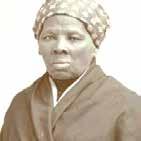
Harriet Tubman is famous for organizing the Underground Railroad for slaves looking to escape to freedom in the North from the South more than 150 years ago. This week, on Veterans Day, hundreds came out to the Blackwater National Wildlife Refuge on Maryland’s Eastern Shore to see Tubman posthumously become a one-star brigadier general in the Maryland Army National Guard.
“She walked from there to New York or Philadelphia, just using the stars and the water,” Maj. General Janeen Birckhead, the head of Maryland’s National Guard, said.
In 2024, several fast food chains, including Red Lobster and TGI Fridays, filed for bankruptcy, forcing the companies to shut down over 175 locations collectively.
Red Lobster’s previous owner, Thai Union, a global shrimp supplier, drove the chain into bankruptcy. TGI Fridays’ private equity owner, TriArtisan Capital
Advisors, was also unable to stop the casual dining chain from going bankrupt.
Another 150 restaurants are getting shut down by Denny’s.
With many fast food stores now vacant, other companies are vying for prime real estate, while landlords are looking for tenants who will pay higher rents.
Red Lobster’s Watertown, New York, location will be replaced by a Northern Credit Union bank, while a TGI Fridays restaurant in Woodbridge, Virginia, will
become a LongHorn Steakhouse. A Red Lobster location in Naples, Florida, will be replaced by a Chick-fil-A. Previously, shuttered restaurants would just become different restaurants. However, many restaurant chains are instead buying the real estate, not to start a new location but to build a new drive-thru lane. For example, most of Chipotle’s 4,000 new locations will have drive-thrus, and Chick-fil-A is constructing many new four-lane drive-thrus. Some of the real
“Today we celebrate one of the greatest authors of the American story,” said Maryland Gov. Wes Moore. “Maryland’s own, General Harriet Tubman.”
For many, she was called “Moses.”
At the start of the Civil War, Tubman was known for her talent and bravery guiding more than 70 enslaved people to freedom through the Underground Railroad. She was so good that there were rumors that she was an Ashanti sorceress who could take on the form of a leopard, according to the Army Historical Foundation.
“Tubman was not a commando or

38 a steely-eyed killer, but she was able to do what neither of those types could do: pass through enemy lines and talk to her people about the local situation,” the historical foundation wrote. “She was what intelligence analysts today would call a ‘human terrain specialist’ who knew how to work with the people to accomplish the mission.”
Her most daring raid was in June 1863, when Tubman directed three steamships up the Combahee River in South Carolina.
Because of the intelligence collected by Tubman and her knowledge of the terrain that night, more than 750 enslaved people were liberated.
“They came down every road, across every field, just as they had left their world and their cabins; women with children clinging around their necks, hanging to their dresses, running behind, all making at full speed for ‘Lincoln’s gunboats,’” wrote a reporter who interviewed Tubman for the Springfield Weekly Republican on Jan. 30, 1869.
“Eight hundred poor wretches at one time crowded the banks, with their hands extended towards their deliverers, and they were all taken off upon the gunboats, and carried down to Beaufort,” the article said.
Two years after that heroic raid, Tub-
man was appointed nurse matron at Fort Monroe’s Colored Hospital in Hampton, Virginia, and then was summoned to Florida to treat a dysentery epidemic among Union soldiers because of her talent with herbs and medicinals. She was also a skilled cook who nourished the injured with her meals.

Representative Ruben Gallego, a Phoenix-area Democrat and military veteran, won the Senate race in Arizona, it was announced on Monday. The victory is a bright spot for Democrats after Republicans regained control of the chamber.
Gallego defeated Republican Kari Lake, leading throughout the summer and the fall with large margins. The results came in unexpectedly close, a sign

of a Republican wave throughout the country.
Gallego is a five-term congressman who grew up in a working-class Chicago family. He attended Harvard University and fought in the Iraq war as a Marine. He will become Arizona’s first Latino senator, replacing Senator Kyrsten Sinema, an independent and former Democrat.
“For the kids sleeping on the floor, dreaming about a better, better America and a better, better future, this victory is for you,” Gallego said.
Gallego had announced in January 2023 that he would challenge Sinema for her seat, after she angered Democrats by voting with Republicans to stymie key pieces of President Biden’s agenda. Sinema announced this year that she would not run for re-election.
Lake is a former television anchor and a vocal ally of President-elect Trump.
Gallego, who was once known for lobbing profanities at Republicans on social media, ran a disciplined campaign. He successfully rebranded himself as an even-tempered moderate, highlighting his veteran status and pitching himself as a pragmatic legislator who would focus on lowering costs for families and championing tribal water rights.

News anchor Chris Wallace announced this week that he would be leaving CNN after being at the cable news broadcaster for more than two years.
Mark Thompson, CEO and chairman of CNN, said in a statement that Wallace is “one of the most respected political journalists in the news business with a unique track record across radio, print, broadcast television, cable television and streaming.”
Wallace, 77, announced his impending departure to The Daily Beast on Monday, sharing that he intends to take his talents to an independent streaming or podcasting platform.
Wallace, who hosts “Who’s Talking to Chris Wallace?” on Max and anchors “The Chris Wallace Show” on Saturdays for CNN, will wrap up his duties at the
broadcaster by the end of the year. The outlet reported “The Chris Wallace Show” will end next month, and Friday’s episode of “Who’s Talking” will be its last.
The former “Fox News Sunday” anchor made waves in 2021 when he announced he would be leaving Fox News after nearly two decades. While at Fox, Wallace moderated debates ahead of both the 2016 and 2020 presidential elections.
In 2022, Wallace said, “I’ve spent 18 years hosting a Sunday talk show, and I very much enjoyed that. But I’ve got a lot more interests than just politics. I love entertainment, and I love sports and I’m fascinated by business and I’m very interested in culture.”
Wallace also revealed, “I just frankly got tired of covering politics implicitly.”
“Covering politics exclusively, it becomes so incremental,” he said. “I mean, how many weeks in a row was it, ‘Here’s the minuscule development on the Build Back Better bill?’ You feel like you’re slicing this salami thinner and thinner.”
In a recent interview, when asked how much longer he sees himself interviewing people, Wallace referenced the longevity of his father, the late “60 Minutes” correspondent and investigative journalist Mike Wallace.
“I can’t give you a number, but I will say Wallaces work. You know, my dad was still working late into his 80s. I don’t know if I’ll go that long, but I’m not about to hang it up,” he said. “Life has a way of deciding things for you. But at this point, knock on wood, I’ve got my wits, I’ve got my energy about me and my curiosity is running strong. What else do you need?”

It’s a not uncommon story: someone goes swimming in the ocean and loses a precious piece of jewelry. But this story has an uncommon ending.
In 1977, Morgan Perigo’s gold college graduation ring was lost in the ocean while on a trip to Barbados with his wife and two young sons. Perigo, who graduated from McMaster University in Canada

40 in 1965, searched for the ring in vain.
“One day I took my younger son and waded into the ocean. He was knocked over by a wave, so I reached to grab hold of him. He pulled on my hand and my Mac Alumni ring came off,” Perigo, now 83, said. “We searched for it but were unsuccessful.”
Forty-seven years later, Alex Davis, a professional freediver, found the ring using an underwater metal detector. The ring possessed three clues to help Davis track down its owner: the name of the school, the year 1965, and the initials FMP.
“[It’s] not surprising the gold has tarnished around the stone setting and the stag emblem is a bit worn down but overall it’s in great condition,” Davis said.
He contacted the university to try to find the owner.
“I found a McMaster University signet ring with three initials on the inside,” he wrote in an email to the school. “I found it metal detecting in Barbados this morning and suspect it’s been lost for some time.”
An officer in the school tracked down Frederick Morgan Perigo, who had been a 1965 mathematics major.
On the eve of his 83rd birthday, Perigo received the unusual birthday present from Barbados: his graduation ring.
“What a wonderful, unexpected 83rd birthday present,” he said.
Wouldn’t you bike for hours just to get some kreplach?
Tens of thousands of people in central China gathered together to ride bikes between Zhengzhou and Kaifeng in central China after a social media that suggested a cheap night-time bike ride to get dumplings went viral. The thousands of bikers
caused gridlock in the streets during the 30-mile trip.
The idea for the event was sparked by four college students who took the same roughly 30-mile trip over the summer to get soup dumplings. It appears to have grown out of a trend that’s seen young people struggling with China’s difficult job market seek out inexpensive travel options.

“You only have one youth. You have to try a spontaneous trip with your friends,” one of the four students told local media.
For some people, though, it was too much.
“I really regret going. As I sat in a restaurant eating my meal, I heard the owner criticizing college students for having nothing to do... I’m really sorry for affecting the people in Kaifeng,” the student said, according to the BBC.
As traffic got progressively worse, three bike-sharing companies issued a joint statement urging students to take buses or trains for long-distance travel. Eventually, the companies started charging extra if bikes were taken to a different city. In some cities, bike lanes were closed off by traffic police.
Still, despite the snafus, young people in China are going to continue to participate in these types of events.
“People are so stressed these days, so these events are a good thing. Because happiness is infectious,” one participant said.
Anything for dumplings.


Seventy-seven years after it was baked, a slice of cake is earning its keep.
The slice was part of a cake served at Queen Elizabeth II and Prince Philip’s wedding on November 20, 1947. It was sold this week for £2,200 ($2,800), according to auction house Reeman Dansie.
The pastry was packed neatly in a small box with the silver insignia of a then-Princess Elizabeth stamped on it and an elaborate doily inside. This box kept the cake safe as it was sent from Buckingham Palace to Marion Polson, the housekeeper at Holyrood House in Edinburgh, Scotland, as a gift from the royal couple.
Although the cake is still intact, it hardly looks edible.
Alongside the cake, Polson received a letter from Elizabeth thanking her for “such a delightful wedding present.”
“We are both enchanted with the dessert service; the different flowers and the beautiful coloring will, I know, be greatly admired by all who see it,” read the typewritten letter, which is signed by Elizabeth. “This is a present which we shall use constantly, and whenever we shall think of the kindness and good wishes for our happiness which it represents.”
Elizabeth and Philip’s wedding cake was an extravagant, nine-foot tall creation, which weighed 500 pounds.
It was decorated with both families’ coats of arms and sugar-iced figures of the couple’s favorite activities. It yielded 2,000 slices for guests and hundreds more that were sent to charities and other organizations.
A few of these slices survived the decades and were sold at auction, like one in 2013 that was sold for $2,300.
This just takes the cake.

Beauty is in the eyes of the beholder. Now, “Hoary Potter” has been crowned most beautiful in the annual bat beauty contest run by the Bureau of Land Management.
“Hoary Potter” defeated “Lestat,” the western small-footed bat from Idaho, in the final round of the contest. It also bested a Townsend’s big-eared bat named “Sir Flaps-A-Lot” from Utah, among others.
The victory marks the third year in a row that a bat from Oregon has taken first place in the contest. Last year, “William ShakespEAR,” a female Townsend’s bigeared bat from southern Oregon, took the title. In 2022, a canyon bat named “Barbara” also from southern Oregon was declared the winner.
The contest has been held since 2019 to raise awareness about the animal’s ecological importance. The bats are part of wild populations living on public lands and are photographed by agency staff. The staff then post the photos on the agency’s Facebook and Instagram accounts and ask people to vote for the cutest one.
Hoary bats are known for swift flight and wrapping themselves in their own tails to mimic leaves and to hide from predators. Because of this attribute, it estimated Hoary Potter would be “the perfect candidate for seeker on this year’s Quidditch team,” referring to the game in Harry Potter that is played on flying brooms.
“Less than 1% of all bat populations actually carry rabies, and the bat-to-human disease transmission is actually really low,” Emma Busk, the BLM wildlife technician who photographed Hoary Potter, shared.
Still makes me batty thinking about them.
Did you know?


This past October, the Friendship Circle had another incredible month, filled with many wonderful programs for kids, teens, and adults with special needs!
Kugel and Kumzitz – our beloved biweekly program where we learn Torah, sing songs, and enjoy kugel – kicked off last month on the one-year anniversary of the October 7 massacre. In commemoration of the tragedy, we heard from Rabbi Wolowik, who delivered an uplifting speech to the boys on navigating life post-October 7. The evening inspired everyone.
On October 13, we held our Sukkot Celebration. An unforgettable experience that engaged all five senses, the event was an absolute blast! The children enjoyed watching a Sukkot-themed slideshow, hearing the thumps and beats as they pounded bucket drums, and smelling the sweet-scented orbeez esrogim they made with their own two hands. The kids also crafted (and ate!) delicious edible sukkahs and designed gorgeous sukkah decorations.
One week after the Sukkot Celebration, we had another festive, holiday-themed event: T-YAD. The monthly program, which is for teens and young
adults, took place on Chol Hamoed last month. We all gathered in the sukkah and enjoyed some fantastic shawarma. We then jumped into an exciting arts and crafts project where we built model Sukkahs with craft sticks and glue. As always, we talked, laughed together, and had an amazing time.
Judaica Circle, our weekly Hebrew school program for children in public school, started on October 30. The program, which takes place at Chabad on Wednesdays, provides an exciting handson learning experience for the kids, who are each paired with a dedicated volunteer. At Judaica Circle, children learn to love learning, and fall in love with their heritage, as they make friends with Jewish classmates and learn about the parsha, Jewish holidays, and much more! If you’re interested in signing your child up for a two-week trial, please email Batsheva@chabad5towns.com.
Lastly, we’re excited to announce that our annual Match-a-thon campaign is starting in just a little over two weeks! The 36-hour fundraiser will run from November 25 to the 26 and will help the Friendship Circle continue bringing smiles to the faces of children, teens, and adults with special needs. If you’re inter-
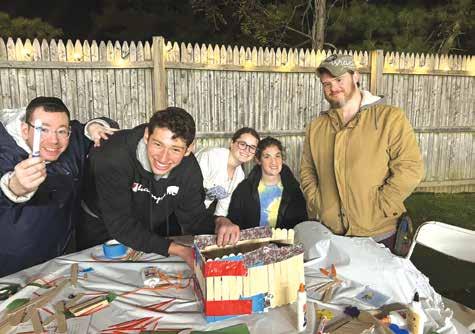
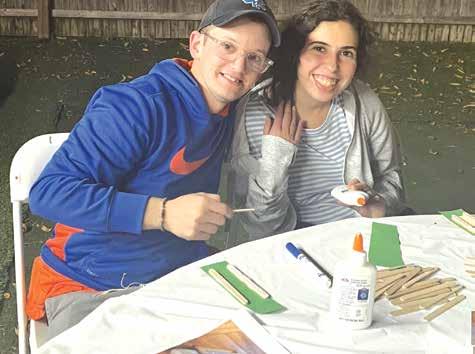
ested in sponsorship opportunities, give us a call at 516-295-2478. Stay tuned for more information coming next week!
The Friendship Circle, a project of Chabad of the Five Towns, is an organization dedicated to bringing joy and friendship to the lives of children, teenagers, and adults with special needs. With help from our teen volunteers, we
offer a wide range of exciting weekly and monthly programs, including Friends at Home, Judaica Circle, Fun and Fitness, T-YAD (Teens and Young Adults Division), and Kugel and Kumzitz. If you’re interested in volunteering, donating, or joining the Friendship Circle family, please visit fc5towns.com for more information.
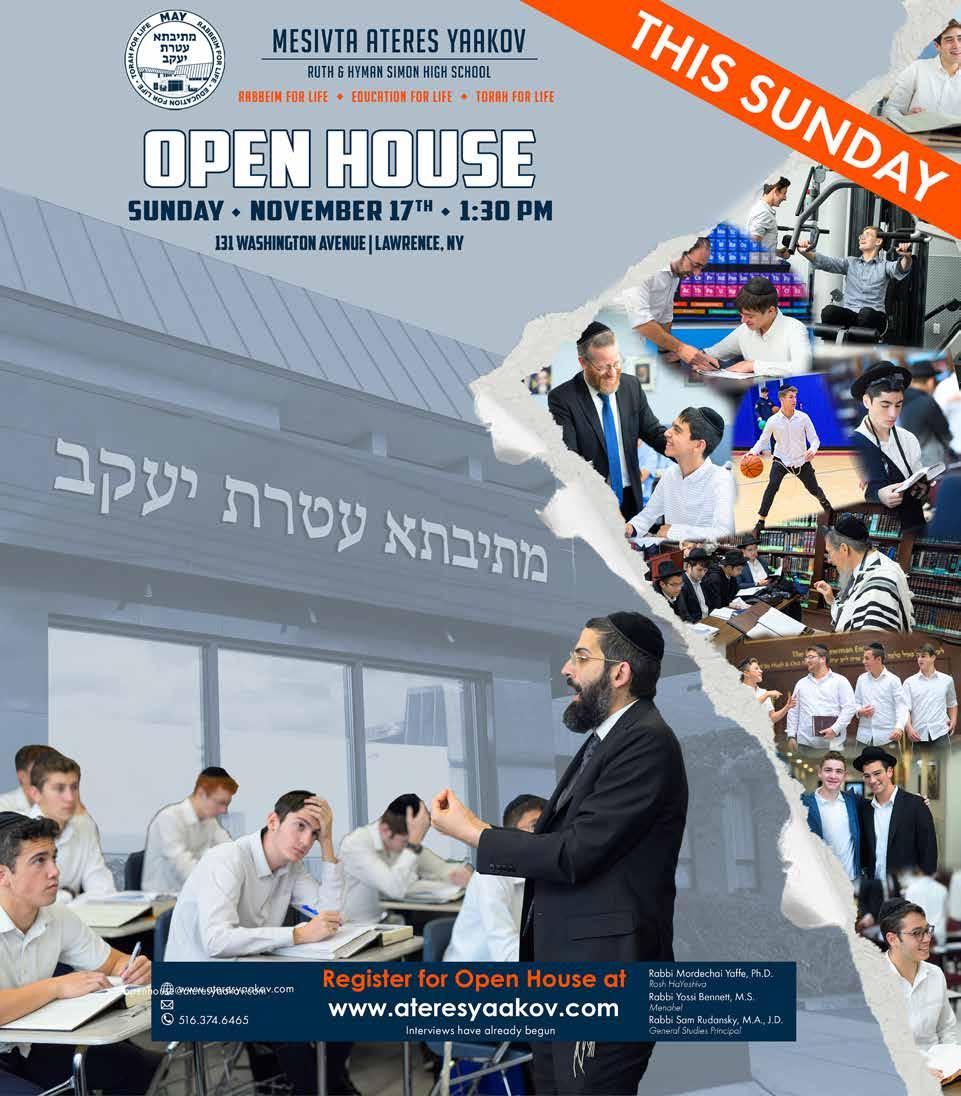

Local officials, including Mayor Ben Weinstock, NYS Assemblyman Ari Brown, Congressman Anthony D’Esposito, Hempstead Town Council-
woman Melissa Miller and Town Clerk
Kate Murray, attended the dedication of Ariel’s Court, in memory of Ariel Weinstock, on October 20 at Cedarhurst Park.


After researching this year’s democratic and republican congressional candidates, YOSS students in Rabbi Adler’s and Rabbi Escovitz’s class presented their candidates at the Election Fair. Students presented their candidates on tri-boards and were questioned

For Veterans Day, the
and judged about their candidates’ backgrounds, policies, agendas, and other political issues. It is amazing to see how much the students learned about the campaign process and the candidates individually!


legal
Shulamith’s Early Childhood located in the heart of Woodmere opened its doors to the community last Wednesday for its much-anticipated Open House event. The response from parents was so overwhelming that it became “standing room only,” as families flocked to get a glimpse of the top-notch educational facility and innovative programs that the school offers.
The event featured a presentation by the newly appointed Early Childhood Director, Mrs. Rachel Brier. She shared her vision for the school’s education program, emphasizing the importance of a well-rounded curriculum that combines academic growth with personal development. She spoke about the school’s
commitment to fostering a nurturing and stimulating environment where young minds can flourish.
One enthusiastic parent, Mrs. Ruby Goldstein, shared her perspective on the school, lauding the institution for its commitment to fostering academic and social development. Mrs. Goldstein, whose three daughters are currently enrolled at Shulamith, spoke passionately about the enriching experience her children have at school.
Following the wonderful speeches and video, an informative panel discussion took place. Parents and attendees had the opportunity to ask questions and gain insights into the school’s philosophy, teaching methods, and extracurricular offerings.
One of the highlights of the event was the opportunity to tour the school’s classrooms and learning centers. Parents were given a firsthand look at the modern and progressive classrooms that offer children a multitude of ways to learn, play, and collaborate. The various centers for learning, creative play, and collaborative activities demonstrated the school’s commitment to fostering holistic development in its students.
If you missed this Open House event, don’t worry! Shulamith encourages interested parents to reach out for further information about the admissions process. Shulamith Early Childhood truly has captured the hearts of many parents and students in our community! Spaces are limited; early enrollment is recommend-


At Bais Yaakov Ateres Miriam, we strive to facilitate not only academic rigor but character as well. Our annual Middos Program has commenced. This year’s theme, “Kol kevudah bas melech penima,” is triple the inspiration. Working off the theme, the year will be split into three components. The first phase of our Middos Program is already underway. We have begun with “kol kevudah” by focusing on honoring our parents, teachers, and friends. The second aspect of our program will highlight the words “bas melech” as we work on exhibiting royalty with our actions, dress and the way in which we carry ourselves. The year will conclude with the word “penima,” as we learn to strengthen our inner selves.
Each girl received a beautiful bracelet which they will add charms as they grow through this program. On Middos Monday each week, the students will learn the
lesson for the week, along with a tangible application of the middah. Those who have completed the tasks assigned will get a new charm for their bracelet at the end of each month.
In keeping with our current theme, Bais Yaakov Ateres Miriam held an assembly in honor of the Yahrzeit of Rachel Imeinu. Rachel Imeinu is the prime example of prioritizing the kavod of another. At the assembly, Mrs. Rudomin, menaheles, spoke about Rachel Imeinu’s sacrifice after waiting for seven years to marry Yaakov. Her desire to stop the embarrassment of her sister was so great that she gave up the simanim to Leah. Mrs. Rudomin then spoke of the importance of noticing others and doing our utmost to prevent embarrassment.
Grades 1-3 created edible replicas of Kever Rochel, while Grades 4-6 made their own mosaic versions. The seventh and eighth graders had a Yom Iyun where

HAFTR High School hosted a memorable Open House this past Sunday, offering prospective students and their families a dynamic preview of the HAFTR experience. A vibrant video depicted HAFTR High School’s inspiring vision and positive culture and introduced families to the yeshiva’s leadership team, including Head of School Ms. Naomi Lippman, Principal Dr. Josh Wyner, Rosh Yeshiva Rabbi Ira Wallach, and Dean of Limudei Kodesh Rabbi Yitzchok Riselsheimer, and student leaders.
Following the video, visitors embarked on a guided tour of HAFTR High School’s campus, where they explored the many facets of student life and academic achievement that make HAFTR unique. Distinguished rebbeim and morot from HAFTR’s faculty shared words

they discussed the topic on a deeper level, ending off with a project and a kumzitz. Thank you to Mrs. Rachel Messner for your tireless efforts creating and imple-
menting our incredible Middos Program. We are looking forward to a year of growth and learning!
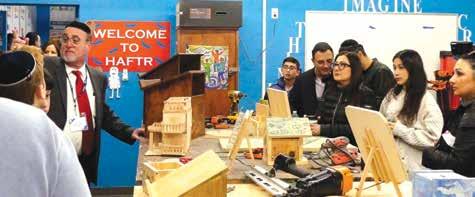
of Torah in an inspiring shiur. Students and parents experienced the warmth and passion that exemplifies Limudei Kodesh at HAFTR. The shiur highlighted the yeshiva’s deep commitment to cultivating a profound connection to Hashem through Torah learning. Guests also enjoyed mini-lessons in humanities and science, offering a firsthand look at HAFTR’s engaging and interactive classroom environment.
The tour included the school’s award-winning Technology and Innovation Center, a cornerstone of HAFTR’s commitment to academic excellence. Students and parents visited the hightech STEM lab, beautiful digital design lab, fully equipped art studio that houses the school’s renowned art institute, and the state-of-the-art maker space, which showcases advanced tools and technolo -
gies that empower students to turn their ideas into real-world innovations.
One of the highlights of the day was the “Creating Connections” activity, a beloved feature of HAFTR’s Open House. In this fun, “speed meet” format, prospective students and parents had the opportunity to enjoy rapid, personal exchanges with administrators, faculty, and current students, addressing questions on topics ranging from academics to extracurriculars, school culture, and support systems. This engaging activity fostered authentic connections and provided prospective families with a real sense of the community that awaits them at HAFTR.
As part of the day, visitors got an exclusive peek at the auditorium renovation project, examining blueprints and renderings of the magnificent venue that
will be the educational, cultural, and religious center of HAFTR High School.
Seeing the space firsthand created an added layer of enthusiasm among future students, as they imagined themselves in the upgraded facilities.
The event concluded in a collation room, where families, students, and faculty continued conversations about HAFTR’s outstanding program and fostered connections that speak to HAFTR’s close-knit and supportive community.
HAFTR High School is now accepting applications for the coming academic year, which can be submitted online at HAFTR.org/Admissions. For further inquiries, please reach out to Admissions Director Mrs. Michelle Halon at 516569-3370 ext. 196.

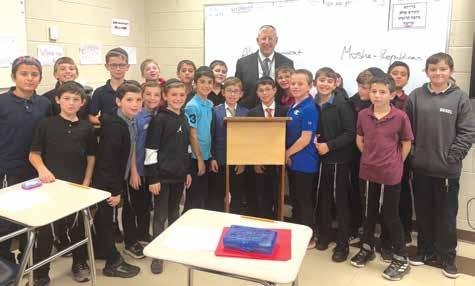
Mrs. Mayer’s fifth grade students at Yeshiva Darchei Torah held a presidential debate with nominees Akiva Goldman from the Democratic Party and Moshe Hildeshaim from the Republican Party. After a fierce debate, the Republicans won!
Did you
A cloud can weigh a million tons.
The Hebrew Academy of Nassau County will soon bring a dream into an exciting new reality. In the past, due to the distance, HANC’s Early Childhood Center, Elementary School and Middle School each operated in three different campuses. Thankfully, after much hard work and thoughtful planning, construction has already begun on a new facility which will unite three of HANC’s four divisions into one three-acre campus in West Hempstead. Due to open in 2025, the exciting developments are already underway and ready for showcase to the community at large, beginning with the HANC Open House that took place on Wednesday, November 6. The event was held on the new site and featured a curriculum expo, combining the Early Childhood, Elementary and Middle School divisions coming together to send a message of unity: HANC is one school with one vision. The dream of deeper collaboration amongst the divisions will come to life and the opportunities afforded in this new building are exciting and will make HANC richer for
National and state elections were held in the USA lastweek, but at Shulamith School for Girls, we held our own election – for COOKIES! The girls cast their ballots between chocolate chip and sprinkle, and after much anticipation, chocolate chip emerged victorious. As a sweet treat, every girl enjoyed the clear winner!



the faculty, parents and most importantly, the students.
There is so much to learn about HANC’s new state-of-the-art facility. The new campus will include a very large Beit Midrash, a full size gym with bleachers and locker rooms for home games, modern STEM labs, art and music rooms, Engineering and Robotics discovery labs and larger classrooms to accommodate the tremendous growth in HANC’s student population. The three acre property will also provide large open spaces for recess and will include basketball courts, baseball fields, football fields and multiple playgrounds.
On the evening of the Open House, parents were greeted by Rabbi Ouriel Hazan, Head of HANC West Hempstead campuses, who spoke about the special relationships between the students, teacher, parents and administrators at HANC. After an inspiring video presentation on what a HANC education incorporates, the parents visited the numerous exhibits that included: Torah Education, Educational Technology, Student Activi-

ties, Math, Science, STEAM Education, Literacy, Art, Ivrit, Student Support, District Services and staff members from the Early Childhood and Kindergarten staff. The auditorium was full to capacity and the energy and excitement in the room was palpable. The families were also treated with a delicious repast and were gifted with a HANC gym bag filled with materials and swag to help them be -
gin their journey toward a HANC education for their children.
As HANC looks toward the future, the possibilities for growth in a large brandnew building are boundless. HANC is the best-kept secret in the Greater Five Towns area. Come and see for yourself what a HANC education can do for your children and family.

over again.”
FBy: Moshe Bodner and Jeff Eisenberg
or over 13 months, our community, and many Jewish communities around the world, have galvanized to provide financial support for IDF soldiers in need of gear and equipment. Through your generosity, the Israel Chesed Center and our partners (Boots for Israel, BC Lev Echad, Just1Chesed / Chibuk Lagiborim and others) have managed to direct millions of dollars in donated gear to Chayalim on the front lines.
One year ago, we started getting urgent requests for winter gear – thermals, socks, raingear, wind-proof jackets, sleeping bags, face masks and other supplies. We sent thousands of duffel bags to Israel containing these items.
We then learned that many Chayalim needed helmets, ceramic vests, fire resistant uniforms and other tactical gear and that the lucky ones who did receive these items from the IDF were often issued gear that was previously used in the SixDay War and the Yom Kippur War! Our communities stepped up again, donating thousands of helmets, vests, drones, night vision goggles and other sorely needed equipment.
Since the war heated up in Lebanon two months ago, we have received an unprecedented number of requests for gear (as well as numerous messages of thanks, telling us that our equipment has saved lives). And as the weather has turned colder, the demand for winter gear has exceeded that of a year ago.
As Yogi Berra said, “It’s like déjà vu all
Since we are “talking baseball,” a famous story of the Lubavitcher Rebbe comes to mind.
In 1955, a man took his 12-year-old son to meet the Rebbe. The Rebbe blessed the boy that he should grow to become a source of pride to the Jewish people and to his family, and as they turned to leave, the Rebbe surprised them with a question that he addressed to the boy, “Are you a baseball fan?” The bar mitzvah boy replied that he was. “Which team are you a fan of — the Yankees or the Dodgers?” asked the Rebbe. ”The Dodgers,” replied the boy. “Does your father ever take you out to games?” the Rebbe asked? “Well, every once in a while, my father takes me to a game. We were at a game a month ago,” the boy replied.
“How was the game?” inquired the Rebbe. “It was disappointing,” the 13-year-old confessed. “By the sixth inning the Dodgers were losing nine-totwo, so we decided to leave.” The Rebbe asked him, “Did the players also leave the game when you left?” “Rabbi”, the boy replied, “the players can’t leave in the middle of the game!” “Why not?” asked the Rebbe. “Explain to me how this works.”
“There are players and fans,” the boy explained. “The fans can leave when they like — they’re not part of the game and the game could, and does, continue after they leave. But the players need to stay and try to win until the game is over.”
“That is the lesson I want to teach you in Judaism,” said the Rebbe with a smile. “You can be either a fan or a player. Be a player.”
We are all fans of our Chayalim! But

rooting from the sidelines, saying Tehillim and davening, is simply not enough.
In 1974, Rabbi Yisrael Lau (future Chief Rabbi of the State of Israel) came to Brooklyn to visit the Lubavitcher Rebbe. During their conversation the Rebbe asked him what the Jewish people in Israel were saying these days. Rabbi Lau replied that Jews were asking “what will be?” The Rebbe grabbed his arm and said: “Jews don’t ask what will be; they ask what they are going to do.”
A few months prior, at the height of the Yom Kippur War, the Rebbe declared that the Chayalim were not the only soldiers fighting to protect Eretz Yisrael; he encouraged all Jews to be players on the battlefield, and identified four ways that we, civilians, can “join the fight.” The Hebrew word for a gun is a Neshek, and the Rebbe identified four types of Neshek, four different weapons, that we Jews have in our arsenal:
Torah - from the pasuk in Shir Hashirim, “Yishakeini M’nishkot Pihu,” in which we ask Hashem to “kiss us with kisses from His mouth,” the learning of Torah. The Rebbe especially encouraged additional learning of Torah by children, based on the Pasuk in Tehillim, “M’pi ollalim v’yonkim yisadeta oz, Out of the mouths of children You have established strength.”
Tefillah - The gematria of Neshek Yehudi (Jewish Ammunition) is 485, the same as Tehillim.
Shabbat Candles - Neshek (nun, shin, kuf) is an acronym for Neirot Shabbat Kodesh. The holy lights of the Shabbat candles are meant to bring peace to the home, and the Rebbe felt if more Jewish women would light Shabbat candles, it would bring peace to the Jewish nation; and finally
Chesed - Neshek is also the root of the word “Neshikah,” a kiss. A kiss signifies love, and we are commanded to love our fellow Jews. There is no better expression of love than an act of kindness.
All of the weapons in our Jewish arsenal are essential, and we have been deploying them for 13 months. But it is the fourth piece of weaponry, Neshikah, a kiss, chesed, that is the most critical. Torah, Tefillah, Shabbat candles – they are our Bein Adam LaMakom weapons. But Chesed, that is our Bein Adam Lachaviro weapon, the one weapon that has two targets.
When we do Chesed, we are telling
Hashem that we love Him, and we are, perhaps more importantly, telling our brothers and sisters, our Chayalim, that we love them! Hundreds of Chayalim have told us that they appreciate the donations because it saves their lives, but they cherish the donations because they are “mechameim et halev,” it warms their hearts to know that their “family members” thousands of miles away are in it with them. This feeling is what encourages them to keep fighting, and reminds them that they are not “just” fighting to protect a piece of land or to ensure the safety of Israelis; they are fighting for all of Am Yisrael.
How do we further increase the merit of protection for our soldiers? With the weapon of Neshikah. With our “ahavat chinam” and acts of Chesed. And today, there is no bigger chesed than giving of ourselves and of our resources to help our Chayalim. Visit the Israel Chesed Center. Buy and pack gear for soldiers. Write letters to chayalim and prepare gift packages. Going to Israel? Take some bags for us! Volunteer in the Chesed Center. Bring your friends and their families. Increase the Chesed on behalf of the IDF soldiers, and play a huge role as a non-combat soldier defending Am Yisrael and Eretz Yisrael. The Chayalim are our brothers (and in many cases, they really are our brothers, cousins, nephews and nieces, friends), fighting to protect our Land and our nation.
We are not simply fans of the home team. We – every one of us – are players.
As the Rebbe told Rav Lau, Jews “ask what they are going to do.”
The game is not over. No matter what you have done since October 7, 2023, there is much more to do.
What will you do now to protect our Chayalim?
B’yachad n’natzeiach!
Moshe Bodner and Jeff Eisenberg are the co-founders of the Israel Chesed Center, the largest private humanitarian organization established in the aftermath of October 7, 2023, to assist soldiers, displaced families and security response teams in Israel. The Israel Chesed Center is located at 1315 Peninsula Blvd., Hewlett.


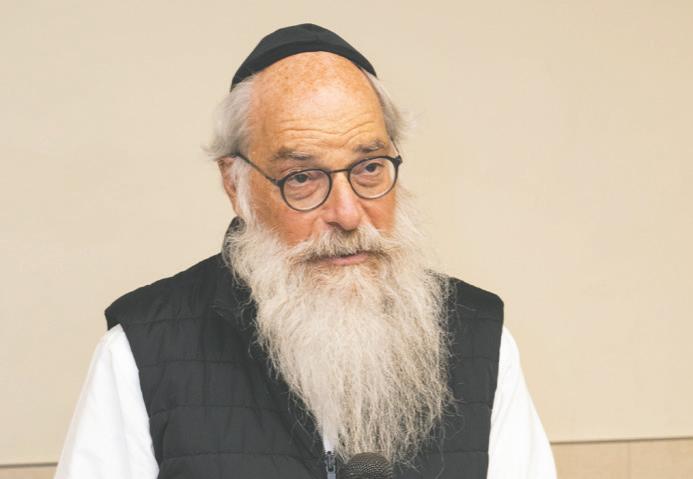
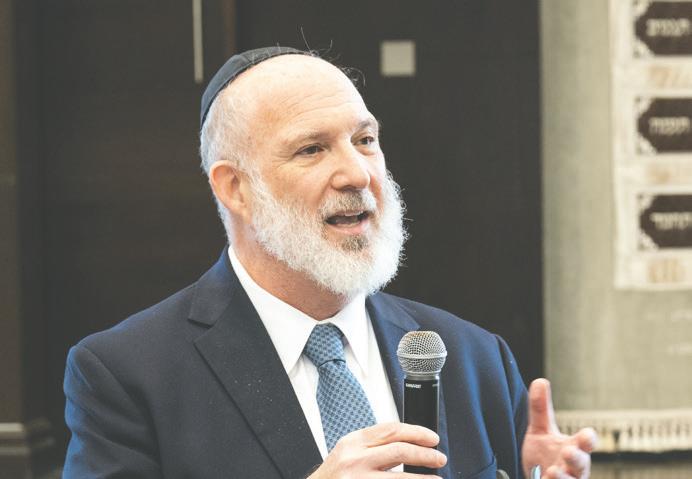


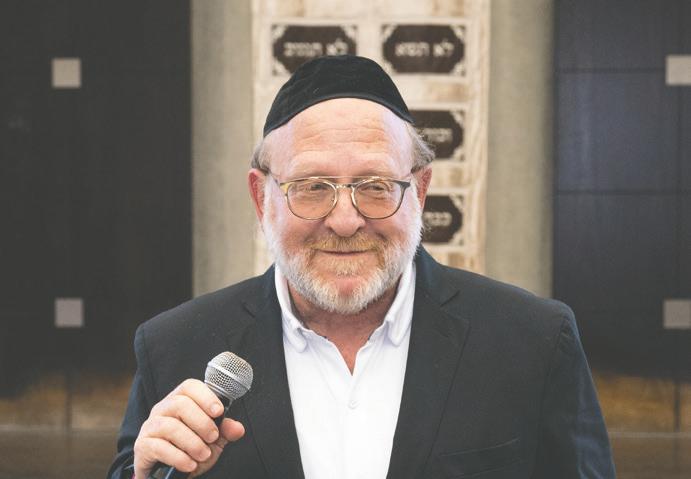
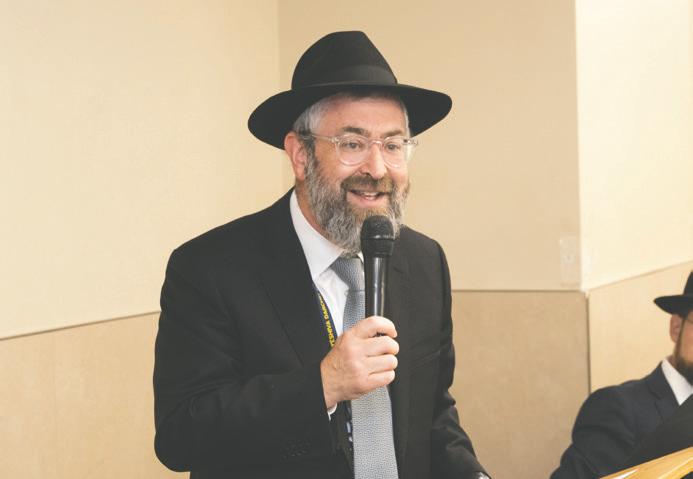


They registered, grabbed a program and a goodie bag, found their seats, and for the next few hours were completely drawn into the world of YSZ High School. Prospective parents and students experienced the energy of YSZ as they moved through the Open House, where every moment offered a glimpse of what makes the school so distinctive.
From the opening address to the vibrant Learning Fair, Open House was an “opportunity to truly experience YSZ High School,” said Mrs. Rina Zerykier, menahelet of YSZ. In her welcome, she captured the school’s mission: “YSZ inspires girls to become proud Jewish women, strong thinkers, and curious lifelong learners with a deep connection to their heritage.”
Mrs. Zerykier continued, “Our students deserve to know their importance, that they can impact their world. They are future mothers, professionals, and leaders who will shape the Jewish community.” Asked how YSZ accomplishes this mission, she highlighted the school’s “cutting-edge academics, diverse co-curricular offerings, and a focus on character development.”
In addition to a robust core curriculum, YSZ provides a range of AP classes, creative electives, STEM courses, and an array of clubs and activities—from the drama club to chessed initiatives and athletic teams. The school’s social-emotional program was also on display, embodying YSZ’s commitment to supporting the whole student.
With YSZ’s range of programs com-

bined with a nurturing atmosphere, it became clear to guests what YSZ is all about. As one teacher put it, “At YSZ, our Open House is really an Open Home.”
The YSZ environment fosters a sense of family, where girls feel comfortable to take on challenges and pursue growth in a supportive community.
The excitement of Open House extended beyond the faculty. YSZ students from all grades were involved, from preparing the event to leading student panels and welcoming guests. This level of involvement reflects their pride in the school. A Student Ambassador explained, “I wanted to be involved in the Open House because YSZ has given me so much. It’s been a life-changing experience, and I want other girls to feel that same excitement and connection.” Re -
flecting on her time at YSZ, she shared, “When I was an incoming student, the Open House gave me such a warm welcome. Now, I’m excited to give that back.”
The impact of the Open House was clear. Prospective students and parents left impressed with YSZ’s values and community spirit. One eighth grader attending the event said, “What stood out to me was how YSZ isn’t just about academics, but about who you become as a person. They want you to be your best self.” Her mother agreed, appreciating YSZ’s approach to education as one that reaches “from head to heart.”
The feedback echoed around the community. With a packed turnout and limited spots opening next year, it’s clear that YSZ High School is becoming the top choice for many families.

This year’s open house celebrated Shulamith High School’s decade of excellence in serving high school girls throughout the Five Towns community and beyond. Showcasing the extensive curricular and extracurricular opportunities the school offers, visiting eighth graders were presented with the future of possibilities that await them as the SHS Class of 2029.

HALB Middle School is continuing to focus on the importance of tefillah for us as individuals and for the Jewish people as a whole. Students who show effort during davening get treats each week, and last week, they were rewarded with delicious Rita’s Ices!
Prospective students mentioned that the unbelievable enthusiasm they witnessed throughout the program from current SHS girls, and the genuine answers they heard from them during the student panel and at the co-curricular expo, stood out as a testament to the heart of Shulamith. As we enter admissions season, we invite you to apply and come see the magic for yourself!






In honor of Election Day, YCQ students engaged in age-appropriate lessons about democracy, choice, and empathy. Elementary students registered to vote and then cast their ballots in a fun election to decide between donuts and ices, while early childhood students, guided by Morah Shana, learned about voting by choosing between cookies and pretzels.
In the Junior High School, students participated in a meaningful debate about social media regulation, discussing whether social media use and safety
This past Motzei Shabbos, MTA hosted its annual Open House. Welcoming over 700 people from over ten communities including Teaneck, West Hempstead, Queens, Monsey, Bergenfield, Great Neck, Passaic, Fair Lawn, Brooklyn, Five Towns, as well as out of town communities, the night was an incredible success!
Rabbi Konigsberg, MTA’s principal, introduced the event, and the theme of the night – MTA’s integration with Yeshiva University. Announcing the four new exciting programs that are being launched, and explaining the benefits of each, helped frame the evening. This was followed by a message from YU President, Rabbi Dr. Ari Bermant. He spoke about the relationship he personally has with MTA, as an alumnus and current parent, and the unique opportunities available there.

should be left to parents and students or the government should pass laws to protect minors.
Grades 4-8 also had the opportunity to hear from motivational speaker Jon Pritikin, founder of the nonprofit “Feel the Power” who shared an inspiring message of resilience and the power of kindness. His talk reinforced the values of empathy and self-confidence, leaving a lasting impact on the students. Special thank you to Assemblyman David Weprin and the Afikim Foundation for helping to make this special event happen.
The nightlife in Plainview was upgraded last week with the addition of Mercaz Academy’s Pajama Night. This event invites pajama-clad children aged two to four to join the Early Childhood Center students in exploring the school after hours.
Parents chatted with teachers, administrators, and newcomers while their children and their visiting friends played and noshed on rather more pizza than salad. Comfortably fed, the group rotated among three bedtime story rooms. ECC Director Joanne Mlotok read Leaf Man, by Lois Ehlert, while the young listeners helped out the narration with their own puppet leaves, blowing in the wind. Ms. Gina Bonanno, who teaches kindergarten at Mercaz, read Pete the Cat and His Four Groovy Buttons, by Eric Litwin. Children listening to this story received their own coloring page and groovy buttons to count along as the story progressed. In Mrs. Melissa Reinhardt’s room, the story

was How to Babysit a Grandma, by Jean Reagan, and listeners got into the action by caring for their own “little grandmas.” The evening ended with the customary (and delicious) milk-and-cookies bedtime snack. Having caught just a glimpse of what makes Mercaz Academy’s preschool so special, parents, students, and visitors headed home for a good night’s rest, to dream about their adventures at Mercaz after dark.
Did you know? Lemons float, but limes sink.
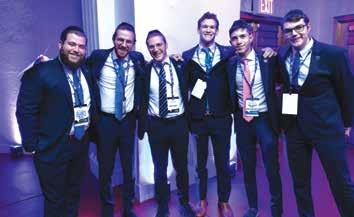
Following the opening program, parents and students were divided up to experience a taste of what MTA has to offer. One of the highlights for the parents was a special More Than Anywhere Else info session that highlighted many of the unique aspects of the yeshiva. Parents were informed about so many pieces that make MTA the destination yeshiva that it is. In addition, parents learned about the
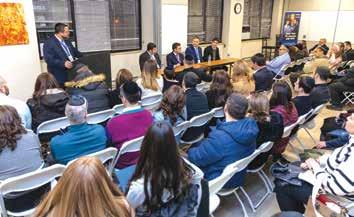
special ninth grade experience at MTA, learned about the high level of learning that is offered, and were exposed to mini-lessons as well.
Students had a blast, hopping from a session in MTA’s brand new weight room, to an entertaining student panel to mini-hockey in the Den, to learning sessions both in Limudei Kodesh and general studies. The student night was capped
off with a visit to the Max Stern Athletic Center, the YU gym for a Line-Up competition, then onto the Curricular Fair and elaborate dairy buffet in Weissberg Commons.
The Open House was fantastic, and good vibes were felt all around. MTA looks forward to kicking their Admissions season into high-gear!

On November 4, 2024, the Jewish Orthodox Women’s Medical Association (JOWMA) hosted an inspiring and informative event titled, “Cancer Prevention & Screening: Why is Testing Important?” in partnership with New York Presbyterian, JScreen, and the Young Israel of Woodmere.
Nearly 100 attendees gathered to learn about cancer prevention, genetic risk assessment, and the latest research on screening for BRCA and other genetic cancer markers within the Orthodox Jewish community. The event featured esteemed experts, including gynecologic oncologist Melissa Frey, MD, breast radiologist Katerina Dodelzon, MD, gastroenterologist Ravi Sharaf, MD, and genetic counselor Estie Rose, MS. Rabbi Shay Schachter, Associate Rabbi of Young Israel of Woodmere, opened the evening with meaningful remarks, and Miriam “Mimi” Knoll, MD, JOWMA CEO and radiation oncologist, moderated the discussion.
Dr. Melissa Frey serves as Director of the Genetics and Personalized Cancer

Prevention Program at Weill Cornell in NYC. The center provides personalized cancer prevention and screening counseling and surveillance for patients. Dr. Frey shared, “About 1% of people have a mutation that can increase risk for cancer, but for Ashkenazi Jews the rate of a mutated BRCA1/2 gene is much higher — 2.5% of people.”
The speakers highlighted practical points on cancer screening, emphasizing the benefits of genetic testing provided by JScreen, a nonprofit organization offering cancer risk testing to individuals aged 21 and older.
“The testing is very simple,” shared panelist and genetic counselor Esti Rose, MS. “Some people do it by blood and some people do it by saliva (it is the same accuracy,) and the results tell you if you
do have a mutation in any of those genes, and if they are positive, we’ll talk about the associated risks and send them to the appropriate physicians to help manage those risks.”
Panelist Katerina Dodelzon, MD, described how screening empowers individuals to identify genetic risk factors early, allowing them to make proactive health decisions and take preventive measures. The event resonated deeply with participants, as one attendee shared, “this was a really amazing event. I learned so much!” Numerous audience members engaged in meaningful conversations with the panelists, discussing personal concerns and experiences. This supportive environment encouraged attendees to prioritize their health and seek guidance on their journey toward cancer prevention.

event’s
committee included: Lauren Balsam, Yael Elias, Mozelle Goldstein, Alyson Goodman, Miriam Savetsky, Yael Schulman, Yosefa Silber, MD, Liat Weinstock, and Gabby Winkler.
JOWMA is a 501c-3 non-profit founded in 2019 to support a network of Jewish women physicians and to provide health education, outreach, and advocacy on behalf of the Orthodox Jewish community. The organization hosts educational events and programs on a variety of health topics including: pediatrics, wellness, women’s health, teen health, mental health, preventative health, and more.
To learn more about JOWMA’s educational programs and events, please visit www.jowma.org or e-mail info@jowma.org.
On Wednesday, November 6, the eighth grade at HANC began a project called Names Not Numbers. In the program, students interview Holocaust survivors and edit the interviews which are then made into a documentary. The program began with powerful words from Rabbi Hecht, the Middle School Principal, who spoke about the magnitude of a project like
this. He explained that it is crucial for the students to participate and internalize the stories so that they can pass them on to future generations. He explained that some things you need to forget in order to move on. On the other hand, something like the Holocaust can never be forgotten.

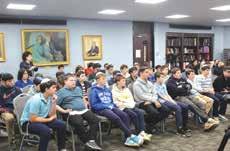
Next, we heard from Mrs. Tova Rosenberg, the creator of Names, Not Numbers. Mrs. Rosenberg gave an in- spirational speech about how important this project is and how lucky we are to get the chance to participate in this program. After Mrs. Rosenberg, the students watched a 20-minute clip of an interview with Moshe Avital, OB”M. The students sat spellbound watching his story. It is something which I am sure will stay in their memory for a very long time. Next, there was a presentation from Mrs. Shoshana Soroka, editor of The Jewish Home Mrs. Soroka gave the class tips on how to talk and interview Holocaust survivors. Mrs. Soroka did an amazing job of guiding the students. She was so engaging and listened intently as each student suggested certain types of questions. She went through the interview and explained how there would be questions about before the war, during the war, and after the

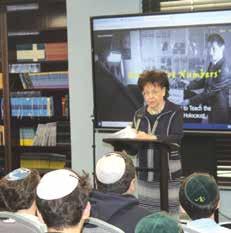
war. Mrs. Soroka explained what types of questions would be best. She talked about what happens if the survivor cries or is silent for a bit. The grade is looking forward to participating in this project.
By Christina Fitzpatrick

This past week, the Yeshiva of South Shore students participated in an immersive Lego STEM Classroom Convention! The boys participated in the engineering of some fantastic structures. They were first presented with LEGO STEM challenges, such as “construct an object with one hand,” “build a word out of LEGO,” “build the tallest structure possible,” along with many others! There were stations for the boys to engage in as well. At these stations, they were able to weigh, measure and float the creations that they engineered, using digital scales, measuring tapes, rulers, and basins of water. They also worked on a “real world” activity to construct something out of LEGO that can be applied in daily life, such as a bowl, a stepstool, a spoon, etc. The boys had a fantastic time. It was an amazing week!


It was a very busy and exciting Election Day last week at HALB. Students in all classes from nursery through middle school were busy learning about the election process. Students then voted on very important matters like which cereal they like best, which Oreo is their
favorite, or whether the class should have no homework or extra recess! Regardless of what they voted for, the students learned how important and what a privilege it is to have a voice and have the opportunity to get out and vote.

On Sunday, November 10, the DRS Yeshiva High School for Boys was filled to capacity at the school’s annual Open House. DRS hosted over 190 prospective families at the annual event. The open house provided its attendees with an informative, exciting, and enjoyable program allowing those interested in the school to get a real sense of what DRS is all about. Upon entering the building, every attendee was warmly greeted by DRS Menahel, Rabbi Yisroel Kaminetsky, Principal, Dr. Ethan Zadoff, faculty members, and current DRS students.
The program moved to DRS’s spacious Beit Medrash. This year, the program opened with the recitation of Tehillim by the large crowd, followed by a dvar Torah by senior Mishael Lalehzari. Rabbi Kaminetsky and Dr. Zadoff addressed the enormous crowd, enlightening them about DRS’s strong and challenging curriculum in both Limudei Kodesh and Limudei Chol. Rabbi Kaminetsky stressed that the hallmark of the school is the “personal care, warmth, and at-
tention provided for each individual student.” More importantly, DRS prides itself on the “achdut” between classmates, who come to DRS from over 20 different elementary schools, and several different neighborhoods, including Queens, Brooklyn, West Hempstead, the Five Towns, and Great Neck.
Following the principal’s remarks, students headed off to the extra-curricular student fair in DRS’s incredible gymnasium, where they received a taste of all the programs that DRS has to offer, including a presentation from the cooking and sushi club, College Bowl competition, sports teams, Shabbatonim and trips, and much more. At the same time, parents got a chance to choose 6 of 11 different sessions each focusing on a different aspect of the DRS experience. DRS boasts a large curriculum including 14 AP courses, and the opportunity to be involved in several research opportunities in both Science and Social Studies. Parents got a chance to ask questions to a panel of five DRS students and five DRS parents in order to get their view of the


DRS experience. Other sessions included an exploration into the Limudei Kodesh curriculum, a glimpse into the school’s extracurricular offerings, guidance department presentations, a shiur from a Rebbe, and more.
DRS thanks all those who came to visit the Open House, and look forward to meeting them again in the future!



Taking inspiration from Parshas Vayeira and learning about Avraham’s tent, the children of Gan Chamesh internalized the mitzvah of hachnosas orchim in a meaningful way


The talmidim of the YOSS Mechina had the zechus to hear divrei chizuk from Harav Zev Leff, shlita, Rav of Moshav Mattisyahu. Rav Leff inspired the talmidim by teaching a valuable lesson in Yiddishkeit that we learn from Avraham Avinu. Rav Leff explained
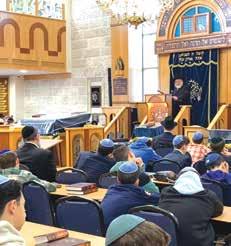
that although we have 613 mitzvos, there is really only one thing that Hashem wants from us and that is to be a Yirei Shamayim. Following his speech, Rav Leff greeted every talmid with Shalom Aleichem and a bracha!
The second Jewish Music Hall of Fame concert, held on Motzei Shabbos, November 9, 2024, marked the first yahrtzeit and was a moving tribute to the life and legacy of Sheya Mendlowitz, a”h, a beloved icon in Jewish music. Organized by JEP of Long Island/Camp Nageela, the evening celebrated Sheya’s contributions through an unforgettable lineup of music he cherished and helped bring to life. The concert was held at The Space at Westbury, with special thanks to Sharona Mohaber, the venue’s event coordinator, for her support in making the evening a success.
The concert, emceed by the renowned Zale Neuman, opened with a heartfelt Mi Shebairach for the soldiers in Israel, led by Chazan Nissim Saal, fostering a sense of solidarity and reflection among the attendees. This moving start set a tone of gratitude and purpose for the evening, resonating with the crowd and underscoring the communal bond.
Every performance throughout the evening honored Sheya Mendlowitz’s enduring impact. Many of the songs chosen were those he had produced, and the entire event was a testament to his profound influence on Jewish music. In a special honor, Sheya Mendlowitz,
a”h, was inducted into the Jewish Music Hall of Fame. His son Yitzchok accepted the award, given by MBD and Avraham Fried, on his behalf, expressing gratitude to JEP, the producers, the performers, and everyone who came to celebrate his father’s legacy. The atmosphere was electric with both nostalgia and pride as the crowd joined in honoring Sheya’s life’s work.
Additionally, Douglas Jablon, the executive Vice President of Maimonides Hospital, was honored for his unwavering help and dedication to Sheya throughout his life. He was presented with the award by Sheya’s brother Shmuel.
The success of the concert was made possible by the dedication of producer Yochi Briskman, technical producer David Scharf of DS Productions, and Rivie Schwebel, who played an integral role in organizing the event. Their combined efforts ensured a seamless experience, allowing the music and tribute to take center stage. Security for the evening was generously provided by 613 Security, ensuring a safe and secure environment for all attendees.
Michael Schick, president of JEP and one of the hosts of the event, shared, “The energy and unity we felt tonight

were truly special. It was an incredible celebration of Sheya Mendlowitz’s legacy, and we’re so grateful to everyone who joined us to honor him.”
In addition to celebrating Sheya’s contributions, the concert underscored a commitment to giving back to the Jewish community. Proceeds will support a new indoor recreational center at Camp Nageela. This project adds a meaningful layer to the concert’s purpose, honoring the past while supporting the future.
At the end of the concert, a Sefer Torah was donated to JEP’s Camp Nageela in memory of Sheya Mendlowitz, a”h, by Shya Hersh Schwartz, a dedicated JEP board member. This poignant close ensured that Sheya’s legacy would continue to inspire future generations in the most meaningful way possible.
Special thanks go to Rabbi Dovid Shenker, Director of JEP Long Island, and the entire JEP Board, as well as Ohavia Feldman, Chaim Gitelis, and Rabbi Yitzchok Wurem for their tireless work in making this event possible. JEP extends heartfelt gratitude to all the dedicated volunteers who generously gave their time; without them, the concert would not have been possible
The Second Jewish Music Hall of Fame Concert was not only a night of exceptional performances but a powerful reminder of music’s ability to honor, uplift, and unite. This year’s event served as an inspiring celebration of Jewish heritage and community honoring Sheya Mendlowitz’s lasting legacy.



The JSL was back in full swing this past Sunday, brought to you by FM Home Loans, with some incredible games and finishes. Binyamion Weissmann of Weissman Photography was on hand to capture some amazing shots of the exciting action.
JSL Juniors
K/P Hockey: Growtha made a dramatic comeback, erasing a 5-1 deficit to tie Gerber Bedding 5-5, thanks to Shmuel Bach’s game-tying goal just 15 seconds before the final buzzer. In another exciting matchup, Smash House triumphed 6-4 over Bright Futures as Yehuda Cohen scored four goals, and Yoyo Eichorn delivered several key saves. Posh Home + Bath dominated SR Whee 5-2, propelled by a hat trick from Harry Wilheim. 5 Towns Landscaping earned a 6-3 win over 5 Towns Central, with Moshe Obadia putting on an incredible performance, including a hat trick.
K/P Soccer: In a thrilling 5-5 draw, Future Care Consultants fought back to tie Hewlett Auto Body, thanks to a game-saving play and game-tying goal from Caleb Hershman. Meanwhile, Better Image Contracting and Maidenbaum
finished deadlocked at 6-6, highlighted by Yehoshua Berkovsky’s incredible fivegoal performance for Better Image.
Football
Newman Dental showed their grit in a 10-7 victory over Rides to Fly, thanks to two touchdowns from Nechmia Oretz.
Hockey
1st Division: Town Appliance cruised to a 10-2 win over Seasons Express, where their goalie showcased exceptional post-to-post saves while the offense moved the puck beautifully. Simcha Day Camp rolled to an 11-3 victory against John’s Automotive, with Michael Fuerst and Yakov Felder running the floor and making huge impacts throughout the game. PlumbPro secured a 5-3 win over Wolf Phone Repairs, driven by a hat trick from Shmuli Lazar.
2nd/3rd Division: S.I.N.G. Entertainment triumphed over Maidenbaum 8-6, highlighted by Rafi Jeger’s remarkable full-court goal that electrified the crowd. The Gallery beat Neuman Dental 6-5, with Eli Rebel scoring2 goals including the game-winning goal. Sr Whee defeated Target Exterminators 8-5, with MVP honors going to Elishah Summer-
stein and Sharyahu Metz, both of whom scored hat tricks.
4th/5th Division: Russo Pharmacy triumphed over Target Exterminators 139, with Eliyahu Ruzohorsky named MVP after scoring his first goal of the season. Smash House beat Town Appliance 8-1, with MVP Zev Richman showcasing a lockdown performance as a defenseman, allowing only one goal.
6th/8th Division: Aron Renov put on an impressive performance, scoring five goals to lead Tikva Fire to a dominant 7-2 victory over 925 Sterling.
Basketball
3rd/4th Division: Wieder Orthodontics flashed bright smiles after their dominant 29-3 win over Better Image Contracting, with Judah Avigdor putting up 20 points and 5 assists. Russo’s Pharmacy secured a 14-10 victory over Posh Home + Bath, led by Jonathan Singer, who scored 8 points and blocked 7 shots.
5th-7th Division: Tiffany Dry Cleaners picked up a 22-16 win against DJ_CP, powered by Yisrael Graber’s 12 points and 6 steals. Smash House rolled to a 30-22 victory over Emporio, with Solomon Licht contributing 6 points and
Last Shabbos, Rambam experienced its Annual Schoolwide West Hempstead Tisch. Over the past month, students from across the Mesivta made arrangements with their friends of the West Hempstead population, ensuring that they would have proper lodging for the Shabbos of November 2nd. After dinner that evening, students, rebbes, teachers, and alumni made their way to Principal Mr. Hillel Goldman’s house, where they were greeted by an abundance of snacks and song.
The seniors led the school in classic Shabbos Zemiros. After a great Dvar Torah from Mr. Goldman, the Mesivta began in singing Ma Yedidut – but with a twist! For each verse students would stand up for different reasons – whether
it be because they’re on the Chess team, were at Book Chat last week, had won a plaque at Rambam, and more. The fun concluded with the entire school standing for the most important event of the night, Mrs. Goldman’s Mad Phat Cholent!
Eventually, everyone returned to their places of dwelling, before meeting for Shul at Anshei Shalom or Young Israel of West Hempstead the next morning. Throughout the day students met and played games and learned, before all meeting back at Young Israel for Mincha.

5 blocks to the win.
Men’s Basketball Ariel Melool was on fire Sunday night, leading Maidenbaum to a thrilling twopoint victory over Hewlett Auto Body. His stellar performance kept Maidenbaum in control throughout the game, helping them secure the hard-fought win. Meanwhile, in another exciting matchup, Yoni Bobker and Yosef Rudansky sparked a second-half surge for Town Appliance, propelling them to a 65-55 triumph over Sr Whee.

Did you know?
Approximately one quarter of the bones in your body are in your feet.
The school then had an exclusive shalosh seudos, with divrei Torah from Mordechai Engelsohn (senior) about Noach’s tests, Shmuel Rabinow (senior) exploring the nature of rainbows, and words of chizuk from senior Avi Masri. Rav Yitz Milworn, the school’s Director of Student Activities, who helped organize the whole event along with Director of Operations Aaron Friedman, spoke about capitalizing on new opportunities. He explained how each of us are like Noach going into the Teivah, deciding what type of adults we’re going to be.
Shabbos concluded with a beautiful
Havdalah led by senior Avi Katz, and the students returned home. This turned out to be one of Rambam’s greatest tisches ever, and the school owes a huge thank you to Mr. Goldman, Rav Yitz, and the whole new Rambam administration. The students can’t wait to see what Shabbatons are in store for the future!

What an incredible season of 5 Towns Flag Football we’ve just experienced, culminating in an exciting Championship weekend that took place just this past week. The Playoffs were nothing short of spectacular, and the Championship games themselves were fiercely competitive, with many matches extending into overtime due to their close scores.
In the 2nd grade championship, we saw an exhilarating matchup between the Broncos and the Patriots, and it truly was a game for the ages. The two teams engaged in a thrilling back-andforth battle, showcasing their skills and determination. With just 4 seconds remaining on the clock, the Patriots made a dramatic scoring play to tie the game, sending the contest into triple overtime. The tension was palpable as the Patriots had one last opportunity to seize victory. A pass was successfully completed, but in a heartbreaking moment, the player was just a foot out of bounds and unfortunately couldn’t reach the pylon to
secure the tie. We would like to extend our heartfelt congratulations to Coach Mishkoff and the entire Broncos team for an outstanding season, which concluded with a glorious victory in the Super Bowl.
In the 5th/6th grade Super Bowl, we witnessed an exhilarating clash between the Packers and the Giants, featuring the coaching talents of Coach Yeruchum Brazil going head-to-head with Coach Caller. This game, too, was filled with thrilling moments as both teams exchanged points in a nail-biting contest. Ultimately, the Giants managed to hold on for a narrow one-point victory just as time expired, sealing the game in dramatic fashion. It’s worth noting that Coach Brazil was feeling a bit fatigued from attending a simcha in Lakewood the night before, which may have added to the drama of the game. Nonetheless, it was an unforgettable season and an incredible game. We extend our warmest congratulations to Coach Caller and the Giants for their well-earned Super Bowl victory.
Turning to the 3rd/4th Champion-

ship game, we had another intense showdown, this time between the Giants and the Jets. Coaches Morde Shap and Coach Weider led their impressive teams into battle, and the competition was fierce as both talented squads went head-tohead in the Super Bowl. As the game progressed, the Giants proved to be too much for the Jets, ultimately coming out on top in a fantastic contest that kept everyone on the edge of their seats. Special recognition must go to Abie Shapiro, who played exceptionally well despite the loss, showing great talent and sportsmanship

throughout the game.
As we reflect on the excitement of this season, we can hardly wait for what lies ahead. The next season is just around the corner, set to begin in a few short months. We are thrilled to announce that registration is now open for the Spring 25 season! Interested players and their families can sign up at www.5townssports.com. It promises to be another great chapter in the 5 Towns Flag Football saga, and we cannot wait to see everyone back on the field!
Every year, a new selection of courses is added to the roster at the Yeshiva University High School for Girls (Central), and the 2024-25 school year is no different: new and restructured classes are making their debut this semester across the disciplines. Two new courses, Jewish Philosophy and The History of Zionism, have been added to Central’s robust Judaic Studies offerings. Jewish Philosophy, led by Judaic Studies faculty member and Director of Israel Guidance, Rabbi Zvi Lew, takes juniors through aspects of philosophy using classic Jewish sources, including Moreh Hanevuchim, Sefer HaIkarrim, and the writings of Rav Soloveitchik, as well as readings from secular philosophers including Aristotle, Kant, and Descartes, among others.
“They get to examine the big questions from all different perspectives,” Rabbi Lew said. “I always tell students: philosophy requires work. You don’t just sit and think. You have to research the questions.” The course explores a wide range of topics, including the meaning of life, the nature of the soul, the afterlife, reward and punishment, and Torah and science. “I love Jewish Philosophy because it lets me dive into deep,
thought-provoking questions and have conversations about the things I’ve always wondered about,” said junior Sarah Leah Sullivan. “It’s a class where I can learn and grow in ways I never expected.”
The History of Zionism found its beginnings in the fall 2023 semester. After the events of October 7, the students in Judaic faculty member Ms. Sydney Daitch’s History of the Holocaust class were filled with questions about Israel and Zionism. “There were so many questions that it led me to propose the course,” Ms. Daitch said. “YUHSG is a Zionist institution, and the girls need foundational information about the history of Zionism. Just to be knowledgeable and aware is important.” The course, available to Central juniors, begins with the rise of modern Zionism in the mid-nineteenth century, then moves forward to the present. “They’re invested in the work. They will often bring up things they have seen on social media during class discussion,” Ms. Daitch continued. The effects of the new class are being felt. “Taking Zionism with Ms. Daitch has not only increased my knowledge on an important topic but gaining a better understanding of the land and its history has also increased my love and connection to it,” said junior
Eliana Goldman.
A new interdisciplinary initiative will add a greater dimension to existing electives at Central. The new program, which was rolled out this week, will challenge elective classes at Central, including Gym and Graphic Design courses – both of which are requirements for all students– and optional electives Art, Spanish, and Engineering, to take up a collaborative project with a class in another discipline. “This new interdisciplinary curriculum will inspire students to think and create a voice for themselves,” said Electives Department Chair and Spanish faculty, Mr. Erez Bar-Levy. “And it results in a more robust department. The students are excited.” The projects include a Spanish-Gym collaboration focusing on dance, in which one class of students research the origins of different Latin dances in Spanish-speaking countries, then present their projects entirely in Spanish. At the same time, the Physical Education faculty member, Ms. Naida Gonzalez, will teach students the basic steps of these traditional dances, incorporating physical fitness into the project. Other Spanish sections will collaborate with Engineering courses by researching environmental challenges currently

facing Spanish-speaking countries, and then designing engineering solutions to address these issues. A section of Central’s Art classes will implement a mural celebrating Hispanic heritage, culture, and history, focusing on translation. And yet another Spanish class will collaborate with Graphic Design, with students creating portions of a bilingual magazine celebrating the diversity of Hispanic cultures. “It’s great being able to teach the class more creatively,” said Graphic Design instructor, Mrs. Atara Himmel. “With this project, the students are provided with a larger topic to explore, and it brings more meaning to their work.” The collaborations, which take place across the four grades, will culminate in presentations in April.


The HALB Sports Club had an incredible time at the Rangers game. They cheered and laughed and ended the evening with the chance to walk on the ice! Parents and students all had a great time!

Great Neck Activists Drora Brody and Dr. Paul Brody, President, Long Island Region, Zionist Organization of America (ZOA); and Stuart Verstandig, past president, Young Israel of Kew Gardens Hills (YIKGH), attended the “Stand Together: Unity, Strength, Resilience” Rally at Nationals Park in Washington, D.C., on Sunday

On Sunday, HALB hosted over 500 local educators for the annual Professional Development Day organized by the Jewish Education Project. The day included a keynote
speaker, smaller sessions, and workshops, enabling professional growth, collaboration, and sharing ideas between different schools and staff.
A lightning bolt is five times hotter than the surface of the sun.

On November 10, Rambam Mesivta, long known for its commitment to activism, Zionism, civic responsibility, and leadership, proudly participated in the “Stand Together Rally” in Washington, DC. Under the guidance of Principal Mr. Hillel Goldman, a delegation of students represented the school in an event dedicated to promoting unity, resilience, and proactive advocacy on behalf of those fighting in Eretz Yisroel.
The rally was attended by prominent
political figures, including senators, congresspeople, and notable activists who delivered impactful speeches emphasizing the importance of solidarity and active citizenship.
The students heard from distinguished guests including singer John Ondrasik (“Five for Fighting”), who recently released a new single “Song for the Hostages.” Performer Idan Raichel of The Idan Raichel Project and Olympic wrestler Amit Elor, who in August became the youngest American wrestler – man or

woman – to win an Olympic gold medal, were also in attendance. Elor spoke beautifully about the Israeli Olympic team embraced her as one of their own at the Paris Olympics. Rep. Ritchie Torres (DNY) and Rep. Virgina Foxx (R-NC) also spoke, as did numerous governors and senators and Ambassador Dan Shapiro.
Principal Goldman expressed his pride in the students’ enthusiasm, stating, “Our students are here to not just witness history, but to be part of it. They were part of something bigger than them-
selves and to be in the presence of families of the hostages and to daven here with them in this vicinity was important and something they will be proud of for years to come.”
As the day unfolded, it was clear that Rambam Mesivta’s presence at the rally served as a testament to its mission of nurturing not only academic excellence but also thoughtful, engaged leaders of tomorrow.




Congratulations to the YOSS Mechina Superstars who earned points for davening, learning, mitzvos, and chesed during Sukkos Bein Hazmanim. Congratulations to our raffle winners, Menachem Simon, Yitzy Nadata, and Dovid Selengut!

Hidden in plain sight is a very real risk to your lifetime savings. Emanuel Haas and Ari Zaltz of the law firm Haas & Zaltz, LLP help their clients navigate the highly complex and sensitive issues that arise when making decisions that range from long-term care to inheritance distribution.
Everyone worries about the future. Most worry about health, financial security and their children’s well-being, while others worry about what the world will look like and other matters we have little control over.
But what if in all our planning, we leave a massive blind spot that threatens to destroy what we’ve worked decades to build? Whether it is the home we own or investments we’ve amassed, we stand to lose everything by merely growing old and almost inevitably requiring longterm care.
The obscene costs of a nursing home stay, assisted living, and the costs of home health aides are not covered by Medicaid for those who hold assets in their name. Such costs can easily amount to several hundred thousand dollars a year. This means that until these assets are completely exhausted, Medicaid will not provide any care or services, no matter how dire the patient’s health.
To remedy this, elder law attorneys like the industry leaders at Haas and Zaltz LLP offer legal solutions to preempt this looming threat. Today, we speak with Ari J. Zaltz to learn more about what people can do to protect themselves and their loved ones.
For those who are unfamiliar with your practice, what is it that your firm does?
We are a law practice, led by Emanuel Haas and myself, that specializes in estate planning and elder law services. We help people plan and prepare for those finan-
cial matters and decisions they’d rather not think about, but are an inevitable part of life. We’ve been around since 1982 and are passionate about helping our clients avoid some of the pitfalls that have destroyed so many families’ finances.
What do you feel families don’t know and should?
Every American over the age of 65 is eligible for Medicare, but while this covers skilled care for a short period of time (at most 100 days), it doesn’t cover longterm or custodial care that helps people live at home or in a nursing facility. Now, among other services, Medicaid (not to be confused with Medicare) does indeed cover such care, but one cannot qualify if they have a certain amount of income or assets. A common misconception is that only wealthy people need estate planning to circumvent this problem. However, for the most part, anyone who owns a home should do this kind of planning, and a staggering number of people are unaware of this until it’s too late. They’ll need to spend all of their assets, including savings and eventually their home, on care before Medicaid will kick in.
There’s nothing that can be done once the individual is already closer to needing care?
Yes and no. Medicaid has implemented what they call a 5-year lookback period to ensure that applicants don’t just give their assets away to family members or sell them well below market value in order to become eligible. Medicaid will go back 60 months and review all asset transfers to see if anything was offloaded in a way designed to get around their eligibility policies. And if they find something, they will penalize the applicant with a period of ineligibility.
There are complicated techniques and strategies that can always be employed to save at least 50% of the assets. However, with proper foresight, one can protect all
of the assets.
So what do you do to get out ahead of it?
I won’t bore you with a course in elder law, but in short, one of the most significant parts of our operation is the creation of what’s called a Medicaid Asset Protection Trust. This trust is irrevocable and places a person’s home and other assets that qualify into a trust managed by a third party – generally that person’s child(ren). They can choose who manages the trust and choose who inherits the assets that it holds, but legally, the property is no longer theirs and does not count against their eligibility.
You mentioned that your firm offers estate planning and elder law services. What else is included in that?
There are a great number of components to this. Because we are so experienced in these matters, we assess each person’s circumstances and come up with a plan to meet their particular needs. There are a myriad of issues that we address including probate avoidance, powers of attorney, health care proxies and special needs planning. We also provide services to help potential inheritors avoid the obligation for ridiculously expensive estate taxes. And the list goes on… Can you explain briefly why these are so important?
Sure. If someone passes away without a will, their family will eventually receive their inheritance, but there are so many legal hurdles they will have to go through until it’s all settled. A health care proxy/ power of attorney details what happens if, chas v’shalom, they are incapacitated, precluding the need to involve the courts where one may even be saddled with a judge-appointed third-party guardian.
Our planning for a special needs family member who relies on government support is crucial. Will they lose it when
they inherit assets? And who will manage it for them since they can’t?
How does halacha fit into the picture in your practice?
This is a very important point: Everything we do is 100% consistent with applicable law and halacha. In our practice’s four decades, we have worked with leading rabbanim across the spectrum to ensure that every trust and every document adheres to halacha. In fact, many rabbanim refer families to us in times of dispute or when they require guidance.
Can you share an example of where halacha applies to your work?
Here’s one important example, one that we work on regularly. The Torah states that when a person dies, their sons, and not their daughters, inherit what they left behind. According to Chazal, even if one writes in his will that his daughters, too, shall receive a share, it is invalid. The Rema writes of a way where a person can leave an inheritance to his daughters via a mechanism called a shtar chatzi zachar. Without getting too deep into the weeds, these shtaros today have a parent write over a large debt to their daughters that will come due shortly before they die. The estate will then inherit this debt, but the parent includes a stipulation that it can be absolved by paying the daughter their share of the inheritance. This is halachically valid and has helped us avoid so much potential family machlokes. Final message to our readers?
Don’t wait! If you or your parents are middle-aged or older, you can’t afford not to make a plan. Life happens, and you have to be ready for it. Otherwise, you may face a world of financial heartbreak that was completely avoidable.
To schedule a consultation, please contact the office of Haas & Zaltz LLP at 516979-1060.

Rav Appelbaum’s Pre-1A class at Yeshiva Darchei Torah started learning from their alef-beis sefer for the first time this week
While preparing for Shabbat is always a major focus in HANC’s Early Childhood Center in West Hempstead, the preparations began extra early this week in anticipation of the special international Shabbat Project. This week’s focus was on helping other families who are struggling to provide a tasty Shabbat meal for their families. The children learned about chesed and focused their efforts on collecting dry goods that will be donated and delivered to the West Hempstead Food Bank. In this way, they can bring smiles to the faces of other children in the neighborhood and provide food for those who are less fortunate, while protecting the dignity and privacy of these struggling families.
Throughout the week, the yeladim were working hard on special projects that would enhance their own Shabbat tables. In order to make their family’s Shabbat more beautiful, some of the classes decorated colorful challah covers. Each class chose its own fabric and decorated it with felt Shabbat symbols to create their beautiful challah covers. Some classes also created their own havdalah candles and beautiful besamim containers filled with cloves so that their family’s Shabbat will conclude with a carefully decorated container made especially for them by their HANC pre-schooler. Wood decorated tzedakah boxes also reflected the excitement of the children to enhance the mitzvah of helping others as they anticipated the arrival of Shabbat Later in the week, some classes had the opportunity to make and bake a delicious challah. They chose their own type of challah to bake, including raisins, chocolate chips or sprinkles. As the children measured the ingredients and prepared the dough, they utilized their

science skills as they watched the yeast interacting with the liquid, and marveled at how the dough expanded over time. The scent of challah baking permeated the school building and helped to add extra excitement for the much anticipated Shabbat party.
Finally, after all of the preparations were complete, each grade gathered for a musical Shabbat party with Rabbi Ouriel Hazan, Head of HANC West Hempstead campuses. The children “lit” the candles and recited Kiddush together. As HANC Early Childhood Director Morah Trudy Rubinstein added, “To see the joyfulness of all of the yeladim singing together was an absolutely beautiful sight.” Concluding this energetic and exciting event, the children received yummy treats in the classroom to usher in the sweetness of Shabbat.
The children enjoyed these meaningful experiences, and couldn’t wait to bring home the magnificent art projects that they created with love to enhance their families’ celebration of Shabbat. It was a special week dedicated to the simcha of Shabbat that the children truly loved from start to finish.

ACHDUT, the DRS Chapter of the National Honor Society, is affiliated with the National Association of Secondary Schools. This year, DRS inducted over 40 students into the Achdut chapter of the National Honor Society. These students were selected for admission based on academic achievement and stellar character befitting this honor. The induction ceremony began with words of welcome from both Rabbi Yisroel Kaminetsky, Menahel of DRS, and Dr. Ethan Zadoff, Principal of
General Studies.
Pairs of inductees then delivered short vignettes to the parent audience about personal Jewish heroes that embodied the four pillars of the National Honor Society: character, leadership, scholarship, and service. An honorary award was presented to Mrs. Fran Legum, a long-time DRS English teacher, who was honored for her many years of hard work and dedication to her teaching and our students.

This past Sunday, Mesivta Netzach HaTorah hosted its annual Open House, providing an opportunity for prospective talmidim and their parents to learn more about the Mesivta. Baruch Hashem, the event saw an overwhelming turnout, with families from across the New York area in attendance. As the overflow crowd settled into their seats, there was an unmistakable sense of anticipation and excitement in the room. The Menahel, Rabbi Yitzchok Yurman, opened the program by detailing how the Mesivta successfully blends traditional, time-tested methods of chinuch with a contemporary understanding of the needs of a 21st-century talmid. He emphasized the commitment of each Rebbe to go beyond the daily shiur, working tirelessly to help each talmid reach his full potential. Rabbi Yurman concluded with a story illustrating how, in addition to the high level of learning, there is deep care and personal attention that is central to the Mesivta’s approach and is at the forefront of the entire Hanhalah’s priorities.
Following Rabbi Yurman, Rabbi Etan Tannenbaum, the Mesivta’s General Studies Principal, spoke about how Netzach is a mission-driven Mesivta dedicated to developing impressionable boys into impressive young men. Rabbi Tannenbaum discussed the Mesivta’s commitment to cultivating curiosity, academic mastery, and intellectual excellence and how they have partnered with SUNY schools, which allow students to earn college credits during their high school years. He underscored how the Mesivta’s team of educators and administrators focuses on the individual needs of each talmid and supports them in pursuing their goals by ensuring that they are prepared for lifelong success.
The program continued with remarks from a Netzach 12th grader, Dani Goldstein, who reflected on how he would look up to his older brother, an alumnus of the Mesivta’s first graduating class who is now learning in his fourth year in Yeshivas Mir Yerushalayim. While seeing his brother’s tremendous growth and success in the Mesivta, Dani described
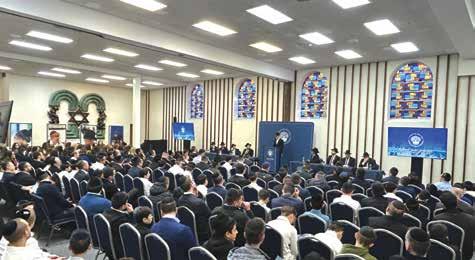
his longing to join the Netzach family. With Dani being in the final year of his own four year journey, Dani expressed his gratitude to the Mesivta for shaping him into the ben Torah that he is today and for the connections that he has formed with his rebbeim and friends that he knows will last a lifetime.
The program concluded with a short video presentation featuring various talmidim, alumni, parents, and reb -
beim, highlighting the distinctive qualities that personify this Mesivta. With this small glimpse, everyone saw how choosing Mesivta Netzach HaTorah will provide a four-year journey and a talmid’s lifelong path.
To watch our Open House video presentation and apply for the upcoming year, please visit netzachhatorah.org/openhouse.
On Thursday night, November 7, Ayelet Samerano, mother of 21year son Yonatan, who was shot and killed by Hamas, spoke alongside former Ashkenazi Chief Rabbi of Israel, Dovid Lau, spoke at the Young Israel of Woodmere. Hundreds of people showed up to hear Mrs. Samerano and Rabbi Lau speak about the difficult decisions they had to make post October 7. Mrs. Samerano was unsure whether to sit shiva for her son, Yonatan. If he is alive, it’ll be a segulah for him to have long life. If not, it will be an aliyah for his neshama, she said.
Rabbi Lau held in one case that a person should sit shiva for only two days; however, the person wanted to sit for longer. No one should have to confront such issues, the Rav said. Despite the troubles, Rabbi Lau announced that thanks to intelligence and DNA, and of course siyata dishmaya, there has not been one agunah in this war. Over one year after that fateful Simchas Torah when over 1,200 innocents were murdered by Hamas terrorists and over 250 captured, the Jew-
ish community keeps the voices of the silenced amplified and demands justice.
On Motzei Shabbos, November 10, the community gathered at Young Israel of Woodmere to hear from rescued hostage, Mia Schem, and her mother, Keren, who called her daughter “the strongest person I know.” Mia described 50+ days in captivity after having been shot in the right arm at point blank range and being taken hostage by Hamas terrorists at the Nova festival.
“I could have just given up,” she said, “but I had the will to live.”
Throughout this time, Keren traveled the world doing whatever she could to raise awareness of her daughter’s situation as well as the over 200 other hostages being held by Palestinian terrorists. She also went through diplomatic channels, such as reaching out to former French President Nicolas Sarkozy to see if he could use his Qatari business connections to help broker a deal. Mia holds a French passport. Sarkozy promised to do what he can.
For Ayelet and Keren, it was the sup -
port of the community that gave them strength and continues to do so. Ayelet was approached by Jews during her worldwide travels who have expressed their support and admiration for her. It is her who gives them the chizuk to go on.
Mia described the theatrics and lies propagated by Hamas during her captivity: the terrorists only pretended to treat the wounds they inflicted on her, told her what to say, and constantly told her she would die. Somehow, Mia’s mother knew she was still alive; in turn, Mia found the will to live.
When a hachnosas Sefer Torah that was planned for Mia was expected to have an overflow crowd, Keren found the strength to show up despite being barely able to get out of bed.
Young Israel of Woodmere as well as the members of the entire Five Towns community and beyond appreciated hearing from the Chief Rabbi and family members of October 7th victims. They drew support from and in turn showed support for our brothers and sisters in Israel. The Young Israel of Woodmere will
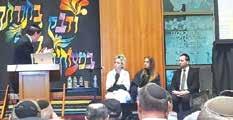
also be hosting student activist Shabbos Kestenbaum this season for a Shabbos Dinner with Friends on Friday night, December 13, Parshas Vayishlach. Mr. Kestenbaum is the lead plaintiff in a lawsuit against Harvard University alleging that the Ivy League school turned a blind eye to pro-Hamas protestors and turned a blind eye to endemic antisemitism on campus. He will discuss his path to student activism, the lawsuit against his school and how anti-Jewish sentiment runs rampant at American colleges, as well as the future for Jewish students on campus.
For more information and sponsorship information on Young Israel of Woodmere events, please contact: yiw@ yiwoodmere.org.


On November 11, over 500 Judaic and General Studies educators, from seven schools in the Manhattan, Queens and Long Island areas, gathered at the Hebrew Academy of Long Beach (HALB) for the annual Day of Learning. Spearheaded, managed, and funded by The Jewish Education Project for many years, and in collaboration this year with the Jewish Education Innovation Challenge (JEIC), this historic event continues to provide schools with high-quality professional development opportunities that would otherwise be out of reach. This year’s Day of Learning, led by Gary Pretsfelder, Senior Manager for Professional Learning and Growth in NY Day Schools at The Jewish Education Project, brought a fresh infusion of innovation to the program with its theme of meeting the needs of diverse learners in the classroom through student-centered, active strategies.
The full day program offered Limudei Kodesh and General Studies teachers and administrators effective, practical strategies to counter the “one size fits all” model of teaching so that teachers can better support the wide-range of students in their classrooms. The event featured a keynote address by Dr. Catlin Tucker, an expert in innovative classroom practices, who shared insights on how best to de-
sign strategies for engaging students with diverse learning styles and for shifting the classroom to more student-oriented, differentiated tasks. Following Dr. Tucker’s address, participants engaged in one of 30 specialized workshops, each tailored to specific grade-levels and subjects, in which they had the opportunity to experience Dr. Tucker’s approach in practice.
To support the ongoing implementation of these techniques, The Jewish Education Project also launched two cohorts of professionals who will continue their learning together in this area via Zoom over the coming months. The first group, designed for day school leaders, will be led by Dr. Tucker herself and will guide principals and curriculum leaders in how to integrate this methodology into their schools. The second group, led by Rabbi Shmuel Feld of the Jewish Education Innovation Challenge (JEIC) and Chani Richmond of Lomdei, will engage teachers of limudei kodesh on how to introduce these strategies in the their teaching of Chumash, Gemara, tefillah etc.
The Day of Learning was a valuable opportunity for educators to network, learn, and grow together. Participants left inspired and equipped with new tools to enhance student engagement in their schools, affirming the vital role The Jewish Education Project plays in supporting Jewish education across the region.





Federal agencies pass all sorts of regulations (thousands of them!). These are some of the regulations that are still on the books (HELLLLOOOOO Trump Administration!).
D Airline crew members are technically prohibited from blowing their noses on duty if it distracts them from their job. (Well, that makes perfect sense: “The plane went down because the pilot blew his nose” is a terrible look.)
D According to the FDA, it’s illegal to ship Limburger cheese by mail without special permits. The govern ment may not want to stop you from enjoying stinky cheese, but it does want to stop it from stinking up the mail trucks. (Can they add stinky political postcards to that list?)
D Under an agricultural regulation, it’s technically illegal to pay for pigs with cash in the U.S. You need to use checks or other payment methods. (Why is it the government’s chaziresher business how I pay for my pet pig?)

D Under federal regulation, possessing or selling feathers from migratory birds, like eagles or owls, is prohibited unless you have special permission. (All you guys with the fancy feathers in your hats, I hope the FBI doesn’t knock on your door on Shabbos morning. Now that they lost their number one target, they have lots of free time on their hands.)
D The USDA prohibits live poultry from being transported on airplanes “for the purpose of enjoyment or amusement.” (So the next time you go to Israel for Sukkos, you will have to leave your pet chicken at home… or, better, make some chicken soup the Shabbos before you leave.)
D According to U.S. Coast Guard regulations, any inflatable raft aboard a vessel must be labeled as “not intended for regular transportation.” (…Because otherwise you may decide to navigate the high seas on your flotation device.)
D It’s illegal to tie a goat to any federal building or property. (So all you guys who plan on working for the federal government, you are going to have to figure out what to do with your goat on erev Pesach when you run into your office to get rid of the Stella Dora cookies from your desk before yom tov.)
A contractor wanted to give a federal regulator a sports car. The federal regulator objected by saying, “My basic sense of ethics would never permit me to accept a gift like that.”
The contractor said, “I quite understand. Suppose we do this: I’ll sell you the car for ten dollars.”
The federal regulator thought for a minute and said, “In that case, I’ll take two.”

Everyone is trying to get a job now in the incoming Trump Administration. Washington is filled with federal agencies. (They have everything but the ABC agency.) Before you get a job though, let’s see if you know which federal agency is in charge of what. Match the agency with the issue that it is supposed to handle.
1. You are sitting on a plane between a guy chewing gum really loudly and another guy snoring like he hasn’t slept in three days. To add insult to injury, they don’t abide by the rule that the person in the middle is supposed to get the arm rests. You want that rule codified (passed into law).
2. You buy stock in a company that only sells left-handed spatulas. This company should have never been able to sell stock. Who do you complain to?
3. After a hurricane, who is supposed to be there to help?
4. You invent a revolutionary device –a coffee cup that never spills. Who do you call to make it officially yours?
5. You found out your “vegan” hot dog is 80% mystery meat. Who’s inspecting this stuff?
6. Your neighbor claims they’re building a “backyard rocket” to reach Mars. Who

Answers:
1-G (Federal Aviation Administration)
2-D (Securities and Exchange Commission)
3-H (Federal Emergency Management Agency)
4-I (United States Patent and Trademark Office)
5-B (United States Department of Agriculture)
handles the real space missions around here?
7. Someone asks you to take a small package back to the U.S from Mexico. The package consists of 3 pounds of white powder. Who do you call immediately? (Make sure not to touch the package!)
8. Your cousin’s cat has more Instagram followers than you and you think that someone is not playing by the federal rules. Who do you contact?
9. You are trying to figure out why it rains every time that you go on vacation. Which federal agency may have information about weather patterns like that?
10. Your family drives crosscountry to spend July in Yosemite Park. When you get there, you are notified that the park is closed for July. (Yes, that is so classic your family.) Who is in charge of national parks anyway?
A. DEA
B. USDA
C. NPS
D. SEC
E. FTC
F. NASA
G. FAA
H. FEMA
I. USPTO
J. NWS
K. NPS

6- F (National Aeronautics and Space Administration)
7-A (Drug Enforcement Administration)
8-E (Federal Trade Commission)
9-J (National Weather Service)
10- K (National Park Service)



By Rabbi Berel Wein
G-d appears to Avraham in the opening verse of this week’s parsha. How does G-d appear to him? The rabbis teach us that He appears to him in the form of a visitor there to cheer him in his illness and pain after the rite of circumcision. The Jewish value of visiting and cheering the sick stems from our imitation of this G-dly virtue as first revealed to Avraham. In this instance, G-d reveals Himself to Avraham through three Bedouin Arabs who are apparently searching for a place to rest, eat and drink.
The apparent Arabs are angels and messengers of G-d. It is one of the great attributes of the house of Avraham and Sarah that visitors can enter their home as Arab desert dwellers and leave as angels. It is these wayfarers that deliver to Avraham and Sarah the message of continuity and eternity of Jewish life. Sarah will give birth to Yitzchak after decades of being a barren woman.
Earlier, G-d informed Avraham of this momentous news directly. Yet to Sarah, the direct recipient of this blessing, He


somehow chooses to inform in an indirect manner through the unknown strange visitors that arrive at her tent and that she hospitably feeds. There is a great insight in this chosen method of G-d, so to speak, in delivering the message to Sarah through seemingly human auspices. G-d often, if not constantly in our times, talks to us through seemingly human messengers. If we are able to listen carefully to
Avraham, who heard the tidings from G-d directly, realized that the message was true and serious. Sarah had to believe what she thought was a human wish and therefore discounted it. But G-d demanded from her, as He does from each of us, that we pay proper attention to what other humans say to us. Perhaps in their statements and words we can realize that G-d Himself, so to speak, is talking to us.
G-d has many messengers and many ways of reaching us individually but we must be attuned to hear the messages that emanate from Heaven.
what others say to us, oftentimes, we will hear a divine message communicated to us through a human conduit.
I think that this also explains why Sarah was initially bemused by the words of the angel. She evidently thought that it was just a throw-away promise of a wandering Bedouin Arab and reacted accordingly. At the outset, she did not hear the voice of G-d in the words of the angel that addressed her. Therefore, she did not take those words seriously. G-d reprimands her for this attitude and asks, “Why did Sarah not take these words seriously?”
G-d has many messengers and many ways of reaching us individually but we must be attuned to hear the messages that emanate from Heaven. They should never be allowed to fall on deaf or inattentive ears and minds. To a great extent, this ability to listen to the otherwise unheard voice of Heaven is the measure of a Jew and of his ability to accomplish in life. Eventually, Sarah hears and believes – and through this, Yitzchak is born and Jewish continuity is assured and protected.
Shabbat shalom.


By Rav Moshe Weinberger
Adapted for publication by Binyomin Wolf
We know Chazal teach us that “the deeds of the Avos are a sign for the children” (see Midrash Tanchuma 9). This does not simply mean that we must learn from the lives of the Avos. It also means that we live with what they did and what happened to them every day. The events of their lives course through our veins and us at all times.
When Hashem appeared to Avraham at the beginning of the parsha, Chazal explain that He was fulfilling the mitzvah to visit the sick (see Rashi on Bereishis 18:1). We know Avraham was sick because it was the third day after giving himself a bris (Sota 14a).
The underlying principle behind how one fulfills the mitzvah of visiting the sick in halacha is lightening the burden of the individual’s sickness (see Shita Mikubetzes on Nedarim 41a). This has three elements: (i) helping the person with whatever he or she needs; (ii) praying for the person’s welfare in his presence; and (iii) asking the person how he is doing (Kitzur Shulchan Aruch 193:3). This is what Hashem was doing for Avraham. How do we see this visit as a sign in our lives now? How do we see that Hashem visits us when we suffer today?
Rav Mordeichai Yehuda Lubart, zt”l, a great talmid chacham and Gerer chassid who suffered through and survived the Holocaust, explains in his sefer Milchamos Yehuda that bris mila sanctifies G-d’s name in a similar way to when a Jew gives his life to stay true to his or her faith. He bases this on the Gemara’s statement that the pasuk, “For we are killed for Your sake all of the time” (Tehillim 43:23) refers to bris mila, which also involves the shedding of Jewish blood (Gittin 43b).
The connection between bris mila

and the self-sacrifice inherent in allowing one’s blood to be shed sanctifying G-d’s name is also apparent based on Aruch Hashulchan (Yoreh Deah 265:27), which explains that we do not say the celebratory Shehechiyanu blessing at a bris, even though we rarely get the opportunity to do this mitzvah because of the Jewish blood being spilled and the child’s pain. We cannot say Shehechiyahu because our joy at the bris mila is not complete. Bris mila, like sacrificing ourselves for G-d’s sake, is a fulfillment of “And I shall be sanctified among the children of Israel” (Vayikra 22:32).
When we go through a period of seeing Jewish blood being shed, just like Avraham Avinu went through when he drew his own blood at the time of his bris mila, we feel broken and sick, not only physically but emotionally and spiritually as well. We need encouragement, strength, support, and greater confidence. That is why Hashem appeared to Avraham after his bris, to help him with whatever he needed, and give him support, encouragement, and love. He gave
Avraham new life and a feeling of rejuvenation through His visit, after which Avraham felt strong enough to return to welcoming and serving travelers.
How do we see Hashem visiting us through all of the times where Jewish blood has been spilled throughout Jewish history, when we need encouragement, strength, and Hashem’s help more than ever? After the destruction of the first Beis HaMikdash, Hashem sent us the light of Purim, and then Chanukah. After the desolation and murder at the time of the Romans’ destruction of the second Beis HaMikdash, Hashem sent the light of Rabbi Akiva and his great disciple Rabbi Shimon Bar Yochai, who brought down the inner light of Torah into the world. Following the expulsion of the Jews of Spain, we were blessed with the light of the Arizal. After the brokenness of the Cossacks (Tach V’tat) and the Chmielnicki massacres of the mid-1600s, Hashem sent the Baal Shem Tov into the world.
And following the absolute decimation of our people during the Holocaust, no one could imagine even simple acts of
normalcy like getting married or having children, much less recreating yeshivos or learning Torah. Although we felt that we were “despised and isolated from men, a man of pains and accustomed to illness” (Yeshayahu 53:3), we still held onto the recognition that “All of this has befallen us, but we have not forgotten You, nor have we betrayed Your covenant” (Tehillim 44:18). Hashem began visiting and comforting us by opening up the gates of Eretz Yisroel to all Jews and enabling us to renew our life as a people in our own land, and thereby renew the study of Torah in the most remarkable way. He caused the revival of Torah learning and yeshivos in the Diaspora as well, not to mention the vibrant baal teshuva movement of the 1960s.
Yet even with all of those ways that Hashem has consoled us, the Holocaust was a level of destruction we have never known throughout all of human history. We therefore need a revelation of Hashem’s Presence never before seen in human history. We must beg Hashem to complete His appearance in our lives like He did with Avraham Avinu.
To counteract our unprecedented pain, we require an unprecedented expression of His Presence to comfort and heal us. We must daven that Hashem completes His visit by taking away all pain, healing all wounds, and drawing down into the world the light we have been waiting for throughout the millennia, the light of Moshiach, and the advent of the next world here on earth with the complete redemption.
Rav Moshe Weinberger, shlita, is the founding Morah d’Asrah of Congregation Aish Kodesh in Woodmere, NY, and serves as leader of the new mechina Emek HaMelech.


By Rabbi Shmuel Reichman

Iwill never forget what happened that night. After going to hundreds of lectures, and giving quite a few myself, I thought I’d seen it all. But I had never seen anything quite like this. To give you a little background, there are protocols for the introductory process of a speech. At major events, like the one taking place that night, there are always two microphones. The first is for the person who gets up to introduce the main speaker. After finishing his introduction, he walks off with his microphone, and the second microphone is waiting on stage for the main speaker. But not that night. That night there was only one microphone. After the introductory speaker concluded his opening remarks, the main speaker walked onto the stage and headed towards the podium. But as you already guessed, the introductory speaker was still holding onto the only microphone. At this point, the main speaker was expecting him to simply hand over the microphone so that he could begin his speech. But that’s not
what happened. Instead, the introductory speaker just kept hold of the microphone. He then took a deep breath and said something I will never forget.
When Hashem commands Avraham to leave his home and embark on a journey, Avraham is told “Lech lecha me’artzecha... Go for yourself, from your land….” (Bereishis 12:1). This directive is quite strange. Avraham is told where to leave from, but he is not told his destination. What kind of journey lacks a destination? Generally, the destination, not the starting point, is most important. For example, imagine being invited to a wedding, but instead of being told where the wedding will take place, you are told only where to leave from. Good luck getting to that wedding!
The fact that Avraham is not told his destination is not merely a practical issue; it is a fundamental challenge to the idea of a meaningful venture. In order to accomplish anything great, we must
first identify a clear target and then determine the path required to get there. One does not accidentally achieve spiritual greatness; it requires extreme focus and dedication. A great journey must begin with a clear goal and destination. As we say every Friday evening in Lecha Dodi: “Sof ma’aseh be’machshavah techilah,” the physical result originates first within the mind. Only when we first determine a clear destination can we achieve the extraordinary. If so, why wasn’t Avraham given a clear destination for his journey?
The answer to this question lies within the words “lech lecha .” While this phrase is often translated as “go for yourself,” it can also be translated as “go to yourself.” Avraham was commanded to embark on a journey toward “himself,” toward his true and ultimate self. In a genuine journey to the self, we don’t know the destination; we don’t
know where it will take us. All we know is where we’re leaving from, where we are right now. Only once we arrive can we retroactively see where the journey was taking us all along. Of course, we have goals and proposed directions, but anyone who has achieved anything of substance knows that the vision they once had is nothing like the actual journey they took. The goals create the process, but the actual journey transcends the limited goals that initially motivated the journey.
The inability to fully understand the destination of one’s own growth can be compared to a child’s inability to grasp a complex scientific or spiritual concept. Imagine explaining to a young child the relationship between quantum mechanics and general relativity, or the unique connection between the physical and spiritual world, or the different approaches to a complex Gemara sugya . The concepts would be completely beyond the child’s comprehension, as his limited intellect cannot grasp such
sophisticated and abstract ideas.
The same is true for each of us: imagine meeting a younger version of yourself and explaining all the things you will eventually accomplish, all the ideas you will learn, and all the experiences you will have. Your younger self would simply be unable to grasp the full meaning of this conversation. Now imagine instead that your older self does the same to your present self. The same would happen; you would not even begin to understand all that you will eventually become. You can have lofty goals and a clear direction, but that simply creates the journey. What will actually happen is a mystery. Therefore, to genuinely venture on the path toward your true self requires a leap of faith into the unknown, ready to embrace whatever future Hashem has in store for you.
This is why Hashem didn’t give Avraham a clear destination. In a journey to the self, all that we know is the starting point; the destination remains to be discovered. We don’t know what we’ll find along the journey, the challenges we’ll face, what people will think, or if we will even succeed. To embark on such a journey, we need to step outside our comfort zone, overcome our fears, and take
the unpaved and uncharted path, the path toward greatness. Avraham was not the only one entrusted with a lech lecha journey. Each of us is entrusted with this mission as well – each one of us must embark on our own lech lecha journey to our ultimate selves.
There is probably something bothering you, something in the
needs an ending; unless a story goes somewhere, it’s pointless. The purpose of a setup is to lead towards a conclusion, towards a destination. A story without an ending, without a purpose, is not a story worth telling.
The same is true for our lives: we need a destination. We are all part of a larger story, but we’re also writing our own individual stories. Hashem created us in this world with unlimited
In order to accomplish anything great, we must first identify a clear target and then determine the path required to get there.
back of your mind making you a bit uncomfortable. Did you forget something, is there something missing?
Perhaps it’s the fact that the introductory story had a setup but no punchline; a beginning, but no conclusion. Did you think I forgot about that?
Everyone will agree that a story
potential, but that was only the “setup,” the beginning of our story. Without a purposeful direction, a clear goal, and a deeper understanding of who you are and who you are meant to be, the setup lacks its true meaning. We need to make this a meaningful journey, a story of growth, creativity, and contribution.
And while the ultimate destination remains unknown, the journey towards it is the essence of our lech lecha mission.
Rabbi Shmuel Reichman is the author of the bestselling book, “The Journey to Your Ultimate Self,” which serves as an inspiring gateway into deeper Jewish thought. He is an educator and speaker who has lectured internationally on topics of Torah thought, Jewish medical ethics, psychology, and leadership. He is also the founder and CEO of Self-Mastery Academy, the transformative online self-development course based on the principles of high-performance psychology and Torah.
After obtaining his BA from Yeshiva University, he received Semicha from Yeshiva University’s RIETS, a master’s degree in education from Azrieli Graduate School, and a master’s degree in Jewish Thought from Bernard Revel Graduate School. He then spent a year studying at Harvard as an Ivy Plus Scholar. He currently lives in Chicago with his wife and son where he is pursuing a PhD at the University of Chicago.
To invite Rabbi Reichman to speak in your community or to enjoy more of his deep and inspiring content, visit his website: ShmuelReichman.com.

By Rabbi Avrohom Sebrow
The Gemara in Bava Basra (134a) relates that Hillel the Elder had 80 students. Thirty of them were of the stature that they should have merited the Divine Presence descend upon them as it did on Moshe Rabbeinu. Nevertheless, at that point in Jewish history, there was no longer any prophecy. The generation needed to be sufficiently righteous that there should be individuals with that level of Divine inspiration. Yet, according to Ben Ish Chai, these students were so excellent that had they lived at the same time as Moshe Rabbeinu, they may have achieved the same atmospheric level of prophecy.
Another group of 30 students was of such great stature that it was fitting that the sun should stand still (as it appears to us) for them as it did for Yehoshua Bin Nun. The remaining group of 20 students was somewhere in the middle of the first two groups.
The greatest of all Hillel’s students was Yonasan ben Uziel. When he studied Torah, birds flying overhead were immediately scorched. It is interesting to note that the Gemara implies that this phenomenon did not occur while Hillel himself was studying Torah. Rebbe Menachem Mendel of Kotzk explains that Hillel achieved a higher level of greatness than his student. The birds could have been scorched when he learned as well. However, he could conceal the incredible power that his Torah contained.
A visitor to Radin on Tishah B’Av once watched the Chofetz Chaim closely. He wanted to be inspired by the Chofetz Chaim’s recital of Kinnos. However, to his surprise and consternation, the great tzaddik recited Kinnos in the same manner as everyone else. Yet, later that evening, he passed by the Chofetz Chaim’s home and witnessed his uncontrollable sobs. The Chofetz Chaim didn’t want to demonstrate
extra piety over anyone else in public.
If Yonasan ben Uziel was Hillel’s most outstanding student, who was on the other end of the spectrum? Rabban Yochanan ben Zakai. He was Hillel’s “worst” student. Yet we find that before Hillel passed away, his students had entered his residence to visit him. Rabban Yochanon Ben Zakai remained in the courtyard. Upon noticing Yochanan Ben Zakai’s absence, Hillel proclaimed, “Where is the most diminutive of you who is a father in wisdom and a spiritual father of all future generations.” Rav Chaim Kanievsky explained that, in truth, Rabban Yochanon ben Zakai was initially the most minor of students, but through super-human perseverance and determination, he excelled.

dents? Many times, a Rebbe might feel more satisfied by having a give-and-take with the smartest and brightest kids in his class.
“Conversely, can you imagine if Rabban Yochanan ben Zakai sat dejected in class? After all, there were 79 students better than him! Why should he even bother? What if he had decided to give up on his studies, then what would Torah look like today?”
But Hillel taught all his talmidim, from the strongest to the weakest. He did
Can you imagine if Hillel had decided to focus only on his most outstanding students?
When Hillel became sick, Rabban Yochanan ben Zakai assumed the office of Nasi, the leader of Klal Yisrael, at the time of the Churban. He had five outstanding disciples. Among them were Rebbe Yehoshua and Rabbi Eliezer. They, in turn, taught Rebbe Akiva. Rebbe Yehuda HaNasi, the redactor of the Mishnayos, studied under Rebbe Akiva’s students. The Talmud that we have today can be traced directly back to Rabban Yochanan ben Zakai. Yet we cannot even single out by name most of Hillel’s other students.
Rav Moshe Chait, zt”l, once remarked, “Can you imagine if Hillel had decided to focus only on his most outstanding stu-
not ignore student number 80. Further, Rabban Yochanan ben Zakai didn’t give up in the face of stronger talmidim. He persevered until he became the leader of all Klal Yisrael.
Steve Moss is a credit risk manager for a multinational financial services firm. During the summers, Steve coaches archery at a camp in New Hampshire. Understandably, most kids do not practice their archery skills during the year. The summer is usually the only time they have to learn and master these skills. Consequently, their archery performance significantly reflects the coach who has but a few short weeks to teach them these skills.
A highlight of his summer is the Robin Hood Invitational Tournament, where many camps compete in archery. Almost invariably, Steve’s camp wins the tournament. Steve explained that the tournament format is that the top six archery scores are counted in any age group. Other camps may have one or two superstars in each age group. Their coaches focus on the kids with the most latent talent. After the first- and second-ranked campers compete, there is a precipitous decline in the scores of the lower-ranked archers. However, Steve focuses on all the campers. In any given age group, his first- and second-ranked campers may score worse than similarly ranked archers from a different camp. Yet he always wins with “bench”: positions 3, 4, 5, and 6. Other coaches in the tournament tend not to focus on those campers who don’t seem to have the knack for archery. However, in Steve’s group, the lower-ranked members carry the team. This philosophy of focusing on the weaker students ensures his camp’s victory year after year.
(Years ago, as a vice-president with American Express/Shearson Lehman Hutton, Steve Moss directed a donation of a truckload of computers and accessories to be delivered to Yeshiva Chofetz Chaim. One of those computers had a full-height 10-megabyte hard drive!)
Rabbi Avrohom Sebrow is a rebbe at Yeshiva Ateres Shimon in Far Rockaway. In addition, Rabbi Sebrow leads a daf yomi chaburah at Eitz Chayim of Dogwood Park in West Hempstead, NY. He can be contacted at ASebrow@gmail.com.

The re-election of President Trump has sparked new interest in the blessing that is recited upon kings. Do we recite a blessing over President Trump? Is it just kings who have life or death in their hands, or is it even U.S. presidents?
The Shulchan Aruch (OC 324:8) rules that on Jewish kings one recites the blessing, “Baruch ata Hashem, Elokainu Melech ha’olam sh’chalak mikvodo lirayav.” On kings of the nations of the world one recites the blessing, “Boruch sh’nasan mikvodo l’basar vadam .” This is based upon a passage in Brachos 58a. The blessing, it seems, is recited with shaim u’malchus – mentioning the Name of G-d as well as mentioning His Kingship over the world.
How Often
But how often is this blessing recited? Now that it was announced that Jared will serve again in an advisory capacity, what if you happen to be Jared
By Rabbi Yair Hoffman

and Ivanka? Do you say it every day?
It would seem that the blessing is only made once in every thirty days, according to a quote of the Raavad found in the Orchos Chaim.
It is also interesting to note that in the Sefer Chasidim (#950) there is a limitation placed on this mitzvah. It seems that if one never saw the king (or president) then one should try to go see him. If, however, he had already seen him, the Sefer Chassidim writes, then he should not be mevatel from his Torah studies.
If Ivanka Runs…
What happens if, in the future, Ivanka Kushner, the president’s popular daughter, chooses to run and wins? Which version of the blessing would be recited – the first version for Jewish kings or the second version for kings of the nations?
The Sho’el v’nishal (OC Vol. I #73) rules that if that person were to follow
the ways of the Torah, then the first version is recited. Otherwise, it would be the second version.
Trump
What would be the halacha if the president were to forgo high-end clothing and were to try and go incognito, such as in overalls?
The Kaf haChaim 324:33 cites numerous poskim who state that the blessing was only enacted when the physical manifestations of that kavod are present. The Halacha Brurah (Vol. XI p. 305), Rav Ovadiah Yosef’s son, rules that one does not recite the blessing in such a situation with shaim u’malchus – but just the words themselves.
Ashkenazic poskim do not cite this caveat. One should check with one’s own rav or posek.
Does He Have To See Him?
The Debreciner Rav rules that if
one saw the president on television, the blessing is not said. Indeed, one does not even say it without shaim u’malchus. Rav Dovid Yosef write that one does not actually have to witness the president or king. Even if one was just able to see his entourage and knew that he was there, that would be sufficient. It is for this reason that even a blind person may recite this blessing when he feels that the president is present. If he does not actually feel it, but is merely told that the president is here, then he does not recite the blessing (p. 308).
Are Presidents Like Kings?
Rav Ovadia Yosef, zt”l, ruled (Yechave Daas 2:28) that the blessing is recited as long as the person in charge can either execute or pardon someone from execution. He cites the Radvaz (Vol. I #296) as well as the Orchos Chaim (Hilchos Brachos Siman 49) to this effect.
Rav Dovid Yosef, shlita, in his Hala-
cha Brurah (Vol. XI page 306) writes that one recites the blessing with shaim u’malchus even on a democratically elected leader of a limited term. This is true only as long as his pardoning cannot be overruled.
What about a president who doesn’t wear royal clothing? Rav Ovadia Yosef, zt”l, in his Yabia Omer 8:22:25) writes that when the President Richard Nixon flew to Israel, the blessing was recited without shaim u’malchus . It seems, however, that this concept has evolved a bit, taking into account that in Western countries, kings and leaders just don’t wear royal clothing anymore. Thus, Rav Dovid Yosef rules that even if the king is not wearing specialized clothing but is wearing respectable clothing and is surrounded by other significant people, then a blessing is made with shaim u’malchus.
Rav Vosner in Shaivet HaLevi I #35 rules that shaim u’malchus is recited on the president. The Debreciner Rav ruled (Be’er Moshe Vol. II #9) that shaim u’malchus is not recited. Rav Moshe Shternbuch (Teshuvos V’hanhagos Vol. II #139) rules that the temporary nature of the presidency is what would disqual-
ify it from the shaim u’malchus aspect of the blessing.
The Gemara explains that one should actually make an effort to see kings in order to be able to distinguish between Jewish and non-Jewish kings. Rashi explains that the reference is to
It is for this reason that even a blind person may recite this blessing when he feels that the president is present.
Melech haMashiach when he arrives. Seemingly, the reason is so that we can better appreciate Moshiach when he finally arrives and the chessed that Hashem has done for us.
The Rambam seems to imply a different reason. The Gemara (Megillah 15b) tells us that Esther was punished
when she went to see Achashveirosh and she reached the outer hall. The Shechina was no longer with her, and she noticed the deficit and recited the verse in Tehillim (22), “Hashem, Hashem, why have You abandoned me?” One of the questions of self-examination that she asked herself was that perhaps she had incorrectly referred to Achashveirosh disparagingly. She then immediately corrected herself. The Rambam explains in his commentary to Esther (5:1) that Hashem had given of His Kavod to flesh and blood, and it was wrong of her to speak of him in a pejorative manner. It seems from this Rambam that the reason for the bracha is to take note of the honor
which Hashem endowed a human being.
To Amalek
It is interesting to note that when Kaiser Wilhelm came to Yerushalayim on a Shabbos, the 13th of Cheshvan in 5659, they told Rav Yosef Chaim Sonnenfeld, zt”l, of his imminent arrival. He was to arrive at 3:00 PM. Yet the Rav did not wish to greet him. They inquired as to why not. He responded that he had a tradition from the Vilna Gaon that the German people were safek Amalek and that it is forbidden to recite the blessing of, “Baruch shenasan mikvodo l’basar vadam.”
One of my rebbeim, a Holocaust survivor, had related this incident to me some thirty-five years ago and wondered, “In light of the Holocaust, it may no longer be a safek .”
This article should be viewed as a halachic discussion and not practical advice. The author can be reached at yairhoffman2@ gmail.com.

By Michael Milgraum
Laughter is a fascinating phenomenon. It is not just an emotion, nor is it simply a chosen behavior. We can feign a true laugh, and we often do, but such expressions are weak and shallow imitators of the real thing.
True laughter seems to have a life of its own. It is unpredictable. What makes one person laugh might elicit no reaction in another person.
Laughter arises from the unexpected, the paradox, shifts of perspective, and sudden discoveries. It enlivens us, connects us with others, and helps us to let go and live in the moment.
Laughter features prominently in the earliest roots of the Jewish people. Hashem spoke to Avraham at the age of 99, giving him the commandment of circumcision and telling him that Sarah, who was 89, would give birth to a child. Upon hearing this news about Sarah, Avraham “threw himself on his face and laughed,” because he was in wonderment that he and Sarah would have a child at such an advanced age. A little later, this news is brought to Sarah by visiting angels. She also laughs upon hearing this news. Given this history, it should not be surprising that the child who was later born was named Isaac or Yitzchak, “he will laugh.”
What is all this laughter surrounding the early formation of the Jewish people? What does it say about Avraham and Sarah, Yitzchak, and the Jewish sensibility?
At the beginning of Parshas Lech Lecha, Avraham is given a mission by Hashem. He is told to separate from all that he has known and to journey forth to an unnamed land, which G-d will show to him. Hashem tells him that, as a reward for this faithful act, Hashem will make him into a great nation. Avraham sets forth and starts to teach others about the one G-d. Avraham accepts many converts and acquires great wealth, but one thing, the most precious thing, eludes him: Sarah is unable to conceive. Sadly, at her advanced age of 89, this appears impossible.
It is at this point that Hashem heralds the news: What was thought to be impossi-

ble is indeed possible, and Hashem promises Avraham that it will come to pass, a year hence. This is the “punchline” that causes both Avraham and Sarah to laugh. When this “impossible” pregnancy and delivery come about, they name their child after the very laughter of amazement that they engaged in a year before.
What do we make of the juxtaposition of Avraham’s laughter and the surrounding events? To me it means simply this: The Jew laughs at doomsayers who claim that salvation is impossible. He knows that he and his fathers have, countless times, to use a phrase of the Torah, been “carried on eagle wings,” transporting
ishly impels us to follow our physical urges, regardless of who is hurt. The Jew laughs because this voice, which at times can seem so irresistible, is in actuality more like an annoying fly, which, if we turn our attention away from it and towards a higher calling, will buzz away in another direction, leaving us undisturbed.
The Jew laughs in delight when roadblocks that seem so daunting eventually vanish, paled into insignificance by the glory of He who not only protects us, but who put that roadblock in our way for a reason. It was there to challenge us, to cause us to grow, to force us into some humility or some other reason. The Jew laughs because, in G-d’s light, circumstances that might seem bad are suddenly perfused with good.
Not only does the Jew laugh at those who say that the laws of nature will thwart our survival, the Jew also laughs at an inner voice.
In truth, Hashem had already hinted to Avraham that He would perform miracles for him. Earlier, Avraham conversed with Hashem about his lack of progeny, and we are told that Hashem took him “outside” and told him to gaze towards the heavens and try to count the stars. “So,” Avraham was told, “shall your offspring be.” Rashi refers to a midrash which says that this taking outside is actually taking Avraham beyond the Universe itself and telling him that he will not be bound by the laws of nature. Now this hint has come to fruition, and Avraham recognizes this with his laughter.
them above danger and ensuring their survival.
Let us not sugarcoat this. Countless Jews have suffered cruel deaths. Jewish history is filled with suffering, loss, and anguish. But the promise has been upheld. The Jewish nation has and will remain great and survive, as a beacon that the dictates of the soul and spirit are much more important than the supposed limitations of this physical world.
Not only does the Jew laugh at those who say that the laws of nature will thwart our survival; the Jew also laughs at an inner voice. It is the voice that self-
Infants develop across some predictable stages. They cry before they learn to smile, and they learn to smile before they learn to laugh. I once heard a psychological theory that the child’s first laugh arises from a complex event. In that event, the child first experiences a stimulus that shocks him and makes him want to cry. But then, in the next instant, the child perceives that this stimulus is not really a threat. The wail of crying gets interrupted. A smile takes its place, and the air that would have been emitted as a cry is transformed into a less forceful staccato outlet of air with intermittent vocalizations, which we call a laugh. Interestingly, the Hebrew word for laugh, tz’chak, does have a staccato sound to it.
Thus, the first laugh can be understood as an interrupted cry. The disaster is suddenly transformed. The world can change in an instant. And if we remember to laugh, drawing from a spirit deep inside, it helps us to see everything differently.
Michael Milgraum is an attorney, psychologist and author, who has a private psychology practice in Kensington, MD. His most recent book “To Seek a Larger Spirit: Reflections of a Jewish Psychologist,” is a collection of his poems about psychology, Torah and spirituality.








Within a 24-hour timespan last week, we attended a wedding, participated in sheva brachot, celebrated a bar mitzvah, and cut a young boy’s hair, Tuvia, named after my late brother.
A snapshot of a typical weekend in Israel for “old people”? No.
The wedding was like no other that we have ever attended. Similar to all Jewish weddings, high-end to simple, it was meaningful, spiritual and beautiful. This one had that and more.
The venue: a museum courtyard in Jerusalem. The guests: a sample of all of the richness of the religious spectrum that makes our People unique and powerful. Taking note of just the head coverings worn by the men and women alike, one could not help but take a moment to respect the variables that can be created when seeking to identify who you are and what it is that is important to you.
Dreadlocks, scarves, hats, kippot in every shape and form from sruga to silk could be found. Hats from big-brimmed yeshivish to kashketels (small caps with short brims) worn in Anatevka. That’s just the men.
The women’s head coverings went from none, to shaitels and falls, to magnificent head wraps consisting of skyscraper layers of scarves built high to enhance the wearer’s beauty and regal carriage.
The venue was outdoors, and though we are in Jerusalem and live in a moderate climate, when it gets cold here, it’s freezing. Despite my best efforts to layer, I could not force myself to stay much past the two-hour chuppah which highlighted the richness of the experience. Mazal tov to Aaron and Tzipporah.
The couple’s community of friends mostly reside in the Nachlaot enclave, a very old neighborhood that abuts the shuk. We live in this old, broken charming corner of Jerusalem. Peppered among the ancient and the decrepit are refurbished buildings that allow new and modern to creep in. We don’t even have our own internet lines but need to borrow from neighborhoods close by.

By Barbara Deutsch

Our home is among the refurbished; we love it.
Friday night found us – remember, we are old – making our way through the broken alleys of this historic neighborhood to a community center built in the early twentieth century by Moshe Montefiore called Ohel Moshe. The broken, cobblestone streets, lean-to houses, cats,
Bar mitzvah milestones are always happy times. Early Shabbat morning roaming Ha Rova in the Old City looking for the simcha hall was not fun. Here we go again, stumbling around, going up and down the steep staircases; it was quite the challenge for these old creaky knees. Anyone we asked had no idea where we were talking about, and it seemed like we would
In the space of two days, we got to experience firsthand the diversity and beauty that makes Jerusalem and the people living here so unique.
so many cats, no streetlights and the cold made it one interesting journey to the sheva brachos venue.
Despite the fact that the caterer did not deliver the bulk of the menu, we felt satiated by the energy and joy of the gathering. Friends of every Jewish stripe were among the celebrants who randomly wandered in to participate.
The love of the young couple, the allnight singing, and the beautiful universal words of Torah kept us there well past our bedtime.
have to go back home while we still had the energy to do so.
Along the Old City walls, for the uninformed like us, there are beautiful homes that overlook Har Habayit. A young family, a mother, her mother and two daughters walked out of one of the doors. Seeing our exhausted faces and frustrated demeanor, she asked if we needed help; we had been wandering helplessly for over a half hour.
We explained our dilemma, and the mother assured us she could help, instructing the girls to take us there.
They did, right to the door. It turns out that had we gone through the Arab Shuk, which we do all the time, and made a quick right, we would have been right there. It’s a magnificent glass venue overlooking the Kotel!
This bar mitzvah had special meaning for us, as we were there when the parents met, courted and married; a Morasha couple!
The Bar Mitzvah boy did his job well, and the hard, pelting rain accompanied us back home.
Mazal tov Zev!
Motzei Shabbos found us at our niece’s home in Mattesdorf; it’s a deeply charedi part of town. Faigy and Tzvi live there with their beautiful large family. The last three children are named for my dad, mom and brother, a very meaningful tribute to me and our family.
It’s not easy for Faigy to stand for long periods of time so she conducts business from a rolling lounge chair. The older kids carry out her detailed and targeted instructions.
Tzvi’s parents came from Bnei Brak for Shabbos to help with the preparations for the beautiful Melaka Malka The spread was sumptuous and delicious. Tzvi’s parents had never eaten a bagel in Bnei Brak.
In the space of two days, we got to experience firsthand the diversity and beauty that makes Jerusalem and the people living here so unique. Every kind of Jew has a home for his body and her soul.
The traffic on Erev Shabbos coming into Jerusalem has increased dramatically; word is that since October 7, more and more are keeping Shabbos. That’s got to be a good thing.
Barbara Deutsch is the former associate principal at HANC, middle school principal at Kushner, and Dean of Students at Yeshiva of Flatbush. A not-retired educator, she is trying to figure out life in Israel through reflections on navigating the dream of aliyah as a wife, mother, grandmother, great-grandmother and friend.


As Shabbos was fast approaching last Friday, November 8, scores of family and friends made their way to Har Herzl to pay their last respects to Chizkiyahu Guy Shabtai, a teacher at Horev Yeshiva, where I am employed. (The name Chizkiyahu was added before his passing.) In the final battle of his life, he succumbed to the cruel wounds he sustained while serving in Lebanon.
At the gravesite, Guy’s wife Re’ut relayed the story of how, only a few weeks before as she had been walking past Har Herzl on Shabbat with her three small daughters, she explained to them that “this is where heroes come to be buried, but never did I think that only a few weeks later it would be you we’d be burying.”
The funeral was not the first I, or many of those there, had attended over the last year. We stood between graves so current, I couldn’t but help feeling their fresh dates screaming at us in protest. To my right, August 8; to the left, September 10; in front of me three rows of recently lost youth. We were surrounded by the fresh graves of boys in their twenties, of fathers in their thirties and forties. These losses have left gaping wounds across Israeli society; the number of young widows and their orphaned children is staggering in number.
In front of us were graves concreted over, but too fresh to have yet been marked by headstones. While we waited for the cry of the army cantor to begin the wail that is the Kel Maleh Rachamin, I couldn’t take my eyes off the almost 90 bags of orange sand stacked next to Guy’s final resting place. Surely those were for more than one funeral, I thought to myself. But, no! Within moments of the coffin’s arrival, the combined weight of 1,350 kilograms (almost 3,000 pounds) of sand had covered Guy for eternity. The battle in Lebanon claimed the
By Rafi Sackville

lives of six soldiers. After weeks of clearing out houses in Lebanese villages, the last house was occupied by Hezbollah fighters. The ensuing, deadly battle, eulogized Guy’s father-in-law, was not a battle for the North or the South. “No, it was our second War of Independence.”
The principal of Horev’s junior high school, Zvika Dantalski, was one of the soldiers who helped evacuate Guy. Since I began working in Horev nine months ago, Zvika has spent more time doing reserve duty than he has been in school.
After his last release from the army, the yeshiva gave him extended leave to spend with his family.
This has been a familiar trait of the yeshiva since the start of the war; theirs is the embrace and warmth of a family. Indeed, the sadness of Guy’s loss demands viewing through the prism of Horev Yeshiva and the disproportionate suffering it has experienced these last few weeks.
For one, Horev has a near 100% army conscription rate. The belief of defending our beloved country is never lost in the message conveyed to students, not only by their rabbis and teachers but via their
families and communities. Horev is an organization dedicated to raising young men to study Torah and to work. This dedication, nurtured through school, then later serving in the army, comes naturally to them.
So great have the recent losses of alumni been that an email sent to staff on October 29 even found its way into the media. It contained a list of six family addresses of alumni family sitting shiva at the time the email was sent out. It also included a list of four wounded soldiers – alumni and, in Guy’s case, a member of staff.
I used to marvel at Guy. For one, he was in peak physical shape. At 39, Guy was tall and thin, ate nutritiously, and looked like the professional footballer he had once been in his youth. He picked up his fluency in English after being granted a sports scholarship in the U.S.
He was modest. It was a character trait he didn’t have to work on; it came naturally. Then there was his smile, which was radiant, warm and sincere. It was a smile that lingered whenever he’d leave a room.
There was more to Guy than his sporting prowess. While in the States, he embarked on a spiritual journey that eventually led him back home to Israel, where he began learning in yeshiva.
He was blessed to find a strong connection to Yiddishkeit through his maternal uncle. It was he who encouraged him to study full time in yeshiva.
Guy later said, “At first, I felt disconnected and confused. It was difficult for me to study, but rabbis and friends strengthened me. I studied at the yeshiva for five years.”
Guy married Re’ut ten years ago and began a family. He wanted to continue studying Torah, but his rabbis convinced him to seek a profession. He obtained a teacher’s license, which he put to use in the English and Math departments at Horev. Throughout his time teaching, he continued to maintain daily Torah study.
Surrounded by leafy paths, Har Herzl does not share the clinical, cold feel of other graveyards. As difficult as it is to attend such saddening occasions, the gentle hills of the final resting place of our war heroes has a feel of comfort about it. Lying just up the road from the Shaarei Zedek hospital, and only meters away from the Yad Sarah building on Herzl Boulevard, it encompasses a quality of Jewish life that brings us together as a family, of caring and embrace.
Guy’s loss is one of over 850 military personnel losses we have felt since the start of the war. Their families are our families. Their losses belong to us all. We pray that Guy will be the last sacrifice we have to pay.
Yehi zichro baruch.
Rafi Sackville, formerly from Cedarhurst, teaches in Yeshivat Horev in Yerushalayim.


Acollective sigh of relief was heard across Israel as the results of the U.S. presidential election were declared. But we cannot rest on our laurels. At this critical juncture, Israel must carefully assess the challenges it faces in the immediate term, as the lame-duck Biden administration completes its term. And it must set goals for the next four years to ensure that the opportunity Donald Trump’s return to the White House affords us is not squandered.
To understand the immediate requirements, we need to remember what happened during Barack Obama’s final months in office.
No longer concerned about winning an election, in December 2016, the Obama administration decided the time had come to punish Israel for opposing its nuclear appeasement of Iran and for rejecting its efforts to establish a Palestinian terror state. That month, America’s U.N. ambassador Samantha Power drafted an anti-Israel resolution that declared all Israeli presence beyond the 1949 armistice lines—including the Western Wall in Jerusalem—illegal. Power then pawned it off

By Caroline B. Glick

on other Security Council member states to sponsor and abstained from the vote, ensuring the passage of what became U.N. Security Council Resolution 2234.
Resolution 2234 was the most anti-Israel resolution ever passed in the Security Council. It effectively called for an international boycott of all Israeli activities beyond the 1949 armistice lines. But 2234 wasn’t meant to be a standalone event.
The Obama team planned to pass an additional resolution that would set out a timetable for Israel to agree to a Palestinian state in Hamas-controlled Gaza, all of Judea and Samaria and eastern, southern and northern Jerusalem. The resolution was supposed to include sanctions on Israel if it failed to capitulate within the set time schedule.
Israeli Prime Minister Benjamin Netanyahu worked with Trump’s transition team to scuttle it. Netanyahu and Trump’s advisers appealed to Russian President Vladimir Putin, who signaled that Russia would veto the resolution. Stunned, the Obama team angrily shuffled away.
There is good reason to assume that in the two and a half months before
Trump returns to office, the outgoing Biden team intends to get that longshelved resolution passed.
The Biden team may also initiate a resolution requiring Israel—on pain of Security Council sanctions—to accept a ceasefire in Gaza that will leave Hamas in power, a ceasefire in Lebanon that will leave Hezbollah on Israel’s northern border and in charge of Lebanon, or both.
Now as then, Netanyahu must work with Trump’s team and Israel’s many allies in the Senate and House of Representatives to block these anticipated moves.
Beyond punishing Israel for not bowing to the administration’s yearlong demand for capitulation, the purpose of the Biden administration’s anticipated U.N. ceasefire resolution is to prevent Israel from winning the war and to block the Trump administration from supporting an Israeli victory. The Biden team is expected to reinstate Obama’s effort to pass the Palestinian statehood resolution in order to prevent both Israel and the incoming Trump team from abandoning the failed and destabilizing “two-state” chimera.
In other words, the purpose of the U.N. operation is to prevent Trump from adopting his own policies and prevent Israel from securing itself.
Blocking the Biden administration’s anticipated moves is Israel’s most pressing diplomatic challenge. But obviously, they are also a means to enable Israel to win the war it is currently fighting. As to the war, Israel must move deliberately to achieve its strategic goals on all fronts—and particularly in Gaza, Lebanon and Iran.
It is to this end that Netanyahu fired Israeli Defense Minister Yoav Gallant on Tuesday.
The Biden administration began micromanaging every aspect of Israel’s war effort immediately after Oct. 7, 2023. It sent American generals to Israel Defense Forces headquarters, where they made “suggestions” that made no sense but to which Israel had to listen—if it knew what was good for it.
The administration began slow-walking critical military supplies to Israel last December, forcing IDF officers to justify nearly every bullet and tank round ex-
pended. It threatened sanctions to block Israel from taking any action that would fundamentally shift the strategic balance in Gaza, and throughout the region, in its favor. It blocked a congressional effort to pass a law sanctioning International Criminal Court officials for waging lawfare against Israel, and so effectively greenlighted ICC prosecutor Karim Khan’s bid to issue arrest warrants against Netanyahu and Gallant.
The Biden team delayed Israel’s action in Rafah for months by threatening an arms embargo and by forcing Israel to maintain futile hostage talks with Hamas’s state sponsors Qatar and Egypt until they reached their inevitable, failed conclusion.
The administration spent a year pressuring Israel to agree to surrender sovereign territory to Hezbollah in exchange for a respite from the Iranian proxy’s missile war. The U.S. offer, if accepted, would be a strategic catastrophe for Israel, keeping Hezbollah’s forces intact, fully armed and poised along Israel’s border just steps away from communities they were trained to overrun and massacre.
The administration continues to pressure Israel to leave Iran’s regime, nuclear installations and oil platforms intact.
The Biden team’s success to date in preventing Israel from defeating its foes owes in large part to its exploitation of the Israeli security brass’s institutional and ideological opposition to Netanyahu, his coalition partners and voters. Gallant was the central figure in the administration’s divide and conquer effort to block Israel from taking action that would change the strategic balance of power in the region.
During the eight months that Gallant’s fellow retired generals Benny Gantz and Gadi Eisenkot served with him in Netanyahu’s War Cabinet, Gallant colluded with them and the administration to block government plans to order operations like the seizure of Rafah—that would pave the way to the dismantlement of Hamas’s military forces and ending its political and economic grip on power.
It was only with the resignations of Gantz and Eisenkot in June that Netanyahu was able to overrule Gallant and order the invasion of Rafah, cutting Hamas off from the rest of its state sponsors. Since then, working with the IDF Chief of General Staff Lt. Gen. Herzi Halevi, Gallant opposed, slowed and watered down—but was unable to block—Israel’s ground operation in Lebanon.
Gallant and Halevi blocked the government’s plan to task the IDF with dis-
tributing food, medicine and water to Gazans even though it is the only way to dismantle Hamas’s continued political and economic control over the area.
Gallant and Halevi opposed the operation to blow up the beepers of Hezbollah operatives, which neutralized Hezbollah’s senior and mid-level command structure.
Gallant tried to block Israel’s move to eliminate Hezbollah chief Hassan Nasrallah by insisting that Israel provide advance notification to the administration, knowing full well that the Biden team would try to block the operation.
dan River. The second is the U.N. system. The final vulnerability is Israel’s strategic dependence on U.S. munitions.
Since Oct. 7, any residual public support for the establishment of a Palestinian state west of the Jordan River has disappeared (outside the fever swamps of the radical left). The onslaught from Gaza, which has been an independent Palestinian state since 2005, and the near-unanimous support the atrocities enjoyed among Palestinians in Judea and Samaria made clear that a Palestinian state is not a solution to anything. Rather, it is an exis-
In other words, the purpose of the U.N. operation is to prevent Trump from adopting his own policies and prevent Israel from securing itself.
Gallant openly and repeatedly called for Israel to end its war effort in Gaza in the interest of freeing the hostages, even though there is no actual deal on the table to release them.
Since Oct. 7, 2023, Gallant had refused to remove Halevi or any of the other senior IDF commanders responsible for the Oct. 7 fiasco from their positions. Instead, he rubber-stamped every action Halevi advocated, including firing more aggressive generals from the IDF and promoting to senior positions incompetent, dovish generals who had failed to warn of or prepare for Oct. 7.
Finally, Gallant reportedly opposes taking any independent Israeli strategic action against Iran.
By removing Gallant from office, Netanyahu removed the major political obstacle to pursuing victory on all fronts. This is imperative as Israel moves from managing the war under the Biden administration to winning the war in anticipation of Trump’s inauguration on January 20.
Looking towards the four years ahead, Israel must determine its strategic goals not only for winning the war, but for securing its borders and its position in the region, and safeguarding its alliance with the United States for years to come. Oct. 7 and the war that followed exposed three strategic vulnerabilities that Israel can work with the Trump administration to overcome. The first is the specter of a Palestinian state west of the Jor-
ist, post-national left, China and Islamic terrorist groups. Israel obviously cannot contend with this behemoth on its own. Working with the Trump administration and other nation states that are similarly— if less existentially—harmed by the U.N. system, Israel must spearhead an effort to dismantle, divide and permanently weaken the U.N. system and restore the power of nation states to work separately and in alliance with others to secure international peace and prosperity.
Finally, in light of Israel’s experience with the Biden administration’s exploitation of Israel’s strategic dependence on the United States for munitions as a means to undermine Israel’s war effort, Jerusalem needs to end its client-state relationship with Washington. Israel and the United States must cooperate in transforming the U.S.-Israel bond into a true alliance between a global superpower and a regional power.
tential threat to Israel no less severe than Iran’s nuclear weapons project.
To contend with the Palestinian threat, Israel needs to extricate itself completely from the strategic deathtrap of the socalled “two-state solution.” David Friedman, Trump’s first-term ambassador to Israel, recently published “One Jewish State.” Friedman’s book sets out the case for Israeli sovereignty in Judea and Samaria. In it, Friedman urges Israel to determine its goal for securing its national rights and security needs in Judea, Samaria and Gaza.
Israel should immediately take Friedman’s advice. Netanyahu, his ministers and advisers must determine a clear strategy for extending Israeli sovereignty to Judea and Samaria and taking permanent military control of Gaza. They must then work with the Trump administration to secure U.S. support for those plans in the framework of a regional peace.
The moral corruption of the U.N. system is nothing new. But since Oct. 7, Israel has recognized that this system, replete with its in-house terror group the United Nations Relief and Works Agency (UNRWA), terror auxiliary force the United Nations Interim Force in Lebanon (UNIFIL) and international courts trying Israel for genocide and treating Israel’s leaders and soldiers as war criminals, is itself a mortal threat to the Jewish state.
Broadly speaking, the U.N. system today is a full-blown alliance of the Marx-
Trump’s determination to decrease America’s foreign aid budgets, and his doctrine of supporting allies to enable them to defend themselves as the surest way to decrease America’s need to fight wars, fully aligns his position with Israel’s strategic requirements. Israel should move quickly to forge a new defense relationship with America that would end U.S. military assistance over a 10-year period. During that period, the relationship would shift from supplier-client to a strategic partnership geared toward weapons systems development. To end its vulnerability, Israel should maintain and expand its efforts to rebuild its domestic arms industries with the goal of being fully capable of producing all the munitions it requires to win its wars and preserve post-war peace by the end of Trump’s term. This transformation of U.S.-Israel ties will enable the alliance to survive and thrive over time, to the great benefit of both countries.
In his congratulatory message to Trump on Wednesday morning, Netanyahu wrote, “Your historic return to the White House offers a new beginning for America and a powerful recommitment to the great alliance between Israel and America.”
This is absolutely true. And by firing Gallant, Netanyahu has facilitated the rebuilding of Israel’s alliance with America on firmer footing than ever before. By working together to achieve common goals, Israel and the United States, under Benjamin Netanyahu and Donald Trump, can secure the peace of the Middle East and their nations’ separate and common interests in the international arena, to the benefit of the world as a whole. (JNS)
By Martin Oliner
Adisturbing article in Politico published in the wake of U.S. President-elect Donald Trump’s sweeping victory in last Tuesday’s election reported that outgoing President Joe Biden would use his remaining two months in office to “Trump-proof” the steps he took in the international arena.
Quoting “despondent Biden administration officials,” the report said they were mulling how to protect what they termed their national security priorities before Trump returns to the Oval Office in January. The moves being considered, according to the article, include “imposing new sanctions on extremist Israeli settlers” and “taking steps at the United Nations against Israeli settlements in the West Bank.”
Really? If these are the people who have been advising the president for four years, it is no wonder Biden’s administration has been such a failure.
If he listens to them, his entire legacy could be summarized in one word: hypocrisy.
The president who has called himself pro-Israel for decades, the orator who gave Golda Meir guru status, the gentile who spent more time at Temple Beth Shalom in Delaware than most Wilmington Jews would be remembered as the man who stuck it to the Jewish people and their state on his way out.
Biden would follow in the footsteps of his former boss, Barack Obama, who childishly got his revenge against Prime Minister Benjamin Netanyahu in his final days as president by ensuring that Israel would be condemned by the UN Security Council in Resolution 2334. It passed 140, with a cynical American abstention on
a resolution the U.S. delegation wrote and championed.
The resolution demanded that Israel immediately and completely cease “all settlement activities in the occupied Palestinian territory, including East Jerusalem,” as if Jews expanding their homes in Ramot, Gilo or Armon Hanatziv were the obstacle to peace in the Middle East and the international brotherhood of man.
Obama’s fight against the rights of the Jewish people to their eternal capital Jerusalem will remain a central part of his shameful legacy, casting a president who undeservedly won 70% of the Jewish vote amongst history’s worst antagonizers of the Jewish people.
Biden was supposed to be different. Pundits are calling him the Democratic Party’s last unabashedly Zionist president. He cried as he delivered a eulogy at Prime Minister Ariel Sharon’s funeral and displayed his strong love for Israel and its people when he came to Israel after the October 7 massacre.
There is still a chance for him to craft a very different legacy than his meddling advisers are urging. He can also still avoid being remembered mainly as an ineffective one-term president chucked undemocratically by his own party due to his senility in favor of an unworthy subordinate who lost by a landslide.
Biden could surprise the world and become the hero of the United States, the Jewish state, and the Jewish people. He could even be remembered in history as the savior of Western civilization.
That would require one extremely urgent and courageous step: Biden must bomb Iran, prevent its nuclearization, de -

stroy all its nuclear sites, and overthrow the evil regime of the ayatollahs forever.
Bombing Iran would ensure that Israel wins its seven-front war against the head of the octopus in Tehran and its tentacles: Hezbollah in Lebanon, Hamas in Gaza, the Houthis in Yemen, Iraq, Syria, and the terror emanating from Judea and Samaria. It would finally bring the 101 Israeli hostages home, ten of whom have American citizenship.
Such a move would prevent the Islamic Republic from continuing to spread its Shiite hegemony from the Persian Gulf to the Mediterranean. It would stop the threat to international shipping caused by the Houthis, whose brazenness will finally be met with a long-awaited punishment.
It would reward and strengthen moderate Muslim regimes like the United Arab Emirates, Morocco and Bahrain, who have impressively maintained normalization agreements with Israel, despite pressure from their Arab brothers during this long, bloody war. It would encourage more countries to join the Abraham Accords and normalize relations with Israel, their natural friend as the enemy of their true enemy.
It would be consistent with what Biden’s administration has done successfully in coordinating an international effort to stymy attacks on Israel on April 15 and October 1 and his repeated promises that he would not let Iran become a nuclear power. And it would prevent Iranian retaliation against Israel and America that the Islamic regime threatened to carry out immediately after the election, which could further erode Biden’s legacy of projecting weakness.
There is still time to accomplish all
these lofty goals in coordination with Israel, which can provide all the intelligence necessary to ensure the operation’s success. The key would be for Biden to work closely together with the man he has called his friend for decades, Netanyahu, rather than working against him like Obama made the mistake of doing.
If Biden doesn’t take such necessary action, I have no doubt that these important moves will be made instead by Trump, whose legacy would become that of a historic international hero. As Mordechai told Esther, “Relief and rescue will arise for the Jews from elsewhere.”
I have been critical of Biden throughout his presidency. But I will be proud if another Mordechai quote to Esther will be able to be said of Biden in retrospect: “Who knows whether you have attained your royal position for just this moment?”
The Biden advisers quoted by Politico said he might not take the steps they are urging, because Trump would reverse them the moment he takes office. Why not instead take the historic steps Trump is expected to take and enjoy the glory?
Instead of “Trump-proofing” his presidency, Biden could use his last days in office to take his historic role as the man who made the world a better place.
Martin Oliner is chairman of the Religious Zionists of America, president of the Culture for Peace Institute, and a committee member of the Jewish Agency. He currently serves as a member of the U.S. Holocaust Memorial Council, appointed by former U.S. President Donald Trump. He is the former mayor of the Village of Lawrence.

By Malkie SchulMan
It’s hard to believe that, at just 26, Avraham Kaplan (aka Dylan Kaplan) has already achieved so much. From acting and producing plays both on and off Broadway and receiving a Tony Award win, to pivoting into venture capital that supports Israeli business startups – and all while becoming a fully observant Jew – Avraham’s journey has been nothing short of extraordinary.
“I’m a future-oriented person,” Avraham says. “I plan things out years in advance. There’s the famous saying, ‘Man makes plans, and G-d laughs.’ I always make plans, and G-d usually gives me what I want, just not on my timetable.”
For Avraham, the difference is that when his wishes have been granted, they’ve often come far sooner than he expected, unlike most people who may see their dreams fulfilled but usually much later than planned.
“Originally, I thought I’d be a commercial Broadway producer by age 30. If someone had told me that by age 22, I’d have my first commercial Broadway show win a Tony Award, I would have thought they were nuts.”
help Israeli startups after my work on Broadway, I’d have said, ‘No way.’ I joined the MBA program at NYU Stern to eventually work in streaming for companies like Amazon and Netflix.” Nevertheless, by age 23, Avraham had already been accepted into the top MBA program and, even now, he’s well ahead of his planned trajectory in venture capital.
“I made plans, but G-d this time had other plans for me. You just have to have emunah and understand there is a divine plan.”
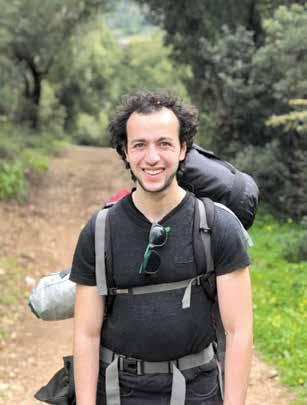
At just 22, when people asked him, “So, what now?” Avraham admits he was taken aback because he hadn’t planned for such early success.
“If you’d told me I’d move into venture capital to
His new goal? To become Israel’s Minister of Culture—though this time, he’s not putting an age cap on it.
Born and raised in Fort Lauderdale, Florida, Avraham is a fifth-generation American, the middle child in a family of three sons.
“Ever since I was a kid, I loved the arts. I’ve been singing, dancing, and performing since I was 12 years old,” he shares.
The Kaplan family belonged to a Reform temple, and Avraham and his brothers attended Hebrew school.
“I’d say my love of music was my first connection to Judaism because it led me to prayer. As a young teen, I joined a temple choir,” he recalls. “I was a 15-year-old singing with 70-yearolds. I loved it. I even had a solo with the cantor.” Avraham once considered becoming a cantor him-
self. A pivotal moment in Avraham’s life was watching Fiddler on the Roof for the first time. (He has since seen it 15 more times.)
“I saw Tevye talking to G-d, and I thought, ‘If Tevye can talk to G-d, why can’t I?’ I realized I didn’t need to know all the laws first – I could just talk to Him.”
From then on, as a young teenager, Avraham would walk his dog at night and spend that time talking to G-d.
“Of course, I had no idea at the time about the concept of hisbodedus ,” he says, “and I certainly made no mention of what I was doing to my parents and brothers.”
After high school, Avraham pursued his dreams of becoming an actor at NYU Tisch School of the Arts. Though his dog had passed away in his senior year, Avraham continued his reflective walks, now talking to G-d on his own. He joined Hillel and Meor, two campus outreach programs, and took his first Birthright trip to Israel with his older brother.
“That trip shaped my identity in a way that Reform Judaism never did. Standing at the Western Wall, visiting David’s Tomb, and touring Yad Vashem left a lasting impact,” he relates.
“My brother saw it as a fun trip, but for me, it was transformative. Those places brought me closer to my roots as a Jew.”
Playing “Jewish” parts in school and community theater was one thing; experiencing the real essence of Jewish identity was entirely different.
Initially, Avraham thought the answer to his newfound spiritual connection lay in Zionism and connecting with the land of Israel. He even considered joining the IDF and making aliyah, but his parents urged him to return home.
“I came home and finished my second semester of freshman year. But something felt missing,” he reflects.
While continuing his acting studies, Avraham felt spiritually empty. He began davening three times a day, starting with the Shemoneh Esrei in English. Though his Hebrew was still lacking, he found comfort in the knowledge that G-d understands all languages.
When his rabbi invited him on another free trip to Israel that summer, Avraham saw it as a sign that there was more for him to discover there. He ended up at Machon Shlomo, an intellectually rigorous yeshiva catering to Jewish Ivy League students seeking a deeper connection to Judaism.
“It was incredible – brilliant people connecting with G-d. I wanted to stay and do a gap year.” His parents, however, feared he’d turn into a “fanatic” Orthodox Jew, with the whole black hat and peyos look.
“I joked with them, saying, ‘But the penguins look so happy. They seem to understand the meaning of life.’”
Despite his lighthearted attempts to ease their concerns, Avraham was deeply torn. He recalls going to the Kotel and crying, “Hashem, why did You bring me back to Israel only to send me home?”
Back in the U.S., Avraham spent three more years searching for religious fulfillment. As a Reform Jew in Florida, he hadn’t met Orthodox Jews, but after becoming observant, he discovered Miami’s vibrant Orthodox community.
“Before I met an Orthodox Jew, I saw them on the subway in New York and thought they were Amish,” he laughs. He also recalls in that early period being approached by black-hatted people on the street, asking if he was Jewish and if he wanted to put on tefillin, and realizing they were Jews (Chabad), though different-looking ones.
thinking, ‘Uh oh, have I missed out on finding an Orthodox wife?”
This prompted him to mention to a friend that he felt ready to meet a nice Jewish girl and settle down. She directed him to Rabbi Mark Wildes at the Manhattan Jewish Experience (MJE).
“That’s where I encountered modern Orthodoxy – a new concept for me.”
Avraham joined the MJE fellowship and began taking on kashrus and tzinius. Rabbi Wildes later recommended that he study at Yeshiva University. “I asked if it was a yeshiva or a university,” Avraham recalls. “‘That’s been the kasha for 50 years!’ Rabbi Wildes answered with a laugh.”
Immersing himself in classes on Rambam, prayer, and halacha, Avraham was guided by influential figures such as Rabbi Mordechai Becher and Rabbi Benjamin Blech. However, when COVID-19 hit, everything changed. “It was the end of the world, everything shut down and I returned to Florida.”

During those years after Israel, Avraham explored various levels of observance, including Conservadox – which didn’t make sense to him. “They ate kosher at home but outside of the home, they’d eat non-kosher.” He also spent time dancing at Chabad Farbrengens in Crown Heights. “But the black hats felt intense and a little intimidating. Maybe one day, I thought.”
In his senior year of college, Avraham took a class that mentioned Orthodox Jewish boys marry between the ages of 19 and 21 (he’s since learned that that’s not actually accurate). “Here I was, 21 turning 22, and
Six months later, however, Avraham was back in New York, learning for a few months at Sh’or Yoshuv in Far Rockaway before returning to Israel for further study at Aish HaTorah and Shapell’s, deepening his mitzvah observance, particularly the mitzvah of tefillin which, he maintains, is what spiritually grounds him every day.
Returning to New York as a fully observant Jew was not without its difficulties. Avraham faced challenges, including an anti-Semitic incident where he was punched in the shoulder while walking in Manhattan.
“As a result, I struggle with wearing my kippa in public,” he admits. “On one hand, you’re not supposed to put yourself in a dangerous situation. On the other hand, I sometimes feel that if I had more emunah, I’d feel comfortable wearing it everywhere.” Though he doesn’t always wear it visibly, he carries it with him, ready to put it on when he feels safe. “But every day I re-contemplate wearing it in public.”
Reflecting on his ca reer journey, Avra ham shares how it unfolded alongside his evolving commitment to Judaism, as he shifted from acting to producing on Broadway and ultimately to where he is today – venture capital.
Already after freshman year, Avraham realized that acting would not be his primary fo cus. As a practicing Jew, he was unwilling to place his craft above everything else, as his professors had advised.

“I wanted to observe Shabbat and kashrut and have a family. I realized that an acting career would make that difficult,” Avraham shares. “I didn’t want to be away on national tours when I was a dad.”
This realization led him to the world of producing, where he felt he could maintain his religious commitments while staying in the theater industry. Over that first summer after returning from Machon Shlomo, Avraham participated in his first Off-Broadway theater festival as both a director and producer, working on two shows.
“From that summer onwards, though still a student, I was simultaneously directing and producing Off-Broadway shows.” Between the years 2017 and 2019, Avraham directed and produced five Off-Broadway shows.
Through networking, Avraham met Jim Kierstead, who would later become his business partner. Kierstead offered him an internship during his senior year, providing Avraham with a connection that led to his involvement with Company The Musical, a major Broadway production that ultimately earned Avraham his first Tony Award. Avraham also had the opportunity to work on trying to bring productions such as King Kong, The Color Purple, and Fiddler on the Roof
I saw Tevye talking to G-d, and I thought, ‘If Tevye can talk to G-d, why can’t I?’ “ “
in Yiddish to China. Unfortunately, due to COVID-19’s outbreak, these projects didn’t pan out.
Unlike lead producers, who are responsible for selecting the show, director, and creative team, and executive producers, who handle finances and operations, co-producers focus on fundraising.

Thus, Avraham’s primary responsibility was to raise funds and bring in investors, sharing pitch decks and securing financial backing.
“It’s a crucial job,” he notes, “but Off-Broadway was different. The smaller theater model meant I could be more hands-on.
I directed and attended auditions, and while I usually trusted the director’s choices, I could veto casting decisions if needed.”
Though his primary focus was financial, Avraham emphasizes the importance of having a theater background and an artistic lens to budget for essential elements like lighting, costumes, and overall production.
Following the success of Company, Kierstead pitched him another project— Sweeney Todd—which later received a Tony and Grammy nomination. This success opened the door for Avraham to be regularly approached with new opportunities, including other award-winning plays such as & Juliet and The Who’s Tommy The Musical.
It’s interesting to note that Avraham’s professional breakthroughs were happening at the same time as his spiritual breakthroughs.
“I went to Aish Hatorah in January 2021 at the same time I was finishing my master’s in performing arts administration at NYU Steinhardt. I worked with the vice president of acquisitions for the Broadway on Demand streaming platform while in yeshiva in Israel and also, while there, received an Emmy nomination for the Broadway Masterclass series I’d helped produce.”
Because of the pandemic, the opening of Company was delayed for two years. Avraham was in Shapell’s when it premiered in the winter of 2022.
The Wizard Behind the Curtain
It hasn’t been a seamless path for Avraham, an Orthodox Jew, working on Broadway (although it mostly has).
“Until October 7, that fact was a non-issue,” he reflects. “But since then, it’s become apparent that where I stand is different from most of my colleagues.”
In general, Avraham stays apolitical at work, but when Israel was attacked, he decided to spearhead a Broadway for Israel concert.
“An Israeli friend cautioned me to get it done fast,” Avraham recalls. “‘Now America is behind Israel,’ he said to me, ‘but their pro-Israel sentiment will change fast.’ Unfortunately, history has proven him right.”
Avraham admits it was like pulling teeth to get his colleagues on board. Performers feared backlash from the media toward the Jewish community. They said, “The media will blacklist us.” They were afraid (sadly, without undue cause) of antisemitism. This was after the industry’s year of pride in diversity. Leopoldstadt, a play about a Jewish family’s struggles and resilience across generations in Vienna, had just come out.
“I really thought Broadway would rally behind Israel,” maintains Avraham. “It definitely tainted my view of the industry. It showed me who the ‘wizard’ really was (the man behind the curtain).”
When Broadway Cares, a non-profit organization, decided to send money for humanitarian aid to Gaza, Avraham was further disappointed.
Because they couldn’t get Broadway talent to do an event that openly displayed support for Israel as a country, they decided to rewrite the narrative and make it in support of the hostages. In the end, in a YouTube music video, the actors (Jewish and non-Jewish) performed a rendition of “Bring Him (Them) Home” from the Broadway hit, Les Misérables.
Still, Avraham feels Broadway has good intentions – it’s just that you can’t be on both teams.
“They want to support everyone, even the bad guys. In real life, that doesn’t work.”
Of course, the scariest part of post-October 7 was the 700% rise in antisemitism in America that occurred a mere two months later, especially across college campuses. Avraham describes what happened on NYU’s campus: “Pro-Palestinians threw pig blood on the university president’s doorstep and accused her of supporting genocide. The protesters made an encampment on the NYU plaza, making it uncomfortable and dangerous for Jewish students to pass. I told the administration they had to shut them down. Thankfully, the school listened. 135 people were arrested, the school built a wall, and anyone entering the plaza was now required to show ID. Unfortunately, other universities weren’t as willing to make the necessary changes.” Avraham’s Jewish friends at Columbia told him, “Whatever you’re seeing on the media that’s going on here, just know, it’s even worse than they’re portraying!”
Remarkably, as a result of these incidents, more Jews have joined the MBA Jewish club. “They’re open to admitting they’re Jews,” Avraham notes, “and, out of a sense of community, are joining. We have Jewish alumni calling us up to speak. The Israel-American Council reached out to partner with us. Other institutes are reaching out and asking how they can help. Pre-October 7, this wasn’t happening.”
These events have sparked a new wave of support for Israel notably, and contrary to what the media portrays, with many Reform Jews, although some still keep a low profile due to fear of antisemitism. Kiruv organizations are also seeing more interest in Judaism, and there’s been an uptick in Chabad activity on campus.

The billion-dollar question is why, if he was doing so well on Broadway, Avraham shifted to venture capital for Israeli startups.
“I was sitting in a bar and met a venture capital mentor from my MBA program,” Avraham relates. “He asked me what I did. I told him I was a Broadway producer. ‘Sounds like you’d be great at venture
capital,’ he said to me. ‘You have the same skillset.’”
Avraham had planned on staying in entertainment but helping Israeli businesses sounded intriguing and meaningful. He’d fallen in love with Israel the first time he visited.
“I planned on eventually making aliyah ever since my first Birthright trip.”
Helping to build up the tech industry in the country felt like the right next step. So, with his impressive experience in the entertainment field Avraham pivoted to his next career. Today, he attends tech events and competitions, specifically in robotics and AI, and scouts for startups that show great potential. As a venture capitalist, his job is to find investors willing to fund new high-tech businesses.
Though for the meantime Avraham plans on continuing his work in venture capital, eventually, his dream is to be the Israeli Minister of Culture. He has many ideas for innovation and improvement in Jewish culture and the arts in Israel.
“I’d like to see theater that celebrates Jewish culture. Most of the world doesn’t know about our culture. They see Israel as a 70-year-old country, not as one that is a few thousand years old. In America, when we have Jewish Heritage Month, my non-Jewish friends come up to me and apologize for the Holocaust. That’s not all that we’re about,” Avraham maintains.
“I don’t think Israel and the Jewish people need others to feel sad for them. I’d like them to see us as being strong. Simcha is the answer – celebrating our culture, not dwelling on antisemitism. I think we should be celebrating our achievement that despite millennia of antisemitism, we are accomplishing so many great things today. One-fourth of all Nobel Peace prize winners are Jewish. How amazing is that!”
Especially now, post-October 7, when the country needs to heal, art and theater should be changing their narrative to reflect the joyous aspects of being a Jew, Avraham continues. Of course, it’s understandable how and why Jewish theater and art is dark and sometimes that can be cathartic but why can’t we also focus on the dancing chassid, the chuppah and other uplifting moments in a Jew’s life? he wonders.
“I’d love to see more ‘ohr’ through a blossoming of more positive art and culture.
“Who knows,” he adds, “maybe one day, after I make aliyah, I’ll go back to being an actor myself. In Israel, they don’t act on Shabbos, so that wouldn’t be a problem. Kol Isha is theoretically an issue but not if I’m in a non-musical production. Negiah , though, would have to be worked out. But, hey, you never know.”
Perhaps Avraham’s passion for activism and helping others comes from his namesake, the biblical Avraham Avinu.
“I feel blessed that my name is associated with giving,” shares Avraham. “Giving value to others informs every decision I make.”
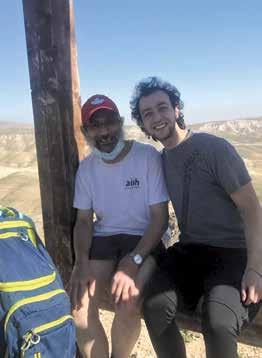
Avraham observes that Broadway often makes the mistake of focusing too heavily on Jewish persecution stories.
Avraham recounts a moment when the obligation of giving struck him deeply in his Jewish practice.
“I was studying in Aish Hatorah and prepping for Purim, learning how to drink appropriately so I could connect with Hashem in a purposeful way under intoxication. I remember feeling an incredible connection with Hashem that Purim. It was the most impactful davening I’d ever experienced. But then,” he shares, “out of the corner of my eye, at the end of Shemoneh Esrei, I noticed a younger student about to pass out. I ran over and helped him and his three other friends who had drunk too much. I felt like Avraham Avinu at that moment. At the most incredibly holy
moment when Hashem was visit ing him on the third day after his bris, he said, ‘Excuse me,’ and ran to take care of guests. That’s what I feel Hashem wants – for us to take care of each other, to be there for each other no matter what our differences. A parent is happiest when his kids get along with each other. We need to love our Jewish brothers and sisters through all our differences.”

Avraham shares oth er life lessons he’s picked up from his Jewish learning. From his Aish Hatorah rebbe, Rabbi Dovber Cohen, he’s learned about the importance of staying in G-d consciousness.
“In order to remain in that state, besides for practicing chessed, you need humility and gratitude. Ramban’s letter to his son about arrogance – I take that lesson with me every day,” says Avraham. “The idea of seeing things from other people’s perspectives. Humility grounds me so I understand that all I have is a gift from Above. When I go on my reflective walks and talk to Hashem, I thank Him for all He’s given me.”
Another strong value Avraham shares is the idea of Torah U’madah – bringing spirituality to the mundane world through mitzvot.
Avraham’s journey has been and continues to be one of balancing ambition with faith, creativity with commitment, and past with future. Whether in venture capital, on the Broadway stage, or helping shape Jewish culture, Avraham remains focused on making a meaningful impact.
“Ultimately, every choice I make comes back to my values of chessed, humility, and gratitude,” Avraham reflects. “When contemplating my next steps in life or career, I constantly ask myself, ‘Am I fulfilling these three ideals, and if not, what can I do to change that?’”
Before I met an Orthodox Jew, I saw them on the subway in New York and thought they were Amish. “ “

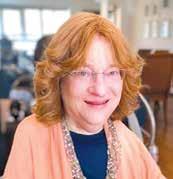
By Eliyahu RosEnBERg
hava had just bid farewell to her date—a man as sweet as they come, but not the one for her. She was a young woman. He was old enough to be her father. So naturally, their personalities and interests, like two melodies playing in clashing keys, didn’t quite harmonize. They were living their lives in two distinct tempos.
Chava was polite when she told the shadchan he wasn’t for her. She sang his praises but concluded that she was looking for a different type of man. Sadly, many shadchanim thought it would be impossible for Chava to get married. Other matchmakers thought she could only marry someone who, like her, had a disability. She hoped this shadchan would be different.
But when the young woman expressed her thoughts to the matchmaker, Chava was met with a cruel remark—a response
that would, for years to come, echo painfully in her mind. It was the worst moment of her dating career; a memory that, when recalled, could never fail to momentarily make Chava feel like her life was a sad song.
“If a man without a disability would agree to go out with you, I would wonder what was the matter with him. You know, psychologically,” the shadchan shot back.
The words were heavier than a falling piano. The shadchan knew better than to be so blunt and insensitive. But deep down inside, Chava saw the words of ignorant people for what they were: irrelevant.
Despite her mostly wheelchair-bound status, Chava Willig Levy was always so much more than a girl who contracted polio at age three. She was a brilliant woman gifted with incredible talents, an enviable sense of humor, and a profound passion for everything from listening to music to advo-
if we believe that g-d is good and loves us, then even if we may not understand it, everything exists because he wants it to. he cares for us, and he loves us.
When a parent names a child, he or she has a moment of prophecy. There’s some meaning as to why my name is Chava. so, i really believed that if i was given the name Chava, mother of all living, then surely motherhood was in the destiny.
g-d is the sailor, holding onto the steering wheel and guiding our life.
cating for a better world.
Chava was a brilliant author, a woman of deep faith in G-d, and a loving mother and wife. She was a wise and captivating public speaker, the self-proclaimed “biggest blabbermouth you’ve ever seen,” and a woman happily addicted to playing Scrabble with her husband.
Chava never wanted people to be blown away by her disability, though she knew it was an important part of her story. “I want people to be blown away by my cholent!” she would declare jokingly. “Or by my writing or my podcast!”
Chava Willig Levy preferred not to define herself by her battle with polio but by her slightly embarrassing but charming curse: the “melody malady,” she called it. As she half-joked, “Everything—everything makes me think of a song! It’s terribly embarrassing… I mean, just awful!”
This is not the story of a victim. This is a tribute to a woman who, from her earliest memories to her final breath on Earth, lived life to the fullest, proved the naysayers wrong time and time again, and inspired the world every step of the way.
In 1955, at just three years old, Chava was much too young to remember contracting polio. The virus left much of her body paralyzed, leading doctors to conclude that she would never be able to walk again. But, one day, Chava proved the prognosis to be out of tune with reality.
“I was finally back home. I must have been four years old. And I don’t know why, but I got this idea to wiggle off the couch and see what I could do,” Mrs. Willig Levy recalled. “Nobody was in the room. And I started sort of shuffling sideways along the couch. My mother came into the room,
and she saw me there, and she called the doctor. She said, ‘My daughter was taking a few steps!’ And they said, ‘Mrs. Willig, sit down. You must be under a lot of strain.’ They thought she was hallucinating.
“What happened? It’s simply that doctors have their theories about what can work. But a kid doesn’t know. A kid can figure out things that a doctor doesn’t even know. And that’s basically what happened. I had decided to substitute certain muscles that are normally not used for walking and use those instead.”
Though her mobility gradually faded with age, Chava was able to walk a bit and live a relatively independent lifestyle as an adult—contrary to what every doctor told her parents.
Sadly, Chava wasn’t as fortunate when it came to her schooling. She couldn’t go to a typical yeshiva or even a public school because most buildings back then were handicap inaccessible. Thus, Chava waited on a school waitlist for years.
At age nine, when she was finally admitted off the waitlist, she was exhilarated. As Chava started her first day at school, her heart drummed with uncontainable excitement, her body quivering with a symphony of triumph and anticipation. But all her joy ended at once in a cruel and sudden climax.
Chava found herself in a tiny room. Surrounding her were other children with mobility issues. Some were in crutches, others in wheelchairs. And some of her classmates were intellectually disabled, whereas Chava was, as she used to say, completely fine “from the chin up.”
Worst of all, the children in her class were segregated from the rest of the school and weren’t even allowed to eat lunch in the cafeteria adjacent to their classroom.
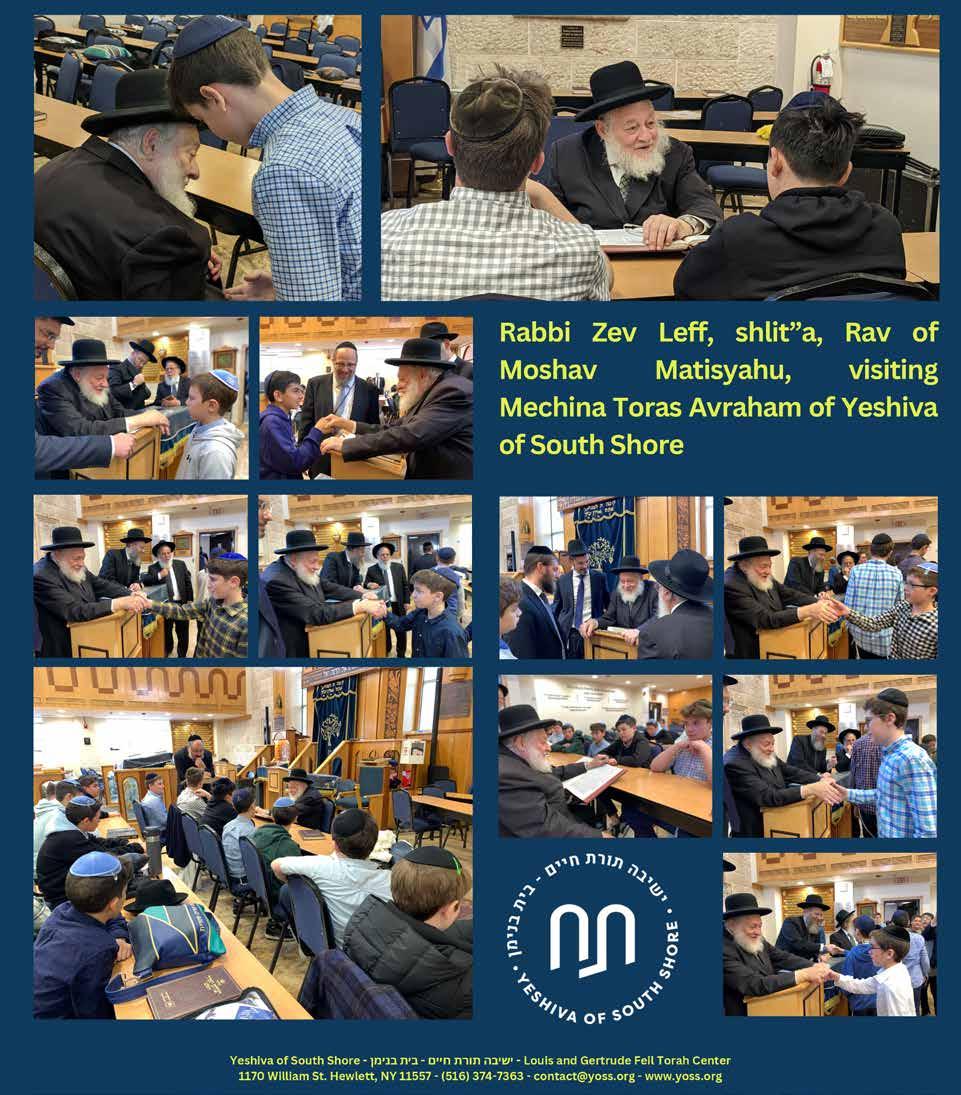
The sad arrangement almost reminded Chava of her earliest polio memory. She was a little girl, sitting peacefully in her hospital bed when a nurse with blonde hair and a sullen face walked in with a plate of food. The plate had fish sticks and mashed potatoes – two foods that young Chava could tolerate – along with canned beets that were the color of dried blood.
“I’m okay with the fish stick and potatoes. But no beets, please,” the child pleaded with the nurse. The gloomy woman nodded robotically in agreement, acting as if she had something better to do than to feed a picky child.
“This spoon of mashed potatoes is coming toward me. I open my mouth. And I’m chewing, and I’m like, ‘Whoa, something’s weird here,’” Chava recounted. “I spit it out, and I saw that she had put the beets under the mashed potatoes. And, you know, that’s the kind of thing that’s incredibly disrespectful of children.”
Chava thought school would be like the mashed potatoes: tolerable, if not enjoyable. But instead, under the guise of school, she was ambushed by an educational experience far worse than those barely edible beets.
Some wither away in response to life’s challenges. Others stand taller. Chava Willig Levy always did the latter.
Humiliating school and life experiences didn’t crush her. Instead, they struck a chord within her, shaping Chava into a passionate and vocal disability rights activist.
Ultimately, she saw her negative school experiences as fundamentally good, for she knew that without them, she wouldn’t have become the accomplished, happy person that she grew up to be.
Chava, a woman of deep emunah in Hashem, saw all of life’s setbacks through that same lens. Whenever she faced a challenge, she knew that it was for the best— that every sad episode of her life was just G-d’s way of making her stronger, sparing her from actual misfortune, or blessing her with exactly what she prayed for.
Sometimes, she saw the hand of G-d in relatively small ways. For example, there was that one time when a bus driver refused to let Chava onto the bus since he didn’t want to go through the trouble of
operating the lift and helping her onto the vehicle. When he slammed the door in her face and sped away, she burst into tears.
Forty-five minutes later, Chava reported the incident to a Transit Authority dispatcher. Indignant and bent on justice, Chava, at that moment, wanted the bus driver to pay for what he did, to face the music for discriminating against her so blatantly.
“The dispatcher looked at his chart and said, ‘Oh yeah, that bus broke down on 57th Street. It’s still there now,’” she recalled. “And I realized that if I had gotten on that bus and it had broken down on 57th Street, everybody else on the bus would have gotten off. But if the bus had broken down, that meant the lift wasn’t going to be working. And I would have been stuck there for who knows how many hours until some repair people came. So, 45 minutes later, I realized that the incident was, in fact, a miracle. And I really thanked G-d for that blessing of being able to see, in less than an hour, the purpose in something that felt as if G-d didn’t care about me.”
Chava saw G-d’s hand in life-changing ways as well, including in one string of events that she described as her “romantic story.”
For a decade, Chava kept bumping into a particular man. The two were, in Chava’s words, “passing each other like ships in the night.” In 1972, Chava first spotted the man at a concert in Yerushalayim.
“I saw this good-looking guy coming on the stage, holding onto the elbow of the person in front of him. And I thought, ‘Hmm, nice-looking guy. I bet you he’s blind,’” Chava shared. “Six years later, I was in Central Park, and I saw someone I went to Stern College with. Somebody was holding onto her elbow. I said hello to her, and she didn’t introduce me, but I recognized that it was the same man.”
A few years later, Chava went to a single’s luncheon (a nightmarish one at that. Mind you, it had seven women and three men). And, lo and behold, she saw the same man, who was indeed blind, sitting at one of the tables. And then, in 1982, Chava went to a concert and saw him again. At last, someone introduced the two. His name: Michael Levy.
At the time, Chava had been living in the Upper West Side. The girl, who was then in her late twenties, lived alone in her own apartment and was still able to walk around a little bit at that point.
One day, a few months after her previous encounter with Michael, Chava was sitting down in her apartment, relaxing as she listened to WQXR, the classical music radio station. When the station went on its news break, she groaned.
“I hate the news,” she thought. “It’s always so depressing. I don’t want to hear about another earthquake.”
Chava rose from her seat. She headed to the stereo to silence the newscaster’s depressing voice. But just as she was about to hit the radio’s off button, she tripped, tumbling to the floor. Unfortunately, given her weak arms and legs, she couldn’t brace for the fall or regain her balance. Instead, she fell to the floor, where she lay helpless. There was nothing she could do to get up. Chava couldn’t stand or crawl. And though she tried to shout for help, no one could hear her voice through the thick walls of her pre-war apartment building.
“The bottom line is I crashed to the floor. And to add insult to injury, the radio was still on, so I had to listen to the news!” she quipped. “But anyway, at the end of the news, this hour began that changed my life. It was an hour of music by Elly Ameling. She’s a Dutch soprano with a gorgeous voice. And at the end of that hour, the host said, ‘Miss Ameling will be giving her annual recital two weeks from today at Alice Tully Hall,’ which is part of Lincoln Center. And I just said, ‘I’m going to be there’ – as long as someone gets me off the floor!”
An hour and a half after she fell, Chava heard the sound of her door creaking open. As she said, at that point, she “would have welcomed a burglar!” But instead, it was her parents, who walked in to find their daughter sprawled out on her apartment floor.
Chava joked that she wasn’t exactly sure if, at that moment, she would have preferred to see her father and mother over a robber, since her parents were already on the fence about her living alone—and her fall was bound to arouse even more concern.
“They got me off the floor, and my father spent two weeks installing floor phones in every room of the apartment. And I spent two weeks looking for someone to come with me because I bought two tickets for the concert,” Chava added. “I knew many musical people, but not one person was interested or available to come to this concert. And it was at that point that I remembered Michael. I knew he was musical since he was in that choir. So I called him, and I said, ‘You know, I know it’s last minute, but would you like to go to a concert on Sunday?’
“He wasn’t available, but he said he would call me back. It took him a good five weeks—which I forgive him for,” she joked. “But he did call me and invited me to a different concert. And the rest is history. But the point is, if I had not fallen down, I would have turned off the radio. I would have never heard that Elly Ameling broadcast and fallen in love with her voice. And I wouldn’t have bought the tickets. And the miracle of me finally meeting this great guy would never have happened. Except that something had to happen, namely falling down, which felt at the time as if G-d was out to lunch.”
For a long time, Chava was opposed to marrying someone with a disability because she felt that, by doing so, she would have to settle. But when she met Michael, she realized that her thinking couldn’t have been further from the truth. The personalities and interests of Chava Willig and Michael Levy harmonized perfectly like two melodies complementing one another.
“What I realized was that this wasn’t about having to settle. Not at all,” declared Chava. “Michael and I have so many things in common. We both love music—with a capital L! We love children. We care about spirituality. We are addicted to Scrabble –there’s no other word for it, and we have no intention of recovering! But the thing is that our disabilities are there, but that’s not what brought us together at all. As it turns out, our disabilities really are kind of complementary, in that, what Michael cannot do, I can do, and what I cannot do, thank G-d, he can do.”
* * *
They said she would never walk again.
They told her she couldn’t get married. And they said she would never have children. And, for years and years, it seemed like the naysayers were finally right.
Though the couple’s infertility issues had nothing to do with their disabilities, they tried and failed for years to have kids. But Chava refused to give up.
“My parents named me Chava, and Chava means, ‘Mother of all living.’ And when a parent names a child, he or she has a moment of prophecy. There’s some meaning as to why my name is Chava,” Mrs. Willig Levy explained. “So, I really believed that if I was given the name Chava, mother of all living, then surely motherhood was in the destiny.”

But as Chava neared her forties and still saw no results from the treatments, she finally broke. She tearfully told her husband, “I don’t think I can keep us with this anymore. I think we should just give up on this whole thing and try to adopt.”
And so, the couple stopped the treatments and began looking into adoption. And it was then that Chava, at long last, got pregnant. When their daughter Tehila was born, Rabbi Paysach Krohn, a good friend of the couple’s, visited their home to meet the miracle baby.
As Rabbi Krohn was about to leave their apartment building, he turned to Chava and said with a smile: “Don’t worry, Chavi. Next time, it’ll be a boy!”
She turned back to the rabbi and started laughing. Seeing as she was approaching forty, she felt lucky to have one kid. But sure enough, Rabbi Krohn was right. A year and a half later, their son Aharon was born. And for Chava, being a mother was the greatest gift Hashem could’ve ever given her. * * *
“My favorite blessing is SheHakol Nihiyeh B’dvaro, and I translate it to mean, ‘Blessed are you, L-rd our G-d – SheHakol Nihiyeh B’dvaro – because everything exists because He says so.’ And that goes back to all my stories about buses and radio shows,” Chava Willig Levy concluded.
“If we believe that G-d is good and loves us, then even if we may not understand it,
everything exists because He wants it to. And He cares for us, and He loves us. So, every time I take a drink of water, for me, it’s a chance to remember that idea.”
Chava Willig Levy passed away on April 6, 2023, at the age of 71. Her life – like a rollercoaster of a song – had its unpredictable parts and its ups and downs. But Chava’s story ended on the happiest of notes, for she lived a life of faith in Hashem and love for all. She was the living embodiment of perseverance and emunah.
May her neshama have an aliyah in shamayim, and may her legacy – of promoting a world of compassion and understanding – live on forevermore and become the reality Chava always dreamed of.
This article is based on a podcast, “Inspiration For the Nation,” hosted by Yaakov Langer. To catch more of this conversation, you can watch it on LivingLchaim. com or YouTube.com/LivingLchaim or listen wherever you listen to podcasts (just search for “Inspiration For The Nation”) or call our free hotline: 605-477-2100.


Moderated by Jennifer Mann, LCSW of The Navidaters

I love your column and read it with interest every week. I’ve been thinking of asking this for a while. I really appreciate every single voice within your columnists, who give a lot of insight.
I’ve decided it’s the right time to send in this question.
I am a 34-year-old woman, I go to the gym every day and I’m an attorney in a top firm. I have dated nearly every possible prospect in NYC, as most guys I’ve either heard of or already dated.
When I travel to new cities, I get plenty of suggestions. The guys I really like tend to give me a total of three dates before ending it due to “personality.” Most guys I don’t like at all.
My closest married friend sat me down recently and confided that she believes the reason I don’t get much of a chance with the guys I actually like (the type who are manly, professional, and successful) is because I intimidate them. She thinks if I were more vulnerable, feminine, low key, calm, and sweet I’d come across as more appealing. She claims my energy level is not “feminine” to match these guys’ masculinity.
I’m not sure what I can do about this, but I know that I am who I am and I won’t change just for a man.
I’ve heard this over the years, but this is the first time a close friend has brought it to my attention so I’m actually taking it somewhat seriously. If I stay the way I am, do I really have no hope of matching with the type of man I want?
Thank you.
-Rebecca*
Dear Readers,
We want to offer YOU an opportunity to be part of the discussion! Please email us at MichelleMondShadchan@gmail.com, subject line “reader’s response,” if you would like to participate in the new “A Reader’s Response” columnist spot. We will send you a question and publish your answer in an upcoming Navidaters edition. Looking forward!
Michelle, the “Shadchan”
Rebbetzin Faigie Horowitz, M.S.
Rebecca, stay the way you are but let more of it show. In other words, let both your strengths and vulnerabilities show.
This takes some skill, and many successful women have it. Demonstrate that you are a woman of strength, as well as a strong woman. You have inner sensitivities and vulnerabilities that are relatable, even if you are an accomplished woman in a high-powered, competitive profession. If you need help opening up that part of yourself on dates, discuss and practice this skill with someone you trust or hire.
Dear Rebecca,
I can stand on a soapbox and hold up signs that preach “You Go Girl.” I can hold a megaphone and chant cliches such as “Be who you are and say what you feel because those who matter don’t mind, and those who mind don’t matter.” If I do these things, you might feel validated and understood. However, for the sake of this column, our huge readership, and your future success, I will do no such thing. I must be honest.
There is a concept that all people, male and female, exude either a masculine or feminine energy. In some cases, women can exude a masculine energy,
and men can exude a feminine energy. The most natural relationships progress emotionally when a masculine energy and feminine energy are together. A feminine energy is vulnerable, sweet, beautiful, nurturing; a powerful force most commonly intertwined with feelings of close connection. Feminine energy produces a subconscious vibe of sensitivity, empathy, and receptivity while at the same time honoring and respecting the strength, responsibility, courage, and wisdom which comes with the masculine.
The men you are looking for who have that strong masculine energy initially are excited to go on dates with you. On the surface, they hear everything appealing to them: a beautiful, smart, intelligent woman who has climbed the corporate ladder. However, the dates themselves prove to lead to failure time and time again. Why is that? You physically cannot put two of the same side of a magnet together and expect them to stick. These two will repel each other as it is extremely unnatural and feels wrong. The same goes with the energy you are exuding on dates towards these men. I am sure they are very impressed with you, but they will not want to marry you. They might see you as a potential friend or colleague but not as wife and mother potential.
You must do some serious work on honing in on your feminine energy in order to facilitate the changes you wish to see. I truly believe if you work on this particular output, it will shatter the wall that goes up during your dates, you will connect to the guys you are dating more easily, and they will want to continue with you as well.
Do the work, and keep us posted with good news to come!
Dr. Jeffrey Galler
My first reaction to your letter was that it might be a good idea to get a professional makeover. A new hairstyle, wardrobe, and makeup might do wonders for making you appear much more feminine. But I realize that this is kind of superficial.
The difficulty, of course, is that people can change how they look, but can they actually change their personality? Even more importantly, SHOULD a person attempt to actually change her personality?
So, I did some research, and came across a book, The Surrendered Wife, by Laura Doyle. The underlying principle of the book is that in order to have successful marriages: “The control women wield at work and with children must be left at
Don’t lose yourself while looking for someone else.
the front door of any marriage.”
To be clear, this certainly does not mean that women should change who they really are. It simply advises that, when it comes to marriage, they should work on how they interact with men. For example, the author suggests: “Give up unnecessary control and responsibility.”
“Resist the temptation to criticize, belittle, or dismiss their husbands.”
This does not mean acting like a phony. If you think about it, as a successful lawyer, you surely interact in a different

way with different partners in your firm, and you interact differently when dealing with clients who have different personalities and uniquely different needs.
The idea is not to change who you are, but to adopt a softer, nurturing style of communicating and interacting with potential life partners.
Sarah Lavane, author of “Unmatched” www.unmatchedstory.com
Hi Rebecca,
Over the years, I’ve gotten way more advice than dates – often conflicting advice. “Dress up nice. Dress casu-
al. Lie about your age. Don’t lie about your age. Don’t worry, it will happen at the right time. If you sit back and relax, nothing will happen. Put your best face forward. Be yourself” and on and on. I’m sure you’ve had the same. Very often, advice may be conflicting or useless or just a way to make a friend who’s anxious for you feel as though she’s doing something useful. Having said that, if several people have mentioned the same problem, perhaps you can find a kernel of truth in it.
What are they really trying to tell you when they say you’re not low key, calm or sweet enough? Friends may want to help you but not hurt you. Is it just a nicer way of saying something else? Perhaps there is an aspect of you they do see that they think men would be turned off by? There
Dating and Relationship Coaches and Therapists
Dear Rebecca,
Thank you for reading our column and for writing! I really appreciate your readership and am so glad you decided to write.
Your question is a good one. And I believe it will be met with mixed views and reviews. On the one hand, we know that we are supposed to be ourselves. I view this as an absolute truth. On the other hand, we also know that most masculine types of guys (and I know, I know, it’s 2024 and I truly don’t want to offend anyone with this term, but for lack of a better one and being that I’m an ‘80s baby, I’m hoping the readership will appreciate the use of the word for context) do appreciate what we can call... hmmmm ... typical femi-
nine traits This is what I’d call a truth, or pretty close to a truth, with exceptions to the rule.
There is an episode of an old show whose name I will not reveal in the paper because this is a kosher family paper that touches upon this very idea. One of the main characters is a high powered female attorney who says she has no luck with dating. She believes that men are turned off by her position. And so, she pretends to be a very typically feminine flight attendant and changes her mannerisms and intonations and guess what? She gets a guy. But they don’t last very long because she isn’t being herself and she’s
are plenty of women who are smart, tough and independent but are great listeners, fun to talk to, and love to laugh. There are other women who are smart, tough and independent who are always right about everything, argumentative and just can’t listen to what others are saying. I’ve made many mistakes over the years; the main thing is to be more self-aware and try to learn from them.
Lastly, people aren’t perfect. Married people and matchmakers aren’t perfect either. They’ve made mistakes, too. It’s called being human. So if you look inward and discover you have made mistakes, don’t beat yourself up. But perhaps you may have not made any mistakes at all. Sometimes, it’s just not the right person or the right time yet. Finding a match is as difficult as the Splitting of the Yam Suf. Sometimes, there is no reason, and people search for one in desperation but Hashem is
They might see you as a potential friend or colleague but not as wife and mother potential.
running things, not us.
I’d say all my attempts to be someone I’m not haven’t worked. Ultimately, don’t lose yourself while looking for someone else. Every pot has its cover. Perhaps you don’t necessarily have to change who you are but with a bit of introspection you can become a better version of you.
living an outright lie.
As I see things, you have two options. Continue doing things as you’ve always done, or take a chance and change things up on your next date. Accessing one’s more feminine qualities does not necessarily mean you are giving up on yourself or not being true to yourself. Typically, feminine energy is about “receiving” and “nurturing” and driven by the need for security, and male energy is about providing, protecting and is driven by being appreciated.
I believe that there is a way to be yourself and think about and process if what you are saying on your dates is allowing that masculine energy you are seeking to shine through.
In my personal experience, especially in today’s world, there are many masculine men who find powerful women incredibly attractive and alluring and feminine. I would encourage you to see a dating coach or a
therapist to truly explore what may be going on here. Do you insist on paying when a man takes out his credit card or show any negative emotion if a man opens the door for you? I’m asking because I don’t know what is going on on these dates, and I encourage you to really think about this and go speak with someone professionally to get a better sense of what may be going on. If we want a masculine man, there has to be a way to allow the masculine to come forward. And the same is true for men who are seeking a more feminine type of woman. You need to be real with yourself and ask, “What might I be doing that may be intimidating to men?” I don’t think it’s the career itself. Are you able to have fun on your dates? To let your hair down, so to speak? To enjoy the moment? Are you able to be vulnerable appropriately? Wishing you all the best, Jennifer

By Rivka Kramer, PMHNP-BC

David is an energetic 8-year-old who seems to be in constant motion. From the moment he wakes up, he’s on the go – playing with his toys, running around the house, and talking nonstop. His parents, though deeply supportive and loving, often find themselves overwhelmed. It’s not that David doesn’t want to succeed; it’s that focusing on any one thing for long is a monumental challenge. He forgets his school supplies, leaves homework incomplete, and struggles to stay seated at the dinner table.
At school, David’s teachers share the same frustrations. They’ve tried giving him extra time, offering rewards for tasks, but it doesn’t seem to help. David is distracted, impulsive, and restless, which only seems to escalate as the day goes on. As his behavior begins to impact his social relationships, David’s parents are starting to feel like they’re running out of options.
For many children like David, ADHD (Attention-Deficit/Hyperactivity Disorder) is more than just a diagnosis – it’s a daily struggle that affects every aspect of their lives. But what if there was a way to address ADHD beyond simply medicating the symptoms? What if there was a more personalized, comprehensive
approach that blended medication with lifestyle changes, mindfulness practices, nutrition, and behavioral strategies? This is where integrative psychiatry can make a difference.
Integrative psychiatry represents a paradigm shift in how we understand and treat mental health conditions. It combines conventional psychiatric care, such as medication and therapy, with complementary treatments like nutrition, exercise, mindfulness, and lifestyle changes. Rather than focusing solely on symptom management, integrative psychiatry seeks to address the whole person: mind, body, and spirit. It emphasizes long-term solutions that foster overall well-being, aiming not just to manage ADHD but to help individuals thrive.
To help David, we need to understand ADHD and how it affects the brain. ADHD is a neurodevelopmental disorder that impairs the brain’s executive functions, including attention, impulse control, organization, and planning. These
functions are primarily managed by the prefrontal cortex—the brain’s “CEO.” In ADHD, the connections in this part of the brain aren’t functioning optimally, and the chemical signals necessary for proper functioning are insufficient.
The two key neurotransmitters involved in ADHD are dopamine and norepinephrine. Dopamine is vital for motivation, reward, and focus, while norepinephrine plays a key role in attention and alertness. In ADHD, the brain doesn’t receive enough of these chemicals, which can make it difficult to stay focused, regulate emotions, and manage behavior.
Managing ADHD is more than just addressing the symptoms with medication. A holistic, integrative approach that includes nutritional psychiatry, exercise, mindfulness, and behavioral strategies can make a significant impact. Let’s explore how these elements work together to help children like Jake.
1. Nutritional Psychiatry: Fueling the Brain for Success In my practice, when someone first comes to me with a diagnosis of ADHD, I
guide them in understanding the concept of nutritional psychiatry. The brain needs the right nutrients to function properly, especially when managing ADHD. Nutritional psychiatry focuses on providing the brain with essential vitamins, minerals, and fatty acids that are crucial for the production of neurotransmitters like dopamine and serotonin.
Some key nutrients that support brain function include:
Omega-3 fatty acids: These essential fats are found in fatty fish like salmon and sardines, and plant-based sources like flaxseeds and chia seeds. Omega-3s are crucial for brain cell communication and have anti-inflammatory properties that help the brain function at its best.
Vitamin D: This vitamin is essential for dopamine regulation, mood stabilization, and cognitive function. While sunlight is the primary source, foods like fatty fish, eggs, and fortified dairy products can help maintain healthy vitamin D levels.
B vitamins: These vitamins help synthesize neurotransmitters, including norepinephrine. They’re found in foods like leafy greens, eggs, and fish.
Zinc: Studies show that children with ADHD often have low levels of zinc,
which can exacerbate symptoms. Zinc is found in foods like pumpkin seeds, turkey, and legumes.
Unfortunately, many modern food sources have been depleted of their nutritional value due to industrial farming practices. This is why proper nutrition, along with dietary supplements where needed, plays a vital role in managing ADHD.
2. Exercise and Physical Activity: Moving the Brain Toward Success
I often share with my clients that physical activity is not just beneficial but essential for managing ADHD. While it may seem counterintuitive to encourage a child, like David, to burn off even more energy, physical activity has profound effects on brain function. Regular exercise has been shown to improve executive functions such as planning, decision-making, and impulse control, areas that children with ADHD often struggle with.
Physical activity can also improve cognitive flexibility, working memory, and sleep quality – all of which are typically impaired in ADHD. Exercise, whether it’s running, swimming, or even yoga, helps regulate mood and enhances focus, making it easier for children like David to stay on task and remain calm.
3. Mindfulness and Meditation: Training the Brain to Focus
Mindfulness involves staying present in the moment, a technique that can greatly benefit children with ADHD. Practices like mindfulness meditation can help increase attentional control by training the brain to resist distractions. For David, mindfulness might look like practicing focused breathing or eating a meal with his nondominant hand- activities that require more deliberate engagement and can increase focus.
Mindfulness also helps with impulsivity, a central feature of ADHD. Children with ADHD often act before thinking, making spontaneous decisions without considering the consequences. Mindfulness helps create space between stimulus and response, offering the opportunity for more thoughtful, intentional actions. By cultivating awareness of their thoughts and feelings, children with ADHD can learn to pause and make better decisions.
4. Skills-Based Cognitive Behavioral Therapy (CBT): Building Practical Skills
Traditional Cognitive Behavioral Therapy (CBT) helps individuals address negative thinking patterns, but skills-based CBT focuses on teaching practical skills that improve day-to-day functioning. For
children like David, this might involve time management, organization, impulse control, and emotional regulation.
One key strategy in skills-based CBT is setting achievable, step-by-step goals.
making it easier for children with ADHD to focus and regulate their emotions.
For David, the support and love of his family, teachers, and friends can be transformative. Love acts as a natural
ADHD is often seen as something to be “fixed” or “managed,” but what if we reframed it as a superpower?
For example, David could have a goal of finishing his homework within a specific time frame, and a reward system could help reinforce this behavior. Immediate, real-time rewards tend to be much more effective than long-term rewards, as children with ADHD often struggle with delayed gratification.
When it comes to managing ADHD with medication, the right treatment isn’t always clear-cut. For some children like David, finding the medication that works best can feel like trial and error. This is where GeneSight testing can be incredibly beneficial. GeneSight is a pharmacogenetic test that analyzes how an individual’s genes might influence their response to certain medications, including those used to treat ADHD.
By identifying genetic variations that affect the way medications are processed in the body, GeneSight testing helps tailor treatment plans to each individual. This approach reduces the trial-and-error process, enabling clinicians to choose medications that are more likely to work and are less likely to cause side effects. For children with ADHD, this can mean faster symptom relief and a more effective medication regimen that’s customized to their genetic makeup.
For David, a GeneSight test could reveal which ADHD medications are most likely to help him without unwanted side effects, ensuring that his treatment plan is both effective and personalized.
At the heart of ADHD treatment is a powerful, often overlooked factor: love. Research has shown that positive relationships and supportive environments can boost dopamine levels naturally,
dopamine booster, enhancing motivation, focus, and emotional balance. A loving, supportive environment can act as “medicine” for the brain, helping Jake feel more centered and grounded throughout his day.
ADHD as a Superpower ADHD is often seen as something to be “fixed” or “managed,” but what if we reframed it as a superpower? Many individuals with ADHD are exceptionally creative, driven, and capable of thinking outside the box. With the right support,
through medication, nutrition, exercise, mindfulness, and skills-based CBT, individuals with ADHD can unlock their full potential.
In David’s case, an integrative approach that blends medication, lifestyle changes, and behavioral strategies can provide him with the tools he needs to thrive. By adopting a personalized treatment plan, including the use of GeneSight testing to optimize medication choices, we can help children like David not only manage their symptoms but harness their unique strengths.
The goal is simple: to help individuals with ADHD, whether children or adults, find balance, success, and joy in their lives. Integrative psychiatry provides the tools for this, offering a holistic, personalized approach that truly addresses the root causes of ADHD while nurturing the whole person.
Rivka Kramer is a Board Certified Psychiatric Nurse Practitioner. She has an Integrative psychiatric private practice based in Cedarhurst, NY. She serves as a member of the board of JANPPA, the Jewish American Nurse Practitioner Psychiatric Association. She can be reached at 516-945-9443.

By Sara Rayvych, MSEd
I’m continuously amazed by the wonders of technology. Today we can do things that were previously unimaginable. I remember taking my older kids to the bank and teaching them how to fill out the deposit and withdrawal slips. We rarely use those slips now. I can pay others, transfer money and deposit checks from an app on my phone. Rather than list each check separately, an entire pile of checks and cash can be inserted into an ATM machine at once. Stores rarely require cash now because so few people pay with that antiquated method.
We added a phone line, and I was having trouble with the set-up. A call to customer service found me simultaneously on three devices, each device validating the others as he remotely controlled my screen and showed me which buttons to push. It was overwhelming (and frightening) but incredible that he could see my screen and manipulate it from a distance.
As a teen, I often babysat for other families in our shul. Cell phones didn’t exist, and I had no way to communicate with the parents when they were out. They would leave me the number of where they were going and periodically check in by phone, but it would have been impossible to reach them for most of the time I was responsible for their children – and this was normal. Today’s children can instantly reach any number of adults wherever they are and at any moment. They can call, text or video chat. The only method unavailable is holographic images. Give that a few more years.
These examples don’t even come close to the wonders of modern medicine. Everything we do and all aspects of our lives have changed with the advances made over the past few years. The world is changing at a rate faster than we can keep up. Technology is moving so rapidly that I check the year novels are printed so I know what the characters would have had access to. There are many benefits that Hash-

em has given us with these advances. Better medical services, the safety to call in an emergency from anywhere, and the ability to keep closely connected to long distance loved ones are among the many modern day improvements. Along with this incredible bracha comes real challenges, including an almost addictive connection to devices, access to disturbing images, and a requirement for immediate gratification.
It doesn’t take much to notice the level of connection people have to their devices. For example, people are looking at their phones while walking down the street, hanging out with friends and sitting together at simchas. Many find it hard to be shomer Shabbos and disconnect from high tech. Children are being raised in this environment and exposed to this as normal. As parents, we need to have our eyes open and teach our children how to learn a healthy balance.
This article is not intended to dictate to parents how much and what type of screens to give their child. Each family has their own needs and many professionals they can consult. I simply want to bring up the discussion of this im -
portant issue and some of the concerns parents should keep in mind.
There are many concerns, and I’d like to mention just a few of them. Though I’m mentioning many negatives in this article, I am aware of the many positives – even if I’m not focusing on them. Most things in life are both good and bad, and it’s our job to harness the good while avoiding that which is detrimental. As Jews, we don’t shy away from the physical; we elevate it. Only by understanding that which is harmful can we properly utilize the world around us.
It wasn’t that long ago (though it seems a lifetime away) that phones were connected to walls and the only “screens” were that of television. Even the television could only show you what was currently playing on its limited number of stations. Today’s child can have a phone in their hand at all times and any number of screens traveling with them, and children can’t comprehend any other reality. Even toddlers can use tablets and cell phones. This is unprecedented and is in essence a social
experiment with the next generation. We have no way of knowing what the longterm effects are with this level of obsessive connectivity. This thought alone should give parents reason to hesitate.
I had thought that only people over a certain age understood how to balance technology because they were raised before this explosion and understood a different reality to counter the current one. I may need to take this back now that I see the inability of even the older generation to disconnect. The need to constantly check, be numbed and be attached to something is very stressful – even when they are used for “relaxation.” Excessive screen usage has been noted to cause stress, anxiety, depression and sleep problems.
Phones, tablets and other devices are designed to be addictive. This is not only unhealthy but also makes it harder to self-regulate. There is a continuous need to check the many alerts, text messages and games. FOMO (fear of missing out) is very real.
One paragraph is not sufficient to discuss the myriad of issues with content. Much of what is acceptable for today’s child would have been banned on television years ago. The values being portrayed are not ours. The use of violence, profanity, vulgarity and unhealthy relationships are not something to readily subject a child. This is in addition to the easily accessible un- tzinius content and the sick individuals that attempt to befriend children, chas v’shalom. Parents need to ensure their child can only access material that is in agreement with their family’s personal standards. Social media is a topic all its own and deserves a separate article. The time spent on screens is often a tremendous waste. Hours that could be spent playing, reading and with family and friends are otherwise wasted. Even just relaxing and thinking gets pushed to the side.
When children bring screens into their interpersonal relationships, it can create unhealthy interactions. Rather
than meaningful conversations, they often communicate using quick (and horribly spelled) text messages, emojis or “LOL.” Even in-person get-togethers can focus on texting others and not on communicating with the child sitting next to them.
Technology is here to stay, and it’s important to teach children healthy screen usage. This is one area parents certainly don’t want to be haphazard or rely on “peer education.” Parenting needs to be mindful and intentional. Too often, children get screens because they have accidental access or it’s a distraction tool. Parents need to have a united policy and work together to ensure their child has healthy screen usage.
Each child has their own needs and limitations with technology. Parents can consult their own rav, rebbetzin or healthcare professional to help them decide on appropriate guidelines for their individual child. Whatever those guidelines are, it’s important they be well thought out.
Every family will have slightly different standards. For example, some topics
are more sensitive, and what is beneficial for one child may be detrimental to another. This may include divorce, mental health issues, serious medical diseases and death. Please be sensitive to other families and not expose their children to such content without parental permission.
A frustrated mother recently shared with me the difficulties she’s facing as
Rather than meaningful conversations, they often communicate using quick (and horribly spelled) text messages, emojis or “LOL.”
Take the time to speak with your child and let them know your family’s values and guidelines. Keep the lines of communication open so your child knows they can always speak with their trusted adult. It’s painful to think about, but kids can be exposed to objectionable material (chas v’shalom). With open communication, this child will know not to be ashamed or hesitant to speak with their parents.
about what message a child is receiving when they’re told “you can ignore that rule” or to outright lie and deny which phone or other device they own.
Technology is an important part of our everyday lives, and as parents, we need to make conscious decisions about how our families will interact with it.
classmates are exposing her child to problematic content. Even what her child isn’t being shown firsthand is still being discussed in detail. Please educate your child to be sensitive to other families and not share everything they see. There is another issue this parent’s frustrations raise. As this mother explained to me, the “informed” classmates are using devices and seeing content that is explicitly banned by their school. Many families don’t agree with every rule in their child’s school. Perhaps it seems “extreme” or “unnecessary” or isn’t their family’s personal hashkafa. Even if your family doesn’t personally hold by the school’s tech policy, it’s important to think carefully

There is bracha in everything Hashem gives us. Learning to properly harness the good while tossing away the rest is a continuous balancing act. After carefully evaluating the pros and cons of each new technology, parents can create guidelines that meet their child’s needs. With proper thought, consulting the proper authorities, clear guidelines and lots of siyata dishmaya, we can teach our children healthy screen usage for now and in the future.
Sara Rayvych, MSEd, has her master’s in general and special education. She has been homeschooling for over 10 years in Far Rockaway. She can be contacted at RayvychHomeschool@gmail.com.

By Etti Siegel


Q:Dear Etti,
My 2 nd grade son came home from yeshiva using what we call a “curse word,” and it was a pretty bad one. It bewilders me – how is this happening? Of course, I told him we don’t talk like that and explained that it isn’t a nice word, but he finds it exciting and daring.
I am finding the “outside” values very off-putting and send my child to yeshiva to prevent him from learning such garbage. How is this happening and what do you suggest I do?
I could call the school and make a matzav, but is there a point?
-Need Soap for Kid’s Mouth
A:how many great words there are to express feelings. Share shades of emotion –we are not just happy and sad, excited or mad. There are so many shades of emotions. For example, there are so many words to show how happy or unhappy a person is!
At the end of the day, I would not be too concerned. State firmly but simply, “I understand that you heard other kids use that word, but in this family that kind of language is not allowed.”

Dear Parent,
So many of us out here can relate to your angst and annoyance. Despite our best efforts, sometimes our children are exposed to things we do not want them exposed to –unnecessary or inappropriate information and bad language being two of the top complaints.
The first thing to do is be totally neutral in your tone and expression. Any feedback, laughing or acting horrified will encourage repeat performances. Children will enjoy a reaction of any kind, and many will want to produce that reaction again.
Casually find out how they heard the word they are using. Mention that it is not a nice word, and in your house and family you are careful not to use language that is not Torah-dik.
Find a different time to talk about language and
You can let the school know, but I would recommend letting the teacher know and not bothering the principal. The teacher could decide to take the matter up with the administration if he/she feels it is necessary. I would be careful to call in a non-accusatory way to simply let them know that you handled it with your own child, but they might want to be aware of the matter.
There are going to be a lot of times when things are said or done that will not fit with your core family values. This is the reality of sending children to school full of many different families with very different parenting styles. Many of those times you will not even be aware of what happened, as children often do not share. (They forget or are no longer interested in rehashing the matter. Sometimes, they are embarrassed by what happened and therefore do not share,
and sometimes, they do not want to get a friend in trouble.)
If your home is an open one, where your children know they can talk to you honestly and share their feelings, they will often act in ways that would make you proud. When they act in ways that don’t, you need to be ready to calmly say, “This not the way we act in our family. I need time to think about this (with your spouse) and decide on a consequence.” This gives you time to process it, and even discuss it with someone older and wiser who might have good advice. (I recommend the family rav.)
A powerful message to a child that is waiting for a verdict can be, “We thought about it, and know that this is not who you are. You made a mistake, and we decided to let it pass this time.” If a child needs to apologize or write an apology, that would obviously still have to happen.
Children have a deep desire to please their parents, and that is a powerful deterrent against the factors that you cannot control but wish you could shield your children from.
May you merit to see much Yiddishe nachas from your child(ren),
- Etti




WBy Nati Burnside
alking into Pépe Kitchen is hard to do. Not physically, obviously. But in order to walk into Pépe Kitchen, you have to walk away from the beach and the beautiful boardwalk at Pier Village in Long Branch, New Jersey. You might be reading this when it’s cold outside and the beach is far from your mind. In that case, the smell coming from Pépe Kitchen will probably make it easy enough to get through the door.
Because of the location next to a very popular beach, this restaurant is built for speed. You can talk to a person at the counter if you’d like, but you can also walk up to one of the touchscreen kiosks to place your order. Especially in the summer, finding a table is bound to be tough. If you’re lucky enough to snag one, you can actually just scan the QR code at the table with your phone, it’ll bring up the menu, you can make your selections, pay for your food, and somebody will bring it to your table for you.
In the event that the weather is good and the restaurant is packed, don’t worry. While you wait, you can watch the open kitchen behind the counter, including somebody right in front of the glass making all of the pasta (as many as 10 types) by hand. At Pépe Kitchen, they want you to know that everything is the real deal. They are doing things the right way because they believe that’s the only way to do them.
When I was invited to check the place out, I had some trouble selecting appetizers. With so many options that looked amazing (the ordering system has great pictures), it was hard to narrow it down. That said, I have to recommend the Pepe Mac N Cheese Stick. In this case, the “Pepe” isn’t the restaurant, it’s to let you know that this menu item is actually made with the sauce from their cacio e pepe. Also, the “Stick” is singular because it’s actually kind of like a flat loaf (like one big stick) that is cut up into smaller sticks and served over marinara sauce. I
could’ve eaten this entire thing, but it is best shared with others. The crunchy outside and soft inside are a nice contrast, just like acidic dipping sauce and the creamy internal base. It’s an interesting take, and I welcome it.
The other appetizer that shouldn’t be skipped is the Garlic Cheese Breadsticks. The only disclaimer I’d have here is that there is a truly substantial garlic presence that might be too powerful for the faint of heart. But as somebody who doubles the garlic in every recipe he makes, I loved them. These are breadsticks that are stuffed with a very healthy amount of cheese and topped with garlic and herbs. They are served cut in half with the cheese trying to escape, but convenient for you to pour some of the marinara dipping sauce inside before eating. Breadsticks are sometimes overlooked by kosher restaurants, so I was glad to see them here.
Prying myself away from the appetizers, I had to choose a pizza. Pépe Kitchen uses flour from Italy and their house sourdough starter to make some of the best pizzas I’ve ever had. The Pepe Signature Pie is made with the sauce from their cacio e pepe, and I found it to be interesting. The sharpness of the pecorino romano and the fresh cracked black pepper make for a taste so perfect that it’s easy to see why cacio e pepe is greatly on the rise in popularity these days. However, I actually preferred the Fire Roasted Vegetable Pizza. First of all, there’s just nothing like that mixture of peppers, onions, and mushrooms when they impart that roasted taste into the sauce and cheese. The use of a pomodoro sauce here is nice because that fresh tomato sauce absorbs the flavor better than a standard pizza sauce.
After watching the pasta get made a foot from your open mouth (don’t worry, there’s a glass barrier), your stomach might hunger for some pasta. They have a different type of both ravioli and gnocchi every week, but I’m going to go a little bit outside the box and suggest you order



the Lasagna. Many people would dismiss ordering lasagna in a restaurant, but I am not one of those. I know you can make it at home, but this is made to order for you and comes to your table still in the cast iron skillet from the oven (don’t touch it). Using slow-cooked tomato sauce, multiple cheeses, and that fresh pasta… this was the best piece of lasagna I’ve ever had.
Maybe more on the dinner side of things, but Pépe Kitchen also has some fish dishes that you might want to consider. For me, the Bronzino really hit the spot. Pan seared to crispy perfection, the two fillets are served with a beurre blanc caper



sauce that balances the buttery flavor of the sauce with the classic salty hit you get from biting into a caper. One small secret you might want to know is that this dish is served over the crispy herb smashed potatoes that were so popular they were added to the app offerings. Obviously, the fish is the pricier side of the menu, but like everything here, they do it right and it’s worth the price.
So next time you’re walking down the boardwalk (or even driving nearby), stop into Pépe Kitchen for an authentic Italian meal a stone’s throw from the water. Maybe meals like this are a dime a dozen in Italy, but they’re still special around these parts.
Dairy - Italian - Counter Service 15 Morris Avenue (Unit #110), Long Branch, NJ (732)-955-7373 PepeKosher.com Jersey Shore Orthodox Rabbinate (JSOR)
Yield 6-8 servings

By Naomi Nachman
This is a delicate and rich French dessert made with fresh berries and a baked custard filling. Top with a dash of powdered sugar for breakfast or dessert! I got this recipe from the executive chef Malcolm Green from our Kosher River Cruise last week in Bordeaux, France, where I gave cooking classes on the cruise. This is a fabulous recipe, and it is so easy to make! In the off season, you can use frozen blueberries.

◦ 3 large eggs
◦ ½ cup granulated sugar
◦ ⅛ teaspoon salt
◦ ½ cup all-purpose flour
◦ 2 tablespoons unsalted butter, melted and slightly cooled
◦ 1 cup whole milk
◦ ½ cup (120 ml) heavy cream
◦ 1 teaspoon vanilla extract
◦ Finely grated zest of ½ lemon, optional
◦ 2 cups pitted cherries or berries
◦ Powdered sugar, for garnish
and
and hosts
Preheat oven to 350°F. Grease a pie pan and set aside.
In a medium bowl, whisk eggs, sugar, and salt for about a minute until well combined. Add flour and whisk until smooth and lump free. Whisk in melted butter, followed by the milk, heavy cream, vanilla extract and lemon zest. Make sure that the mixture is completely smooth. Pour batter into prepared pan. Scatter fruit onto the batter.
Bake for 35-40 minutes until the clafoutis is just set (it’s OK if it’s still loose in the center) and golden at the edges. Let cool slightly until lukewarm. Dust with powdered sugar, if you like. Cut into wedges and serve.
meals for families and individuals within The Five
own
and neighboring communities,
Two with
a
Naomi gives cooking presentations for organizations and private groups throughout the New York/New Jersey Metropolitan area. In addition, Naomi has been a guest host on the QVC TV network and has been featured in cookbooks, magazines as well as other media covering topics related to cuisine preparation and personal chefs. To obtain additional recipes, join The Aussie Gourmet on Facebook or visit Naomi’s blog. Naomi can be reached through her website, www.theaussiegourmet.com or at (516) 295-9669.

by barbara l andesman
1)
This German-Jewish physician and scientist’s laboratory discovered arsphenamine. Discovered in 1909, it was the first effective treatment for syphilis. This scientist worked in the fields of hematology, immunology, and antimicrobial chemotherapy; he invented the technique which led to gram staining bacteria and his laboratory invented the concept of chemotherapy. In 1908, he received the Nobel Prize in Medicine for his contributions in the field of immunology.
a) Paul Ehrlich
b) Otto Fritz Meyerhof
c) Hermann Joseph Muller
2)
This former American Secretary of State served under Presidents Nixon and Ford. He was awarded the 1973 Nobel Peace Prize for his work in negotiating the Paris Peace Accords, thereby ending American involvement in the Vietnam War.
a) George Shultz
b) Henry Kissinger
c) Joseph Lieberman
3)
This New York-born medical physicist received the 1977 Nobel Prize in Medicine for her work in the discovery of the RIA Technique, or Radioimmunoassay Technique. This method allows the measuring of substances which are found in minute amounts in the human body; an example is screening blood donors for hepatitis.
a) Gerti Cori
b) Ada Yonath
c) Rosalyn Sussman Yalow
4)
This Russian poet, novelist, and translator (Goethe, Schiller, Shakespeare) published “Dr. Zhivago” in 1957. He was awarded the Nobel Prize for Literature in 1958 but was compelled by the Communist Party of the Soviet Union to decline the Prize. It was accepted in 1988 by his descendants.
a) Boris Pasternak
b) Alexander Pushkin
c) Sholem Aleichem
5)
This political leader of Israel received the 1978 Nobel Peace Prize “for the Camp David Agreement, which brought about a negotiated peace between Egypt and Israel.”
a) Yitzchak Rabin
b) Shimon Peres
c) Menachem Begin
6)
Founded in 1924 in Jerusalem by the Chief Ashkenazi Rabbi, it is a National-Religious yeshiva and the most prominent yeshiva in the Religious Zionist world, training yeshiva heads, city rabbis, and teachers in religious colleges and high schools.
a) Bar-Ilan
b) Mercaz Harav
c) Yeshivat HaGush
7)
Named after the Lithuanian town of its original location in pre-war Europe, this yeshiva is presently located in Bnei Brak, Israel and is one of the leading Lithuanian-style yeshivas in Israel. It was founded in 1908.
a) Novardok
b) Ponevezh
c) Pressburg
8)
In 1933, this Rabbinical College was founded by R’ Yaakov Yitzchak Ruderman in Baltimore, MD, USA; it is also a Maryland State accredited college which allows students to take courses in various academic fields and to receive credits for their religious studies.
a) Ner Israel Rabbinical College
b) Rabbinical College of Telshe Yeshiva
c) R’ Isaac Elchanan Theological Seminary of Yeshiva University
9)
These were the two most dominant yeshivas of Bavel; they compiled the Babylonian Talmud and their halachic decisions were considered law.
a) Shem and Ever
b) Sura and Pumbedisa
c) Chevron and Porat Yosef
10)
Founded by R’ Nosson Zvi Finkel (Der Alter) (1849-1927), this Lithuanian Yeshiva functioned from late 19th century until World War II; in the 1920s, the Yeshiva moved to Hebron until the 1929 Massacre. It then moved to Bnei Brak.
a) Slabodka
b) Ponovezh
c) Porat Yosef
11)
Founded in 1970, based in Jerusalem, it caters to young men, usually of college age with little or no background in Judaism; known as a “Baal Teshuva” yeshiva, it has branches in the U.S., Canada, South Africa, United Kingdom, Australia, Ukraine and Russia.
a) Ohr Somayach
b) Yeshivat Hakotel
c) Ohr Yerushalayim
W Ho a m i?
12)
During the Russo-Japanese War (19041905), through my firm, Kuhn Loeb & Co., I loaned Japan $200 million to avenge the anti-Semitism of the Russian Tsarist Regime.
a) Jacob Schiff
b) Felix Warburg
c) Moses Montefiore
13)
Born in Galicia (Ukraine), I traveled much and was known as a vagabond; in 1877, I wrote “Hatikvah,” which became Israel’s national anthem. It was part of my book, “Barkai” (Morning Star).
a) Yossele Rosenblatt
b) Shaul Berezovsky
c) Naphtali Zvi Imber
14)
I was among Theodore Herzl’s Christian guests at the First Zionist Congress in Basel, Switzerland, in 1897. In 1863, I founded the International Committee of the Red Cross, and the 1864 Geneva Convention was based on my ideas. I was awarded the first-ever Nobel Peace Prize in 1901; Herzl referred to me as a “Christian Zionist.”
a) Friedrich Born
b) Jean Henri Dunant
c) Bertrand Russell
15)
In 1969, my wife Doris and I founded the California-based retail clothing chain “The Gap,” which is the largest specialty apparel retailer in the United States.
a) Leslie Wexner
b) Donald G. Fisher
c) Howard Schultz
16)
In 1917, as Foreign Secretary of Britain, I further explained my views: “….And Zionism, be it right or wrong, good or bad, is rooted in age-long traditions, in present needs,
and future hopes of far profounder import than the desires and prejudices of the 700,000 Arabs who now inhabit that Ancient Land.”
a) Lord Arthur James Balfour
b) Viscount Edmund Allenby
c) David Lloyd George
17)
I was an American economist, statistician, recipient of the Nobel Memorial Prize in Economic Sciences, an economic advisor to President Regan and an economics Professor at the University of Chicago. I expounded theories about the Money Supply and its growth rate and consumption analysis. The Economist Magazine said about me that I “am the most influen-
tial economist of the second half of the twentieth century…possibly all of it.”
a) Adam Smith
b) Milton Friedman
c) Alan Greenspan
18)
I am an American politician and lawyer who twice declined the nomination to the U. S. Supreme Court; I was a U.S. Senator from Louisiana and was Secretary of State in the Confederate Government under Jefferson Davis, President of the Confederate States.
a) Hayim Solomon
b) Judah P. Benjamin
c) Judah Touro
who am i aN swers: a12- ; 13- ;C 14-b; 15-b; 16-a; 17-b; 18-b
the yeshiva world aN swers: 6-b; ;b7- 8-a; 9-b; 10-a; 11-a
Nobel Prize l aureates aN swers: 1-a; 2-b; 3-C; 4-a; 5- C


This column features business insights from a recent “Mind Your Business with Yitzchok Saftlas” radio show. The weekly “Mind Your Business” show – broadcasting since 2015 – features interviews with Fortune 500 executives, business leaders and marketing gurus. Prominent guests include John Sculley, former CEO of Apple and Pepsi; Dick Schulze, founder and Chairman Emeritus of Best Buy; and Beth Comstock, former Vice Chair of GE; among over 400+ senior-level executives and business celebrities. Yitzchok Saftlas, president of Bottom Line Marketing Group, hosts the weekly “Mind Your Business” show, which airs at 10pm every Sunday night on 710 WOR and
throughout America on the iHeartRadio Network.
Since 2015, Yitzchok Saftlas has been speaking with leading industry experts on the “Mind Your Business” show, sharing insightful business and marketing strategies.
In this article, we’ve gathered insights from five business experts to help you master the art of communication. Whether you’re delivering a speech, communicating with your team, or building client relationships, these tips will elevate your communication skills to the next level.

CommuniC ate as a Community a lex Holzer, Communication Coach at Gain your Voice
A community is something intangible. It’s somewhat abstract. We don’t know exactly what it is, but we know how to feel it. Whether it’s a community within a business, home, sports club, or anything else, we know what a community feels like. Everybody contributes. Everybody’s a giver and a taker, and we’re all working within our strengths. So, if “community” is the noun, then “communication” is the verb. It’s the activity of a community.
The way to behave as a community is to communicate. Which means, on a very deep level, that when you give a speech, it’s much more than just speaking. You’re communicating with an audience. There’s a give and a take. There’s a buyer and a seller. You’re sharing a message with them. When I talk to you in a coffee shop, then our conversation has a buy-in of 50/50. When I’m getting up and speaking in public, it’s me as 99% versus a very small buy-in from the audience. But there is still a response from them. There’s always got to be two-way traffic. It’s sharing a conversation. That’s what it’s all about. When a person gets that right, then the audience is in front of your mind all the time. How the audience is going to understand it, how they’re going to be able to pack that message up and take it home, whether you’ve lost them because your train of thought is too convoluted, whether your language is unclear, all of these different things fall into place. So, once you put that filter on and you say, “This is not speaking, this is communication, a two-way street,” then everything else starts to fit into place.

Respond i mmediately
d arin a dams, Growth advisor & p rofessional event speaker at Keap
When someone reaches out to you, you have just minutes to respond to them. After only two minutes have passed, the efficacy of your message will start deteriorating rapidly. It is as if you have this half-life in which you want to get out your response to make the best possible impact. This advice refers to internal communications and emails, but it also refers to virtual interactions with your clients and prospects. If someone clicks onto your landing page, signs up for a service, and is expecting a response, you should have an email or text message prepared and programmed to go out to them immediately. The faster you can get your message out, the stronger and more impactful it will be.
The faster you can get your message out, the stronger and more impactful it will be.

Steven Gaffney, Communications Consultant for Fortune 500 Companies
When we’re having difficult conversations, asking something big of another person, we need to think about what’s in it for them. So often, when making requests, people just focus on their personal benefit and forget to ask themselves what’s in it for the other person. And if you’re not sure, it might be a good thing to ask them. You could say, “Here’s my request. How would this proposal be beneficial to you?” Sometimes a person might say, “I don’t really see the benefit to me,” in which case, you want to lay it all out and look for a way that both parties can benefit. Too often, I’ll see people ask their boss for things and forget to include what’s in it for the organization. Or, I’ll see executives make an argument about why it’s great for the company, but they don’t make an argument about why it’s great for the employees. No matter what, just think about what would be in it for them. And it may be as simple as, “I want us to work better together, because I noticed tension. I don’t like that tension, and I have to imagine that you don’t like it either. Let’s figure out a way that we can all work better together, so that everyone benefits.”

Repeat you R pu R pose
Jeanne Stafford, Noted Communications Trainer and President of
Stafford & Company
Always reframe every conversation in terms of what you’re going to accomplish, in what timeframe you’re going to get it done, and who it is going to be done with. Repeat that over and over and over again.
When I start working with clients, they sometimes feel as though it is very disingenuous to repeat something – to repeat a platform, mantra, or goals, over and over again. But it really helps to center people, opinions, agendas, and desires. If you’re taking the lead on something, it is the absolute best way to keep people on course. Messages need to be repeated to be understood. Every single person you meet with every single day has arrived at that space with a whole lot of things that went wrong and a few things that went right. So, their mind is scattered, and they need to be refocused in their time and energy. Our energy either helps us to shine and receive things or it gives us an opportunity to block anything coming our way.

e xamininG Body l anGuaGe
Greg Williams, Master Negotiator and Body Language Expert
When you are communicating with someone, there are many ways that you can pick up on body language signals based on the gestures that they emit. When you pose a question to an individual, watch what they do. Do they immediately glance at the person on their right? Do they take a moment to think before responding? These all give insight into what that person is thinking and feeling. For example, if they suddenly take a step back, that would suggest that they are trying to get further away from the question.
Paying careful attention to body language gives us inside clues on how a person is feeling at any point in time during a conversation or negotiation. But it’s just as important to pay attention to our own body language. Remember that everything you do is being interpreted as well. If someone makes a proposal and you let out a long sigh before agreeing, they will interpret that as meaning you’re not happy with this outcome.


And we know that today, a week after the election, President Biden and Vice President Harris had a private lunch. How awkward was that?
- Fox’s Peter Doocy questioning White House Press Secretary Karine Jean-Pierre
I don’t even understand. Why would — why would it be awkward? Why would it be awkward?
- Jean-Pierre, in response
Because the President got squeezed out for her and then she kept him at arm’s length and then she lost.
- Doocy, in response
Anyone who was screaming Hitler all year but is NOT fleeing on a makeshift raft right now didn’t mean any of it and can therefore be safely dismissed forever.
- Tweet that was retweeted by Trump advisor Stephen Miller
Puerto Rico just elected a Republican governor. Everyone who told you a comedian’s joke was going to tip the presidential election is a liar who thinks you’re stupid. Bookmark every person who hyperventilated about that, and vow to ignore them forever.
- Tweet by Sean Davis
Well worth it.
- San Francisco 49ers star defensive end Nick Bosa responding to the $11,255 fine levied on him by the NFL for wearing a MAGA cap and crashing a live interview after his team’s win against the Dallas Cowboys late last month
Nancy Pelosi was so enraged by Trump’s victory, her eyebrows moved to Canada.
— Greg Gutfeld
Stephen, have you tried maybe just getting over yourself? You’ve been bashing Trump for eight years and all you’ve done is put him back in power…. You might want to try something new like…comedy!
- Ibid.
While walking on the beach on Sunday, President Biden stumbled multiple times. I guess that’s what happens when you try to scatter YOUR OWN remains.
– Ibid.
It is not just misogyny from white men, it’s misogyny from black men, things we have all been talking about, who do not want a woman leading them. It might be race issues with Hispanics, they don’t want a black woman as President of the United States.
- Joe Scarborough, MSNBC, the morning after the election during a conversation with Al Sharpton
Right and with other Hispanics. You’ve got some that don’t like each other.
- Sharpton, in response
Sharpton complaining about racial bias is like the Menendez brothers complaining about being orphans.
– Greg Gutfeld, Fox

President Biden, do you think we can get a hostage deal by the end of your term?
- Israel Channel 13’s Neria Kraus to Pres. Biden ahead of his meeting with Israel’s president in the Oval Office
Do you think you can keep from getting hit in the head by a — a camera behind you?
- Biden’s response
Wonder who is painting a better picture for America?
Campaign Spending:
Trump Raised $381.54 Million
Trump Spent $345.42 Million
Only $10.4 Million was spent on Staff.
Kamala raised $1.003 Billion Kamala spent $1.37 Billion Kamala spent $582.53 Million on Staff.
Tweet by podcaster Justin Blinson
First and foremost, we want to acknowledge the fear, confusion, and sadness many of you are feeling at this moment. For others, you may be looking for something meaningful and important to channel your emotions towards. If that’s you, then we’re asking you to make a donation to the Democratic Party today.
– From a shameless email sent out by the Harris campaign headquarters two days after she lost the election and squandered $1 billion in donations


America, it will all be OK. Harris will be elected the next president of the United States.
- Democrat strategist James Carville in a New York Times op-ed on October 23
We’re going to say we told you so. We told you this identity [garbage] was a disaster. We have no power. Nothing.
- Ibid., on a podcast after Harris lost
Another victory for American Jewry: Chuck Schumer colluded with antisemitic colleges, lied to Jewish students and refused to meet with them, and prevented a senate vote on the Antisemitism Awareness Act. HE JUST LOST THE SENATE MAJORITY! Totally well deserved.
- Election night tweet by Shabbos Kestenbaum
Now that the election is over, I think we can finally say that yeah actually Project 2025 is the agenda. Lol
- Tweet by Matt Walsh trolling the left
They are so mad that @realDonaldTrump won.
- Elon Musk’s reaction to “Saturday Night Live” trying to mock him and Trump
In 107 days, Kamala Harris went from Plus $1 Billion to negative $20 million! She would have destroyed America in her first 100 days if she would have won.
– Tweet by Thomas Prince

Democrats Call For Abolishing Popular Vote
- Babylon Bee headline
Flash Flood Warnings Issued As Liberal Tears Continue To Soak Nation.
– ibid.
Newsome Assures Californians They Will Be Safe From All the Trump Administration’s Prosperity, Safety, Lower Prices - ibid.
Insult To Injury: African Kids Receive Overstock Harris-Walz Hats To Wear With Their Yankees World Championship Shirts - ibid.
Democrats Vow To Improve Their Outreach to Bigoted Misogynists - ibid.
Sad: Candidate Who Bankrupted Campaign Will Never Have Opportunity to Fix Nation’s Economy - ibid.
BREAKING: Arizona Announces They Have Counted Another Ballot - Ibid.
Jimmy Kimmel Ratings Soar After Debuting New Segment Where He Stands There All Sad and Cries Like a Wuss - ibid.
“Don’t Despair,” Kamala Tells Celebrating Nation. -ibid.


Don’t y’all find it strange that now that he’s won, they’re not calling him a threat to democracy? They’re not calling him a fascist ... I would think that, if you really believe that, then somebody’s speech would be about how America [messed] up and how things are about to be really bad. It just makes you wonder how much of it did they really believe or how much of it was just politics.
– Podcaster Charlamagne of The Breakfast Club, who was a Harris supporter
I mean, this really was a historic flawlessly run campaign. Queen Latifah never endorses anyone. She came out and endorsed her. She had every prominent celebrity voice. She had the Taylor Swift – the Swifties, she had the B-hive. You could not have run a better campaign in that short period of time.
– MSNBC’s Joy Reid moments after Kamala Harris lost in a landslide
I’m a man of peace now! Please stop with all the negative comments!
- Tweet by John Hinckley Jr., who became world-famous for shooting and wounding then-President Ronald Reagan in 1981, presumably responding to comments asking him to take out President-elect Trump
Frankly I don’t care what people think about me, especially on the left.
- Former acting director of U.S. Immigration and Customs Enforcement Tom Homan who was appointed to be President-elect Donald Trump’s “Border Czar,” on Fox News, responding to criticism from the left
If we can’t get assistance from New York City, we may have to double the number of agents we send to New York City because we’re going to do the job with you or without you.
- ibid., responding to Mayor Adams declaring that he will still welcome illegal immigrants

Donald Trump Was Such a Threat to Democracy That Oprah Charged $1 Million to Endorse Kamala Harris
- Red State headline, after it was disclosed that the Harris campaign paid $1 million to Oprah for her endorsement

We disappointed Dutch Jewry during the Holocaust, and tonight, we disappointed you again.
- King Willem-Alexander to Israel’s President Herzog after a violent pogrom perpetrated by Arabs in Amsterdam in which they attacked Israeli soccer fans coming out of a game
Donald Trump should complete his stunning common sense dismantlement of the woke mind virus brigade by announcing he’s now identifying as a woman and will therefore become America’s first female president.
- Tweet by Piers Morgan
I know that people are going to say we should show some grace and be humble. It’s hard to be humble and graceful to people that call you a Nazi. I’m doing my best. It’s hard to believe that they’re calling for a peaceful transition after calling everyone misogynist, racist, fascist, convicted felon, you know. But I’m going to try.
- Greg Gutfeld, Fox


By David Ignatius
President-elect Donald Trump is right about one thing: There are too many wars happening around the world, and there’s a need for strong and creative diplomacy to settle them.
Trump’s impending presidency carries serious perils for America and the world. But this is, as he said during his campaign, a world that’s much too dangerous. So it’s worthwhile now, as the transition to a new administration begins, to study what he has said about settling conflicts and to think about how his policies might be implemented without damaging the United States or it allies.
Let’s replay the tape: Trump expressed concern repeatedly throughout the campaign that “the whole world is blowing up,” as he put it during a September rally in Flint, Michigan. For all his bluster, Trump presented himself as the antiwar candidate who would work with his friends – Russian President Vladimir Putin and Israeli Prime Minister Benjamin Netanyahu – to quickly end the wars in Ukraine and Gaza.
“That is a war that’s dying to be settled,” Trump said of the Ukraine conflict during his September debate with Vice President Kamala Harris. “I will get it settled before I even become president. … I’ll speak to one, I’ll speak to the other, I’ll get them together. … Negotiate a deal. Because we have to stop all of these human lives from being destroyed. … Don’t kid yourself … we’re playing with World War III.”
Queried later about whether he had talked with Putin since leaving office in 2021, Trump was unapologetic: “I will tell you that if I did, it’s a smart thing. ... That’s a good thing and not a bad thing in terms of a country.”
Trump has been insistent, too, that the war in Gaza must end. In April, he told my former colleague Hugh Hewitt: “Get it over with and let’s get back to peace and stop killing people.” He asserted during the September debate: “I will get that settled and fast.” Israeli papers say Trump explicitly told Netanyahu last summer that he wants the war over by Inauguration Day. There are many reasons to be wary of Trump’s enthusiasm for making deals with dictators and political friends. During the campaign, Democrats derided Trump for his comments. Harris offered a typical riposte during their debate: “You adore strongmen instead of caring about democracy.”
But for the moment, let’s take Trump at his word. How could he quickly end the wars in Ukraine and Gaza without also harming U.S. interests?
Negotiating a just settlement in Ukraine is the most delicate challenge. The Biden administration wouldn’t touch negotiations, maintaining that only Ukraine could decide on peace terms. But since Kyiv’s offensive stalled last year, Ukrainians have known this moment was coming.
For months, Ukrainian President Volodymyr Zelensky has been exploring ways to conduct a negotiation from strength with Putin. That’s why he wanted U.S. permission to fire long-range ATACMS deep into Russia. That’s why Ukrainian troops invaded the Russian region of Kursk. Zelensky’s “victory plan” was in many ways a platform for negotiations.
Now, it appears, Trump will insist on talks. That would be disastrous if he plans a diktat that forces Ukrainian concessions to secure a fast peace. But it Trump wants

to appear strong – and not in Putin’s pocket – he would demand security for Ukraine so that it can thrive after any settlement. South Korea, West Germany, Finland and Austria all made compromises to satisfy belligerent neighbors – and went on to spectacular prosperity. Trump’s goal should be security guarantees that allow postwar Ukraine to succeed as a member of the European Union.
If Trump wanted to try something creative, he would engage China in this bid. Zelensky badly wants Chinese involvement as a check against future Russian actions. The Biden administration talked of getting Beijing involved but made little progress.
“If Trump could engage President Xi Jinping in making peace in Ukraine, they both should share the Nobel Peace Prize,” says Graham Allison, a professor at the Harvard Kennedy School.
Trump’s call for negotiation to end the war in Ukraine is an unlikely echo of Gen. Mark A. Milley, the former chairman of the Joint Chiefs of Staff and a frequent target of Trump’s attacks. In November 2022, to the consternation of the Biden White House, Milley proclaimed: “When there’s an opportunity to negotiate, when peace can be achieved, seize it.”
Settling Israel’s wars in Gaza, Lebanon and Iran will be far simpler. Netanyahu has largely achieved his goals. Hamas is devastated militarily. Hezbollah has been decapitated and is ready to withdraw from southern Lebanon. And Iran has been unable to retaliate successfully, thanks in part to U.S. military might.
Israeli military leaders know it’s time for the fighting to end. Israel Defense Forces leaders told Washington this week that
they have achieved their objectives in Gaza and Lebanon. Netanyahu might want to let his ally Trump cut the ribbon, so to speak, but these conflicts will end soon – because the IDF will demand it.
The test for Trump will be whether he can organize Saudi Arabia and the United Arab Emirates to help create a new era of security and stability for the Palestinians. Unless Trump is a fool, he will see this as one of the biggest opportunities of his presidency.
A final reason to encourage Trump as a peacemaker is that he has long expressed deep concern about the danger of nuclear war. Allison, who co-wrote the classic study of the 1962 Cuban missile crisis, “Essence of Decision,” has gathered a compendium of Trump’s antinuke comments:
“The single biggest problem the world has is nuclear armament, nuclear weapons,” Trump said during a 2016 debate with Hillary Clinton. “Nuclear weapons are the biggest problem we have,” he repeated at a town hall event last December. He offered this emphatic warning during his debate with Harris. “We’re going to end up in a third world war. And it will be a war like no other because of nuclear weapons.”
Many aspects of a Trump presidency could be ruinous for the United States –and good citizens need to guard against such dangers. But much of the public backed Trump because it saw him as a tough leader who could make peace. In that, he deserves support – but also a demand that he protect American interests in whatever negotiations lie ahead.

Donald Trump deserves enormous credit for his historic victory, in which he increased his support among almost every demographic group in the country. But Democrats made it possible with several catastrophic choices over the past four years. Here are the eight key blunders that paved the way for Trump’s comeback:
1. They ignored warnings from liberal economists that their massive new spending would unleash disastrous inflation. Democrats should have listened to former Clinton treasury secretary Lawrence H. Summers, who cautioned in 2021 that the American Rescue Plan would “set off inflationary pressures of a kind we have not seen in a generation.” They should have heeded Obama economic adviser Jason Furman, who warned that “pouring roughly half trillion dollars of gasoline on the inflationary fire that is already burning is reckless.” They were right. By the time Joe Biden and Kamala Harris took office, the economy had turned the corner and was growing at 6.5 percent. But they wanted credit for the post-Covid recovery. Instead, they got the blame for unleashing the worst inflation in four decades.
2. They created a border disaster. Democrats knew that illegal immigration propelled Trump into the White House in 2016. So why, on winning back the presidency in 2020, did they immediately unleash the worst peacetime border crisis in U.S. history? The crisis cost taxpayers $150 billion in 2023 alone, according to an analysis by the Federation for American Immigration Reform – forcing inundated communities to cut police, fire and other services to support illegal migrants. Did they think voters would reward them?
3. Their catastrophic withdrawal from Afghanistan convinced Americans
By Marc A. Thiessen

they were incompetent. Most were not thinking of Afghanistan in the voting booth, but the horrific images of Afghans falling from departing U.S. military aircraft, Taliban forces riding abandoned U.S. military vehicles, and 13 Americans killed by a suicide bomber at the Kabul airport’s Abbey Gate indelibly changed opinions of Biden’s presidency. Before Kabul fell in August 2021, his approval rating had never dipped below 50 percent. After, the floor fell out. Harris proudly declared she was the last one in the room before Biden made the fateful decision to pull out – which sent a message of weakness that clearly emboldened Russia to invade Ukraine, and Hamas, an Iranian proxy, to launch the worst massacre of Jews since the Holocaust. Democrats promised to end the chaos of the Trump era, but instead unleashed chaos on the world stage.
4. They broke their promise to unite the country. Biden pledged in his inaugural address to put his “whole soul” into
“bringing America together.” Instead, he compared Republicans to racists and traitors, accusing them of standing with George Wallace, Bull Connor and Jefferson Davis for opposing his partisan election bill, and declaring right before the election that “the only garbage I see floating out there is [Trump’s] supporters” (he later claimed, implausibly, that he had misspoken). Harris went further, calling Trump “a fascist,” a “wannabe dictator” and a “petty tyrant.” This not only reeked of desperation, it violated the very reason voters elected them.
5. They covered up Biden’s cognitive decline. Democrats misled the American people about Biden’s mental fitness – assuring them, as Harris did, that the president was “vibrant,” “tireless” and “absolutely authoritative in rooms around the globe” – only to have those falsehoods exposed by Biden’s disastrous debate performance. Americans don’t like being lied to. And if they had been honest sooner, Democrats could have held a compet-
itive primary and picked a more capable and appealing nominee.
6. They didn’t give voters a benign alternative. Unlike Biden, who at least had the veneer of moderation, Democrats nominated the most radical Democratic ticket in the history of the country. Harris was on record as having supported the Democratic socialist agenda, from the Green New Deal to Medicare-for-all. In her 2019 campaign, she had pledged to ban fracking and the sale of gas-powered cars, decriminalize illegal border crossings and provide taxpayer-funded health care for illegal migrants, including gender transition surgery. Repudiating so much of her 2019 platform came across as both inauthentic and implausible. Polls showed nearly half the country thought Harris was too far left.
7. They offered Americans continuity when they wanted change. In an election when 95 percent of Americans sought change, nominating the sitting vice president of one of the most unpopular administrations since World War II was a mistake. Only once in the last 188 years has a sitting vice president been elected president, and that was in 1988 when George H.W. Bush was elected because Americans wanted another Reagan term. No one wanted another Biden term.
8. Their campaign of lawfare locked in Trump’s nomination. Indicting Trump caused many Republicans, including some who had been open to a different nominee, to rally around the former president. And that was exactly what many Democrats wanted. They thought Trump would be easier to beat. They were wrong.
Any one of these mistakes might have been survivable, but together they created a perfect catastrophic storm that Trump rode back into the White House.

When Donald Trump was first elected to the White House in 2016, violent protests broke out across the country and a cry went up on the left: “Not my president!” I was disgusted by that response. The American people had elected Trump, and he deserved a chance to succeed.
So, when Joe Biden won in 2020, I declared on this page: “Joe Biden is my president.” I didn’t vote for him and expected that I would oppose much of what he did in office (and I was right). But starting at noon on Jan. 20, he would become president of the United States and that made him “my president.”
Well, now Trump has made history as the first president since 1892 to lose the White House and then win it back four years later. The American people have spoken, so I’m here to say: Donald Trump is my president – and he’s your president, too.
Democrats say Trump’s election is a blow to democracy. In fact, the opposite is true. Trump faced serious, credible opposition in a Republican primary – including two sitting Republican governors, three former Republican governors, a former congressman, a sitting U.S. senator and even his own former vice president. He won the GOP nomination in a landslide.
He then faced a general election opponent, Kamala Harris, who never got a single Democratic primary vote and was chosen by party leaders in vapefilled back rooms. Voters listened as she warned that Trump was a “fascist,” a “wannabe dictator” and a “petty tyrant” who is “unstable,” “obsessed with revenge,” “consumed with grievance” and “out for unchecked power.” They were apparently unpersuaded. Millions of Americans voted to return Trump to the Oval Office four years after they removed him. That’s not a threat to democracy. That is democracy.
Now he deserves a chance to succeed. It seems funny today, but when Trump was elected in 2016, the biggest concern
By Marc A. Thiessen

I – and many on the right – had was that he would not be conservative enough. Because, incendiary rhetoric aside, he actually agreed with Democrats on a host of issues. My worst fear was that Senate Democratic leader Chuck Schumer would go to the Senate floor and say: “Donald Trump was one of my biggest donors. We agree on a lot – from trade to infrastructure, health care, foreign policy, entitlements, the minimum wage, and even immigration. Where we agree, I will work with him, and where we disagree, I’ll try to change his mind. But we will work together to get things done for the American people.” Trump would almost certainly have invited Schumer to the Oval Office and accepted his outstretched hand.
Instead, Democrats shunned Trump, accused him of being a Russian agent and tried to delegitimize his presidency before it had even begun. That was a big mistake. They drove him into the arms of the right, and he became one of the most effective and transformative conservative presidents in my lifetime.
Aided by a team of outstanding advisers (who ignored the criticism from Never Trump Republicans to join his administration), he racked up an unprecedented litany of conservative accomplishments:
He signed the first comprehensive tax reform in three decades, brokered new trade deals with Mexico, Canada, Japan and South Korea, and made America an energy superpower – supplanting Russia and Saudi Arabia as the world’s largest oil producer. He secured our southern border and forced Mexico to crack down on illegal immigration. And he was the only Republican president in six decades to have a perfect record in Supreme Court appointments.
He launched Operation Warp Speed, one of the greatest public health achievements in human history. He got NATO allies to spend hundreds of billions more on our common defense, became the first president to give Ukraine lethal military aid, bombed Syria twice for using chemical weapons on its people, and drove the Islamic State from its caliphate and then killed its leader, Abu Bakr al-Baghdadi. He moved the U.S. Embassy in Israel to Jerusalem, imposed crippling sanctions that forced Tehran to cut funding for its terrorist proxies Hezbollah and Hamas, killed Iranian terrorist mastermind Qasem Soleimani, and then brokered three Arab-Israeli peace accords – the first in more than a quarter-century – a diplomatic achievement that would have earned anyone else the Nobel Prize.
Each year of his presidency, I published columns detailing the 10 best and 10 worst things he had done that year (a practice I continued under Biden). Looking back, many of the items on my “worst” lists were things Trump said, while my “best” lists were filled with great things he had done. As troubling as some of Trump’s words were, his actions mattered more. And by that standard the Trump presidency was among the best of my lifetime – with the mute button on.
If Trump’s next four years in office are a continuation of those first four years, I will have a lot to praise and defend. But as the second Trump presidency begins, I have reservations again – different ones this time. One of the reasons Trump was so successful in his first term was that he surrounded himself with a true “team of rivals” – including many Reagan Republicans – who gave him a range of perspectives on which to base decisions. This time around, I worry that those around Trump plan to impose a purity test focused on weeding out “RINOs,” and that he will be surrounded by an echo chamber. He deserves people who will serve him loyally and execute his decisions faithfully – but who are willing to give him a wide range of advice.
And for Democrats, Trump has once again campaigned on a heterodox platform that includes many things liberals agree with – from tariffs to entitlements to spending and industrial policy. Will they work with him on these, or go into instant resistance mode again?
At the start of his first term, I vowed to treat him fairly by calling balls and strikes. I will do so again. I will applaud when he does the right thing, criticize him if he does the wrong thing, and root for him to succeed. Because he was elected by the American people and survived two assassination attempts to get here. Trump is our president, and we should all want him to succeed.

By Avi Heiligman


Every year, on November 11, the nation commemorates the service of all U.S. veterans. Parades and ceremonies are held on Veterans Day, including a service at the Tomb of the Unknown at Arlington National Cemetery beginning at 11 AM. The number 11 is significant because of Armistice Day, which ended the hostilities of World War I on November 11, 1918, at 11 o’clock in the morning. Armistice Day is now called Veterans Day, and in this article, we’ll look at some Jewish veterans that deserve recognition.
Abe Sherman was known in Baltimore for his famous bookstand that became a source of controversy due to the location. It was located at the base of Baltimore’s Battle Monument for fifty years, but the city wanted to “clean up” the park, so it was moved. A few years later, he opened up a bookstore as he didn’t like the new location. Sherman started his newsstand in 1919 with money from his veteran’s bonus after serving in the army. During World War I, he was sent to France and fought in a few battles including the Meuse-Argonne Offensive.
The Japanese attack on Pearl Harbor
inspired many to join the army, including Sherman who reenlisted at the age of 43. He requested assignment with the historic 175 th Infantry Regiment (Fifth Maryland) and is a Maryland National Guard unit. The regiment traces their roots back to the Revolutionary War, and during World War II, they were attached
garding his own safety and dodging enemy fire, Sherman rallied the men in the area and successfully repelled the attack. He was awarded the Silver Star for this action and later earned the Bronze Star. At his 80th birthday party he was awarded the State of Maryland’s Distinguished Service Cross. Major General William
Disregarding his own safety and dodging enemy fire, Sherman rallied the men in the area and successfully repelled the attack.
to the 29th Infantry Division. The division landed on Omaha Beach on D-Day and the 175th, the division’s reserve regiment, came ashore on June 7. The beach was totally secured at that point, but the regiment continued on to their objectives. On July 30, a German attack broke through the regiment’s lines and threatened to surround the 175 th headquarters. Disre -
J. Witte said that if he hadn’t rallied the normally non-combatant troops, the headquarters would have been overrun.
Hundreds of thousands of airmen were needed to fly and operate the planes that were coming off the assembly lines in record numbers during World War II. Stanley Edelman was a bombardier in a B-17 Flying Fortress with the 351 st Bomb
Group, 511th Squadron in the 8 th Air Force. The crew was sent to England, and he flew his first mission over Germany in October 1944. At this stage of the war, heavy bombers were escorted on their missions by P-51 Mustang fighters to ward off any Luftwaffe fighters that were still able to fly. Often, these Mustang pilots were the famed Tuskegee Airman flying cover for the four engine bombers. Edelman’s crew managed to complete the requisite 35 combat missions before being sent back to the U.S. He was preparing to fly on a B-29 in the Pacific Theater of Operations when the war ended in August 1945. For his courageousness in the air, Edelman was awarded the Distinguished Flying Cross and the Air Medal with six oak leaf clusters.
On D-Day, June 6, 1994, soldiers invaded Normandy, France, from both the sea and air. Gliders were used by some airborne units to bring in troops and equipment into areas beyond the invasion beaches. Paul Nagelbush from Cleveland was a squad leader for an anti-tank unit with Battery B, 327th Glider Infantry Regiment, 101st Airborne Division. They landed in France on D-Day minus 6 and


continued fighting in France for 32 days. After a rest and refit period in England, Nagelbush and the division flew into Holland as a part of the failed Operation Market Garden. In December, they were sent to Southern France when they were told of the German breakthrough in the Ardennes. The division was sent to Bastogne where they held out against a much larger German formation. At one point, the fog finally lifted and Allied planes were able to drop in much needed supplies. Relief troops broke through the German lines,
and the epic stand at Bastogne was over.
In the freezing weather, Nagelbush’s feet froze, and he was sent to England to recuperate. After that, he was taken off front line duty and sent to pack parachutes for the airborne units. He received the Purple Heart for his wounds during the Battle of the Bulge, and his unit was awarded the Distinguished Unit Badge. The Merchant Marines were civilians that served with the military and were responsible for delivering supplies and personnel by ship. Phillip Strauss was a ma-

rine engineer with the Merchant Marines before joining the navy during World War II. He served on ships that sailed around the world. On one trip to Murmansk, USSR, he was part of a convoy that was attacked and lost two thirds of the Allied ships. After the war, Strauss worked on a ship in a dockyard in Brooklyn that was headed to Eretz Yisrael. He decided to join the new Israeli Navy, and his experience as a chief engineer was put to good use. At Haifa, he planned the logistics for the future of the navy of the Jewish state, and
he was one of their first officers.
These are just some of the many Forgotten Heroes, the Jewish War Veterans. It is history that is rarely told as their bravery, dedication and sacrifice was an integral part in the war effort.
Avi Heiligman is a weekly contributor to The Jewish Home. He welcomes your comments and suggestions for future columns and can be reached at aviheiligman@gmail.com.

VACUUM SALES AND REPAIR
All areas call Max Flam 718-444-4904
THE LEATHER SHOPPE
The spot for all your custom leather Judaica. Tallis/tefillin bags, lulav and esrog bags, havdallah sets, challah covers, shtenders, pesach sets, matzah/afikomen bags. WhatsApp: (732) 523-0007 or email: theleathershoppe732@gmail.com for a full catalog. We ship.
MY MOTTO IS DON’T WAIT TO buy real estate
Buy real estate and wait Your realtor for life 516-784-0856 Alexandra at Realty Connect USA
PEACEFUL PRESENCE STUDIO
Men’s private yoga, Licensed Massage & Holistic Health Guidance 436 Central Ave, Cedarhurst Info. & free video training www.peacefulpresence.com 516-371-3715
GERBER MOVING
FULL SERVICE MOVING
Packing Moving Supplies
Local Long Distance. Licensed Insured
1000’S Of Happy Customers Call Shalom 347-276-7422
HANDYMAN AVAILABLE
For big or small jobs, Sheetrock, carpentry, painting, electrical, plumbing, install & repair appliances Call Ephraim at 347-593-4691
MANAGEMENT STAFF WILL ASSIST
you with: * Obtaining Medicaid and Pooled Income Trust
* In-home Assessments, Individual and Family Counseling
* Securing reliable home care assistance
* Case and Care Management services
Dr. S. Sasson, DSW, LCSW (718) 544- 0870 or (646) 284-6242


HAIR COURSE:
Learn how to wash & style hair & wigs. Hair and wig cutting, wedding styling Private lessons or in a group Call Chaya 718-715-9009
ZEVIZZ WOODTURNING JUDAICA Challah knifes, batei mezuzah, besamim holder, kiddish cups, havdalah candle holders, yad for sefer torah, pens, stenders, bowls and more 952-356-2228
ECO-FRIENDLY CONTRACTOR
Big or small jobs. from conception to completion windows, doors, plumbing, electrical, Kitchen Cabinet countertop. petitions, Bathrooms, tiling. additions , painting, any construction work. call MICHEL 9175383763 Shomer Shabbos
CEDARHURST
Don’t miss this opportunity!
4 Bedroom 21/2 Bathroom House Perfectly located in Cedar Bay Park, walking distance to all. Oversized property for expansion, A Must See. LOCATION, LOCATION. For More Info call (516) 881-7727 Leave Message
WOODMERE
Beautiful, brick, colonial boasting 5 bdr 3.5 Bth in pristine condition. Excellent location, near all! Move right in! RCUSA 516-512-9626
WOODMERE
Introducing a stunning 14-side hall colonial home in the Hewlett Woodmere School District. Formal living room, formal dining room, den with a skylight. Eat in Kitchen, two sinks, a double oven, a warming draw and a microwave. First floor bedroom, a full bathroom and laundry room. Two-car garage. Upper level has four bedrooms, two full bathrooms. Finished basement with playroom, storage and utilities. Well-groomed exterior with porch adjoining the master bedroom. Hardwood floors and back patio. Central air conditioning, inground sprinkler system, alarm system. Close proximity to schools, shopping centers, restaurants, and transportation options. Mark Lipner Associate Broker Berkshire Hathaway Laffey International 516-298-8457 mlipner@bhhslaffey.com


CAN’T AFFORD YOUR PROPERTY TAXES? MORTGAGE?
Must sell for any reason?
Call for FREE Consultation. Call now 212-470-3856 Cash buyers available!
WOODMERE
Spacious home within school district 14 with exquisite upgrades and central air conditioning, splendid kitchen with dual sinks, five bedrooms. Main level encompasses a spacious great room, office space, complementing the formal living and dining areas. Unfinished basement, detached garage. Expansive lot, measuring 80 x 100. Conveniently located near shopping, railroad, restaurants and places of worship. Mark Lipner Associate Broker Berkshire Hathaway Laffey International 516-298-8457 mlipner@bhhslaffey.com
HEART OF CEDARHURST
Entrance off Gourmet Glatt lot, second floor, shared bath, ideal for therapist/ office work, includes utilities, $600. Call 516-371-3715
5 TOWNS - OFFICES FOR LEASE
Attractive Pricing!
Inwood: 1500sf loft office
Cedarhurst: 3 - Office Suite 500sf Also… Large Parking Lot & Storage available Utilities, Internet & Parking incl. with some
Kosher kitchen - Minyan Next to LIRR - No broker fee
Call/text/Whatsapp: 516-206-1100
SUBLET AVAILABLE
Video Production Space
Fully equipped office on Central Ave includes internet, graphics/editing computers & software. Flexible rates based on space needed. Perfect for creatives!
Contact David Jasse: 917-570-5514
BIG FULLY RENOVATED,
Woodmere, spacious 4bedroom 2 full bath split level.2 car garage +driveway. Backyard on water SD#14. W&D. Tons of storage space. 347-517-3552





LOCAL SCHOOL looking to hire a capable administrative assistant to assist the administrator in his daily tasks. Candidates must be detail-oriented, organized, and have the ability to multi-task. Job responsibilities include data entry, database management, reporting, vendor relations. Proficiency in Microsoft Office required. Enjoyable working environment, personal, sick, vacation days offered, Yom Tovim and certain legal holidays off. Salary commensurate with experience. Please email resume to admin@shoryoshuv.org
DON’T GET STUCK WITH A TWO STORY HOUSE YA KNOW, IT’S ONE STORY BEFORE YOU BUY IT BUT A SECOND STORY AFTER YOU OWN IT!
Call Dov Herman For An Accurate Unbiased Home Inspection
Infrared - Termite Inspection
Full Report All Included NYC 718-INSPECT Long Island 516-INSPECT www.nyinspect.com
DELIVERY PERSON NEEDED to deliver this Newspaper every Thursday morning to locations in Brooklyn. Must have Mini van or SUVand availability to work Consistently every week. Good pay Please email gabe@ fivetownsjewishhome.com or call (917) 299-8082
SEEKING ELA TEACHER
Teaching position for Gr. 6. Mon.-Thurs., afternoon hours. Far Rockaway/5T area. Great salary, warm, supportive environment. Training in our curriculum is provided. Teachersearch11@gmail.com
BNOS MALKA IS SEEKING Assistant teachers, AM or PM. Also seeking Resource Room teacher. M-Th 8:00-12:30, F 8:00-11:00. Special Education degree preferred. Must teach both Hebrew and English subjects. Send resume to rungar@bnosmalka.org

classifieds@fivetownsjewishhome.com • text 443-929-4003
HELP WANTED HELP WANTED
GREAT OPPORTUNITY!
Looking for a Payroll Processor for a Healthcare Management office in the Five Towns. No experience required. Reach out to Jobs@FCC-Corp.com
Tutoring regents in Algebra and Geometry A Darchei Torah instructor. Guaranteed results
Text 347-491-8045
WhatsApp 347-767-1755
5 TOWNS BOYS YESHIVA
Seeking Elem Gen Ed Teachers
Excellent working environment and pay. Only lic/exp need apply. Email resume to yeshivalooking@gmail.com
Excellent growth potential, Frum environment, Excellent salary & benefits. Email resume to: resumetfs1@gmail.com
5 Towns area Nursing Home management office seeking a Regional/Corporate level MDS Nurse to work in our office.
Must be an RN. Regional experience preferred. 2-3 years MDS experience with good computer skills required. Position is Full Time but Part Time can be considered. Great Shomer Shabbos environment with some remote options as well. Email: officejob2019@gmail.com

DEVELOPMENT ASSISTANT
A multi-tasker needed for general office work. The ideal candidate is someone who is detail-oriented, responsible, and can take ownership. Looking for someone who is eager to learn, and expand his/her skill set while possessing the ability to work independently and as part of a team. Experience with Excel required. Five Towns location. In-office position only, not remote. Please send resume to 5tpart.timecareer@gmail.com
In Great Neck, NY, is seeking general studies teachers for both the elementary and middle schools, for the upcoming academic year. Mon-Thur afternoons. Competitive salary, warm and supportive environment. Send resume to m.kalati@kolyaakov.org
SPECIAL ED TEACHER HASC seeks Special Ed Teachers for our Early Learning Program. Warm, supportive and enjoyable working environment. Great Pay and Benefits! Sign on Bonus! Referral Bonus! Please email resume to jobswd@hasc.net
SEEKING ASSISTANT teachers for elementary General Studies classes for ‘24-’25 school year. Candidates should have skills to take over for teachers if needed. M-Th, PM hours, strong support. Far Rockaway area. Send resume to teachersearch11@gmail.com
SHMIRAS HALASHON
Text 516-303-3868 with a time slot of your choice to be careful on lashon hara. Be a part of the 1,000 people for klal yisroel!
















By Rivki D. Rosenwald Esq., LMFT, CLC, SDS

If one has never lived in the world of not eating dairy after meat, it may be really difficult to understand its challenges. If one only waits an hour or three hours, they may have some challenges. Of course, if one waits into the sixth that can be really hard. However, if one waits the full six hours after eating meat to eat any dairy they probably have decided to be vegan by now! Or perhaps they are just plain going straight to heaven one day. That kind of discipline and self-control is just so impressive.
With all the tempting dairy available to kosher eaters these days, waiting and waiting and waiting to eat dairy after meat can be tough.
Then again, with all the authentic-tasting dairy substitutes, maybe some people don’t find it that hard to wait at all.
Then again, they may be the people who think dark chocolate is as good as milk chocolate. Maybe when you’re that delusional, six hours doesn’t seem so long to wait!
One can then obviously delude themselves into thinking it’s only like three hours they waited.
Living with strict adherence presents some interesting involvements that have us focusing on things that other people just never deal with.
For instance, the question of whether the eiruv is up or not. An eiruv is a rope around the neighborhood that lets you carry things on Shabbos.
One can carry if it is up, but can’t if it isn’t.
about to have a baby, but if you have a baby already you cannot drive on Shabbos.
It would seem you would have many more reasons to drive if you have a baby already. Who wants to always be carrying it around in their arms after all?!
Of course, you could use a stroller to take a baby around! But the catch is: only if you have an eiruv that is up.
And so it goes. The traditions and laws
Maybe when you’re that delusional, six hours doesn’t seem so long to wait!
How does that make sense?!
If it is up, you can lift things up. Why? Is that string actually attached to anything and helping to lift it up?
No!
But still, that’s how it works. How about this confusion?
You can drive on Shabbos if you’re
can definitely be a little confusing. The great news is the benefits are many.
First of all, one is never bored. There is always something to be figured out.
Being aware of the time is what allows men continue to get great watches as engagement gifts. And that is even though
everyone else considers watches practically obsolete
Also, the eiruv keeps the idea of exercising alive and hopping. That’s because it encourages walking to check it out weekly and see that it is up completely.
And one must always be honing their taste buds to see if continuing to bother eating meat is still that important. So, we are always trying out the newest parve food on the horizon. Not a bad, fun way to pass time.
Things like – eating out, receiving gifts, taking walks, and so much more, fun and worthwhile stuff – accompany the activities of daily living and navigating challenges in our traditional ways. Truly, very little is that difficult, if we focus on what’s redeeming about it!
Rivki Rosenwald is a Licensed Marriage & Family Therapist working with both couples and individuals and is a certified relationship counselor. Rivki is a co-founder and creator of an effective Parent Management of Adolescent Years Program. She can be contacted at 917-705-2004 or at rivkirosenwald@gmail. com. A book is the ultimate apparatus.
